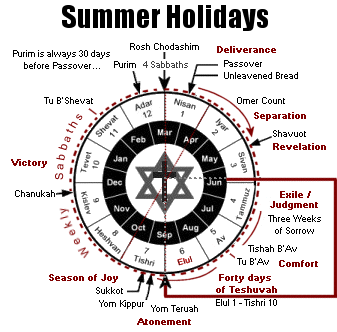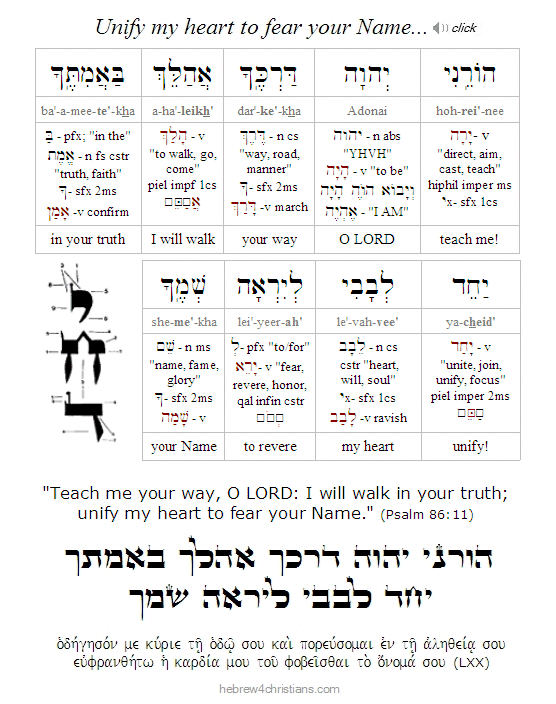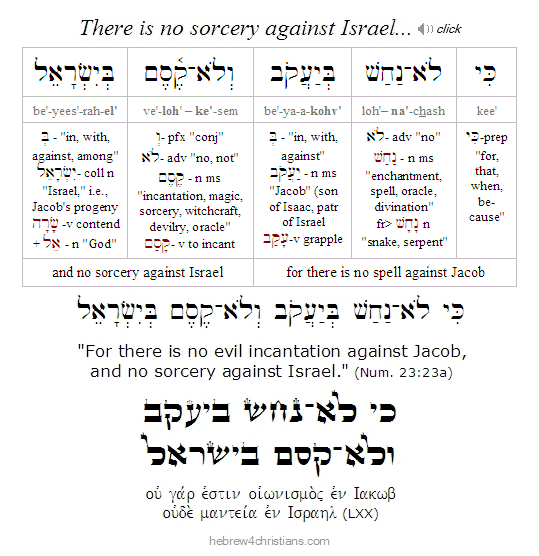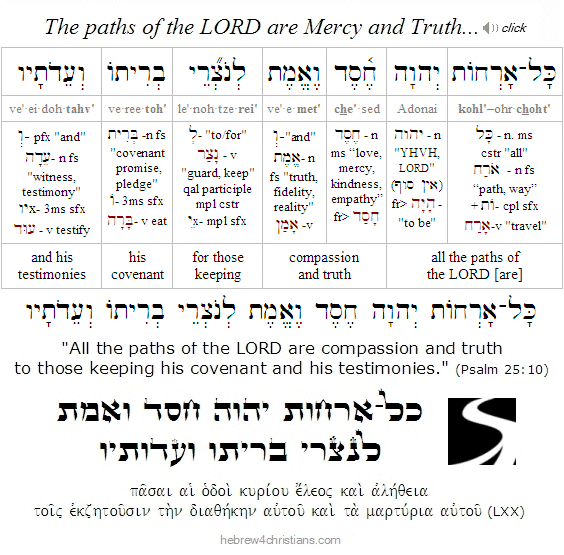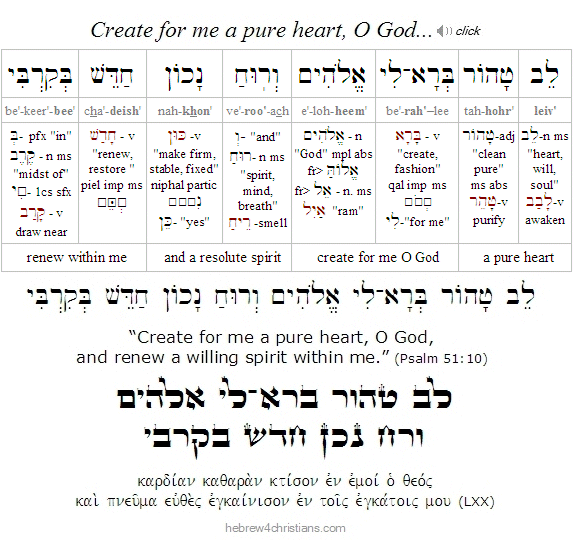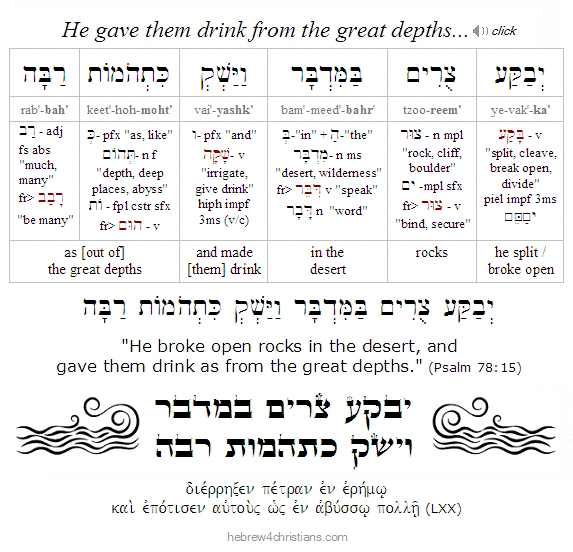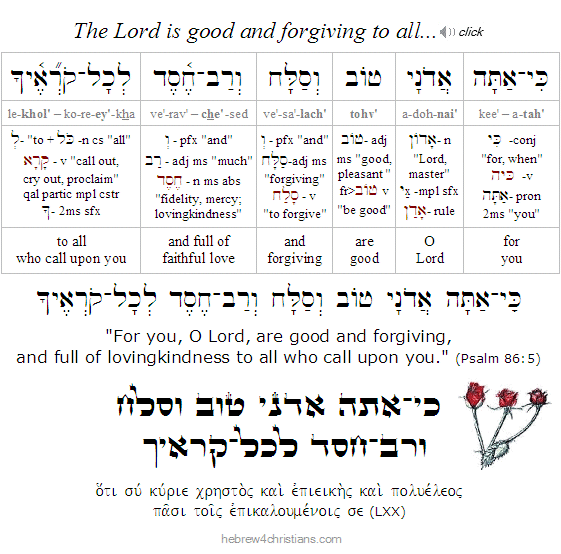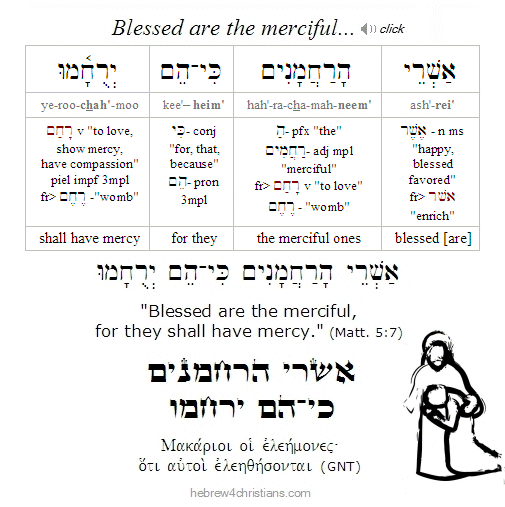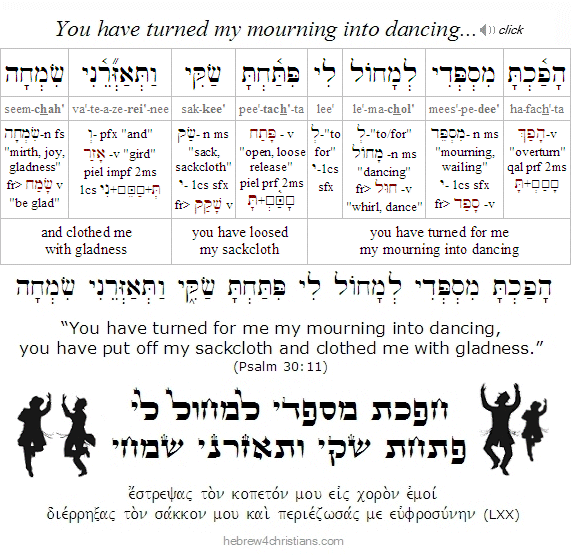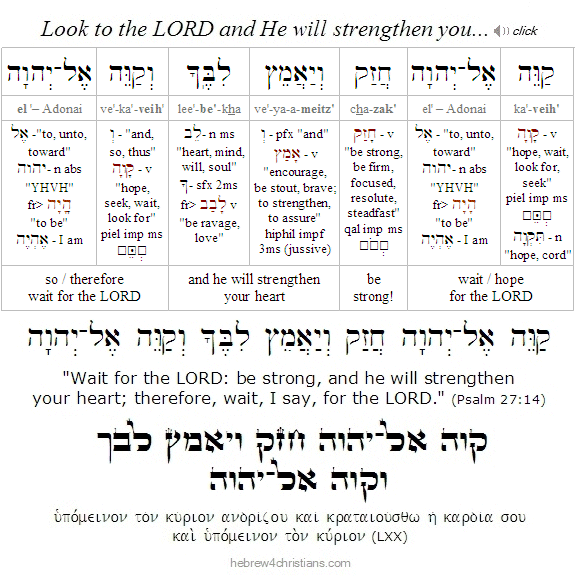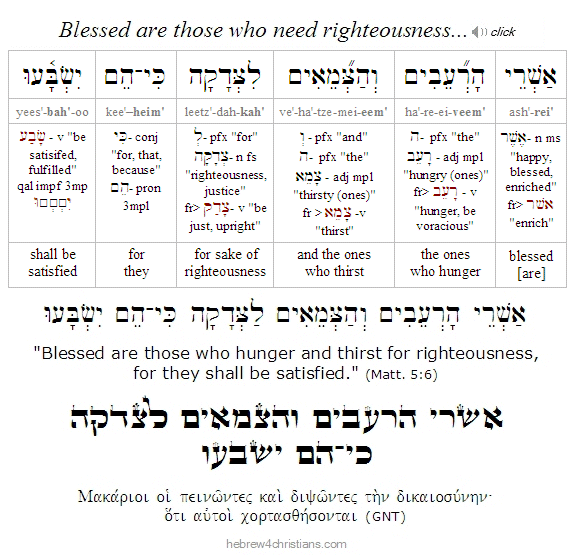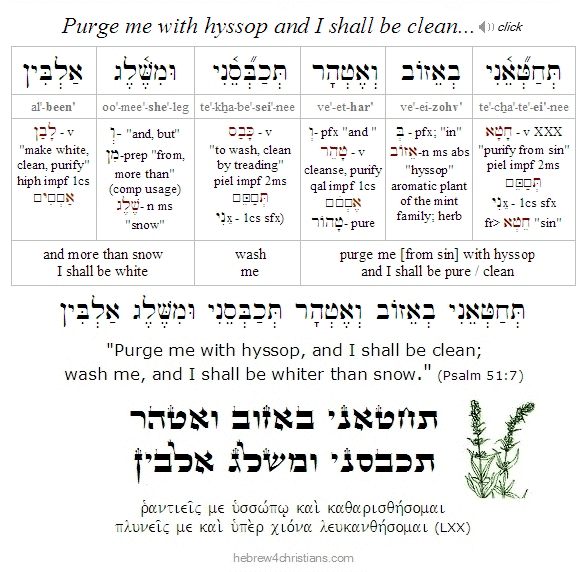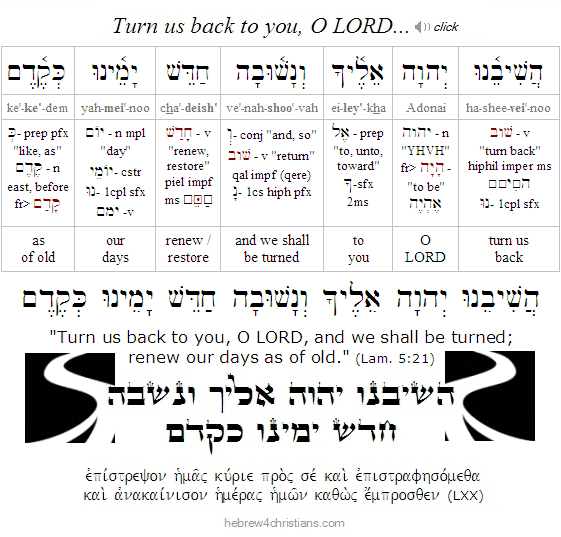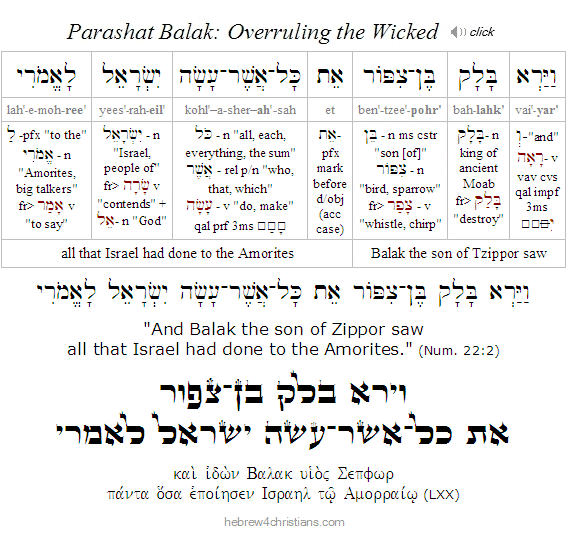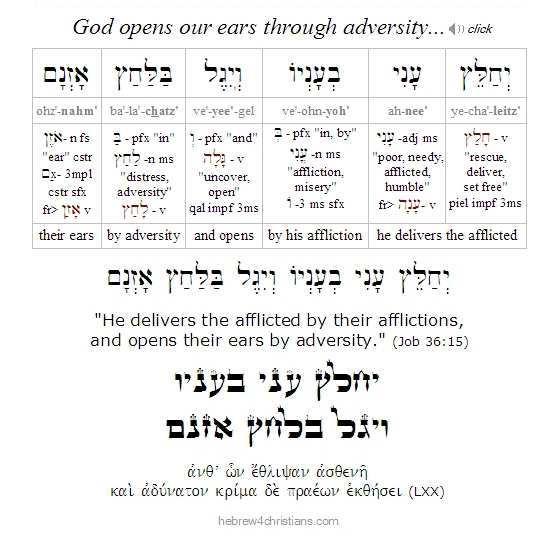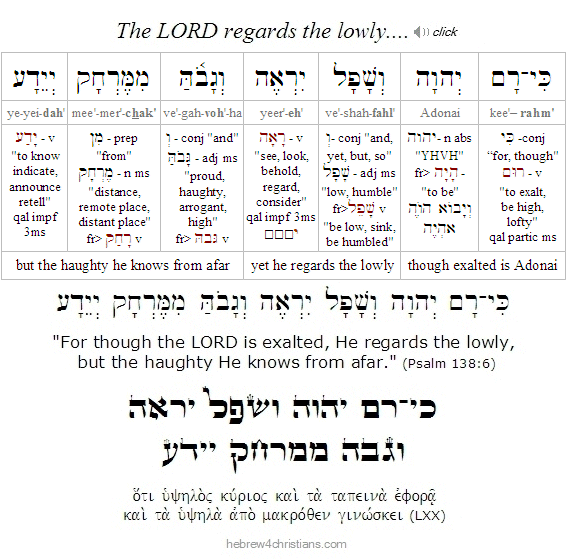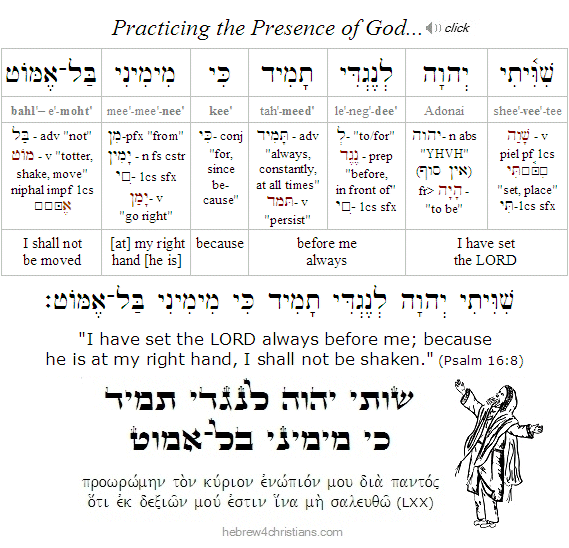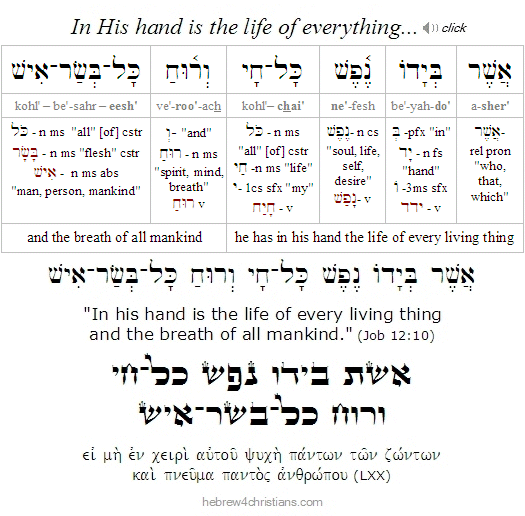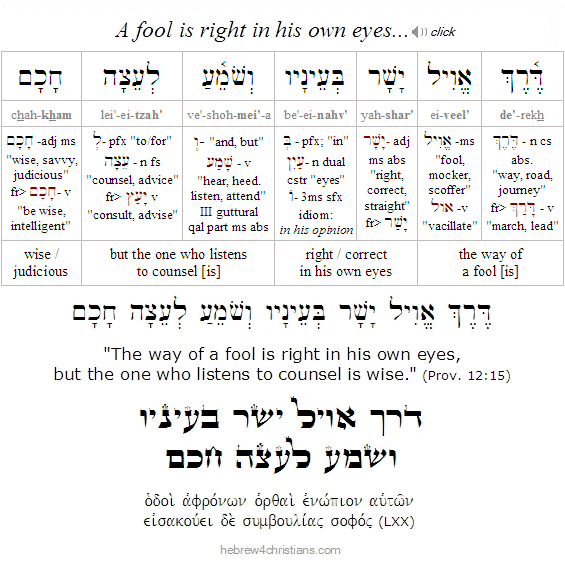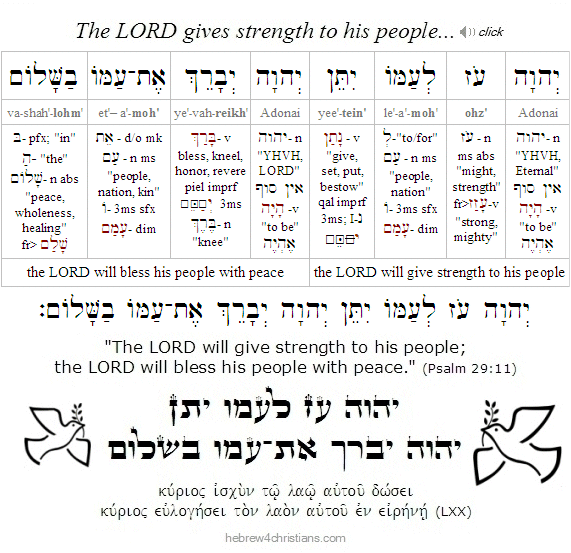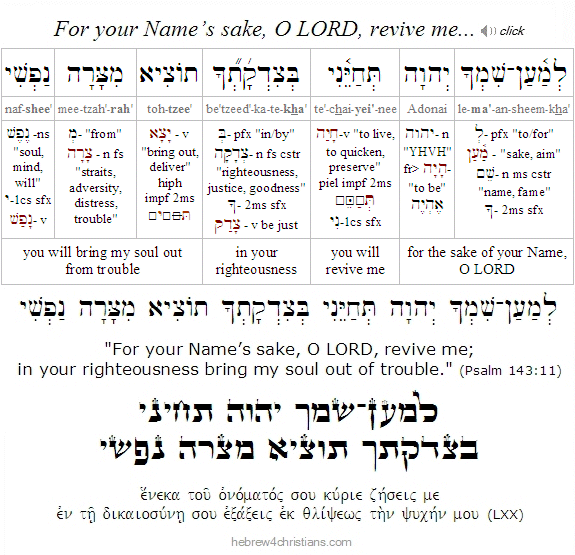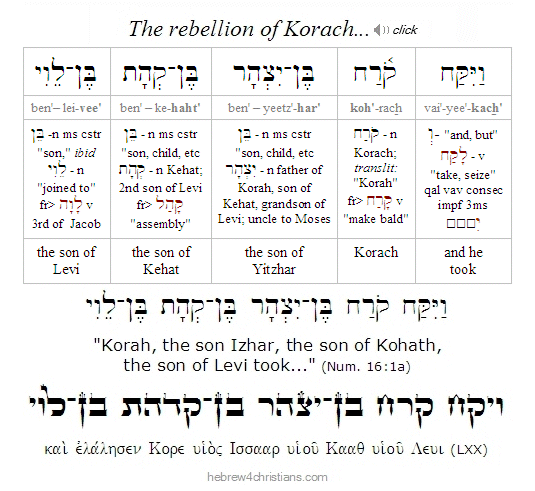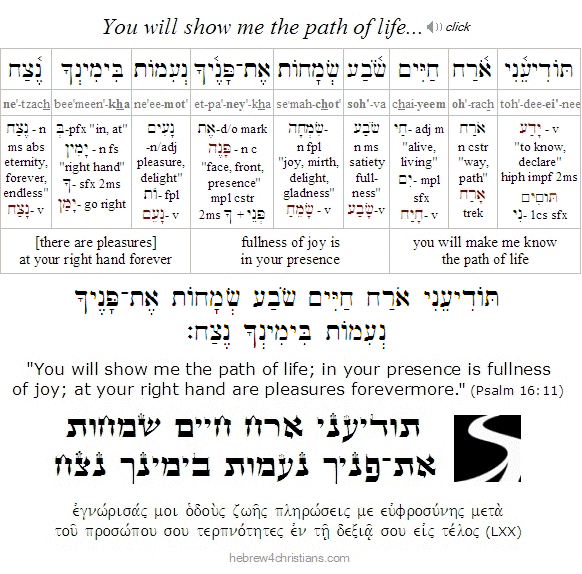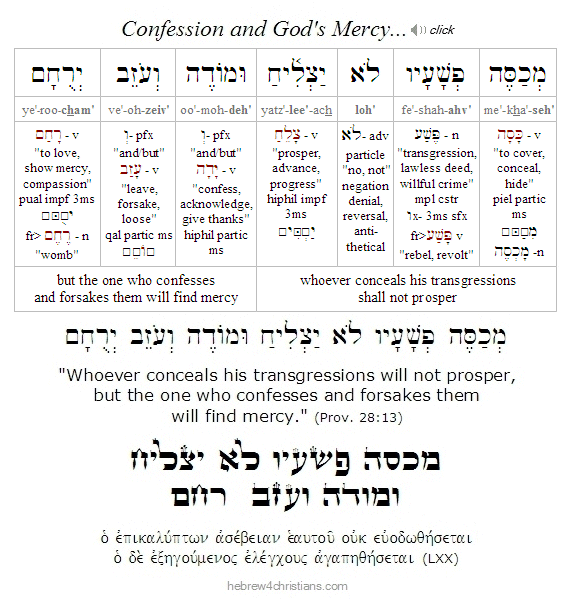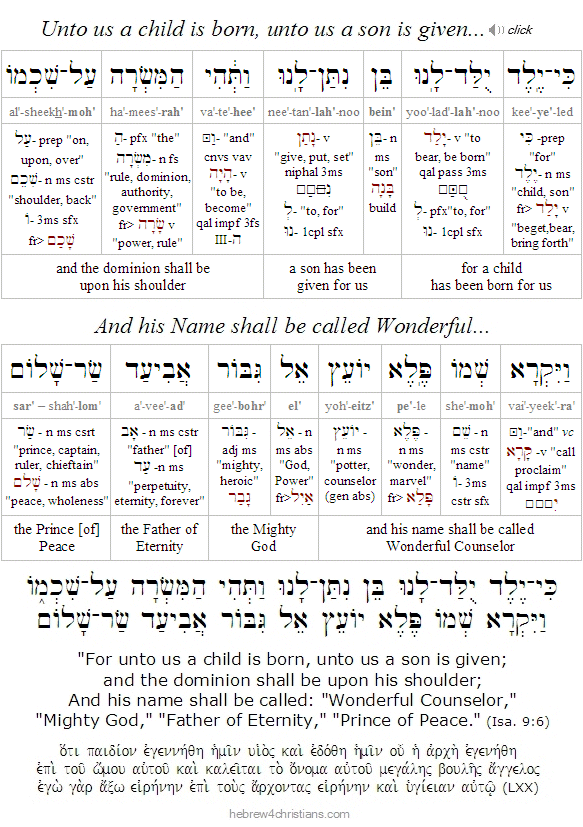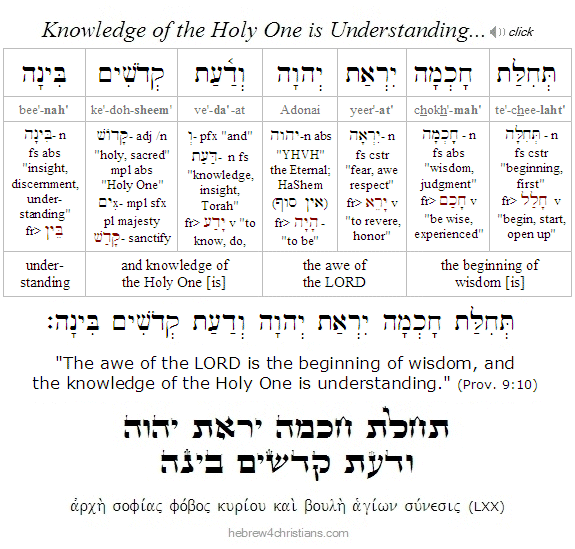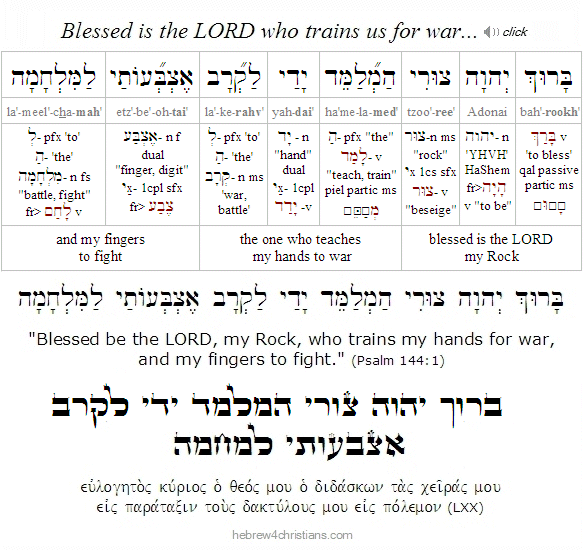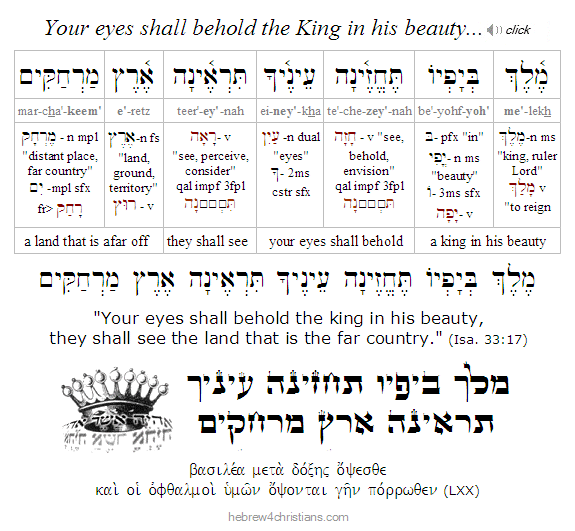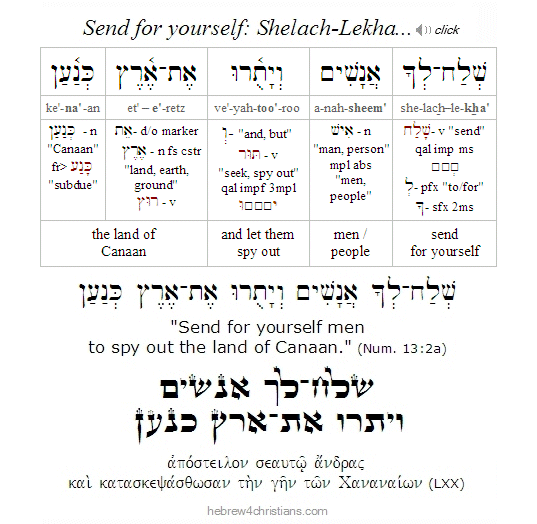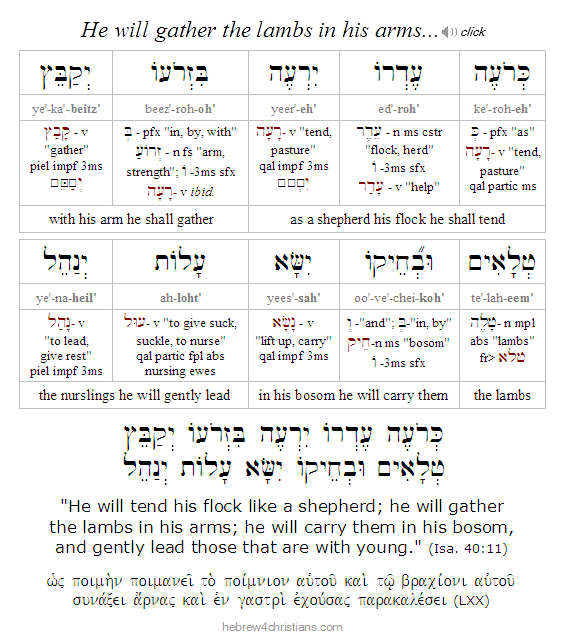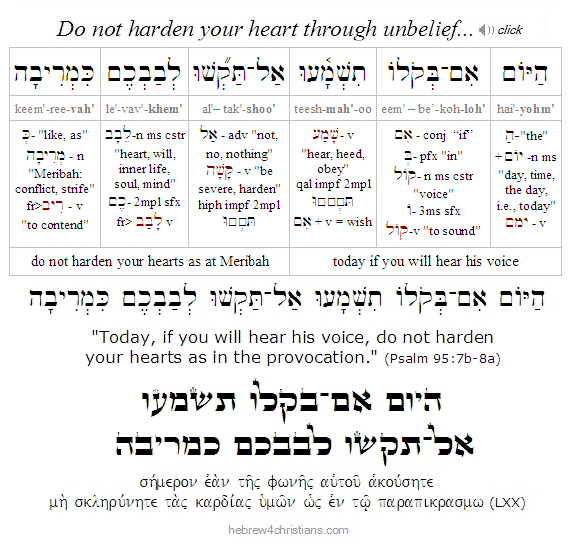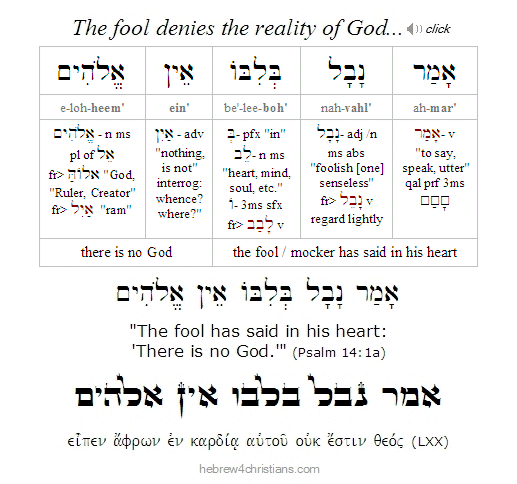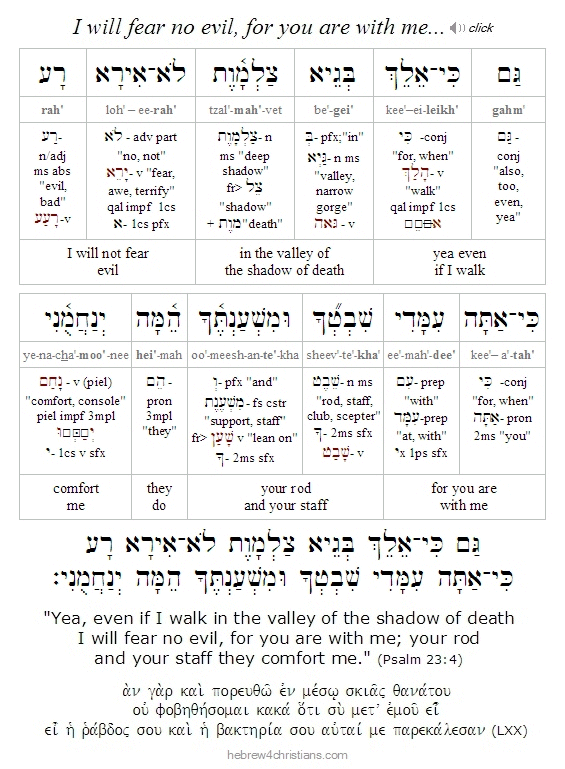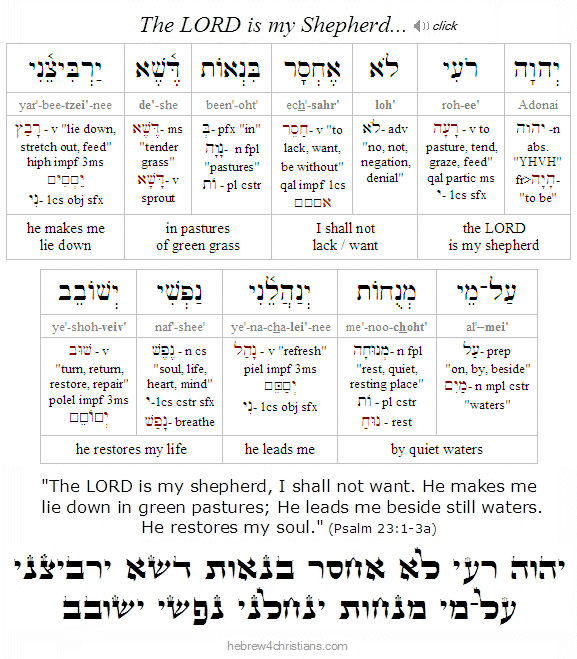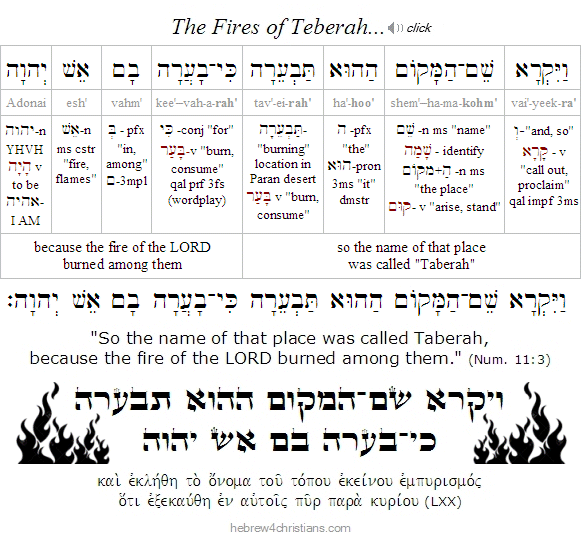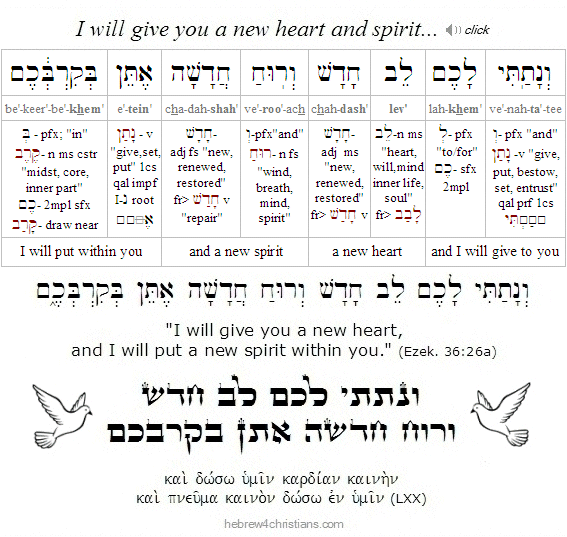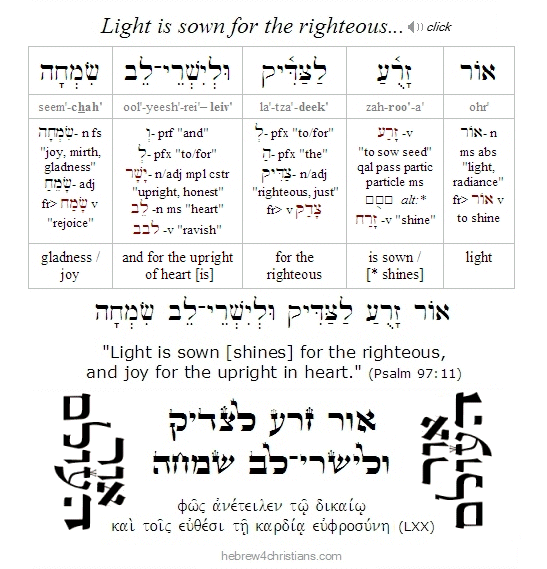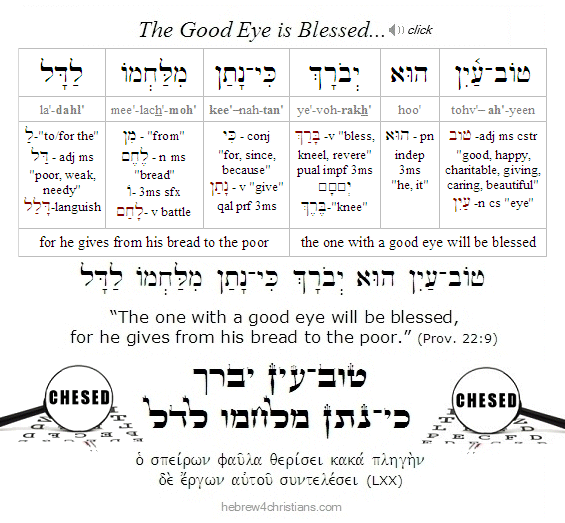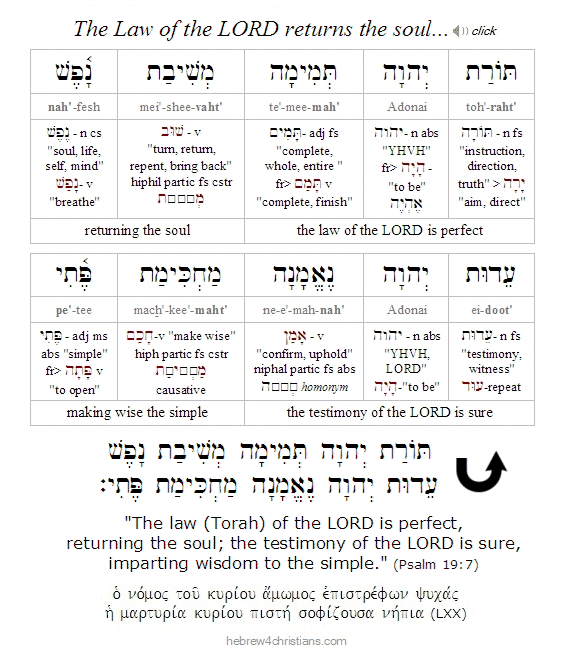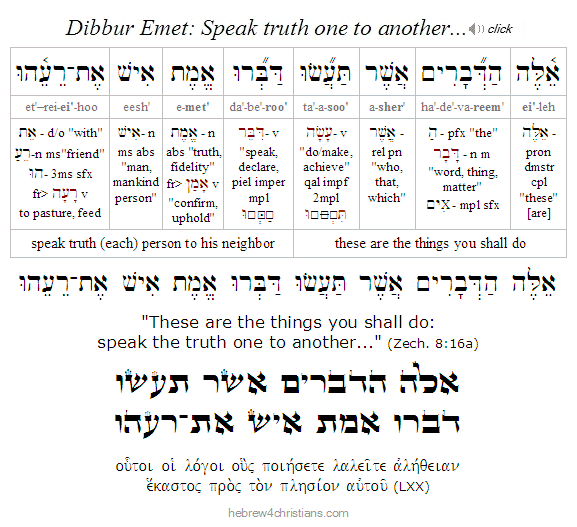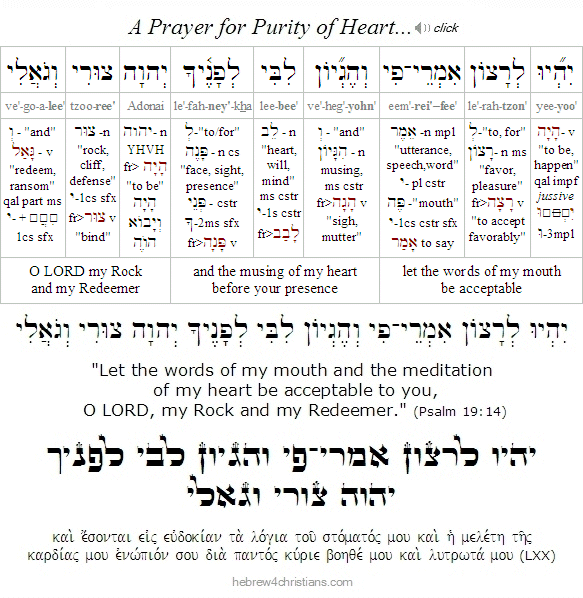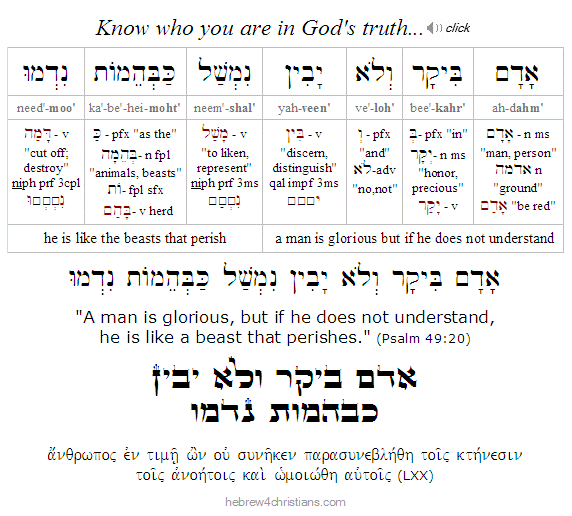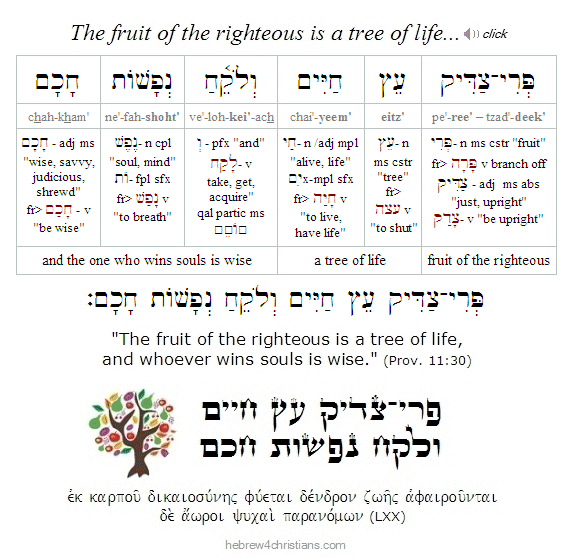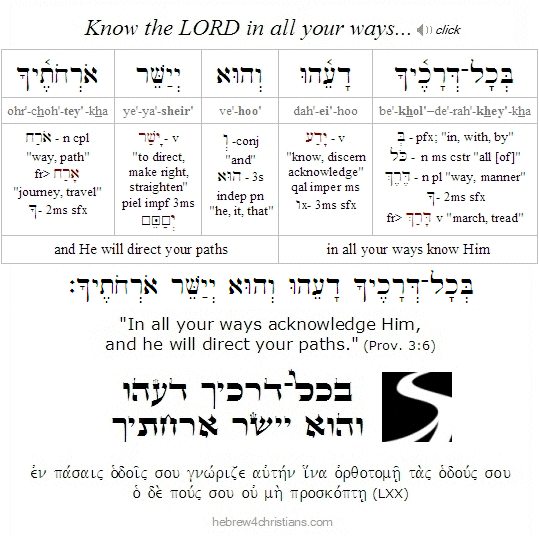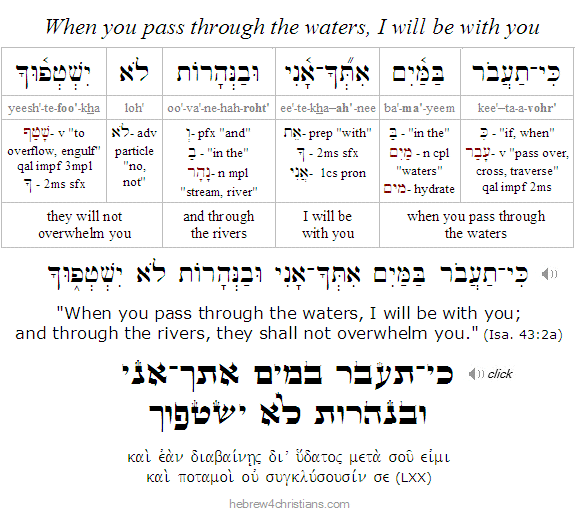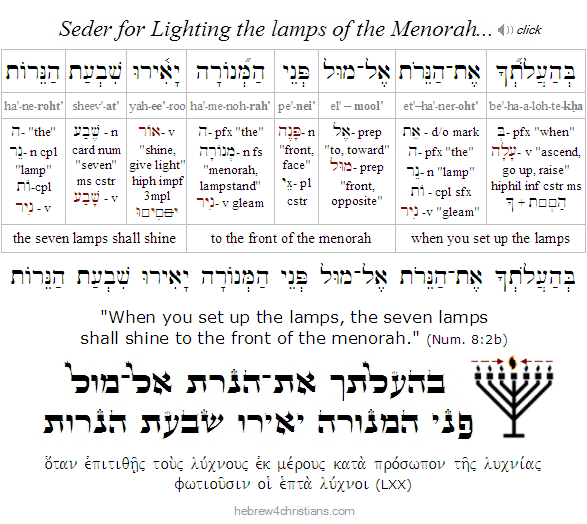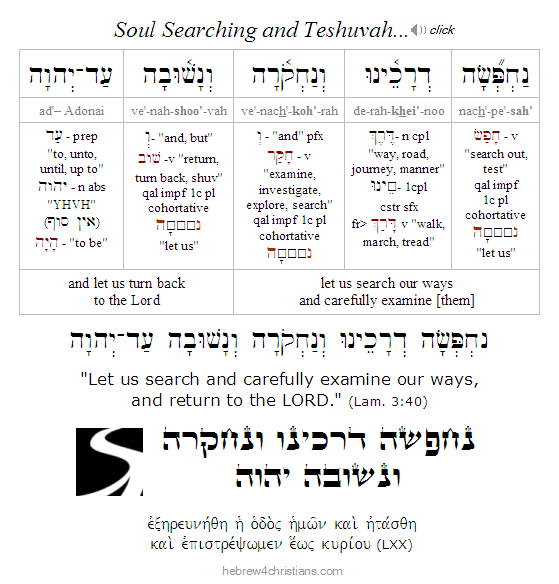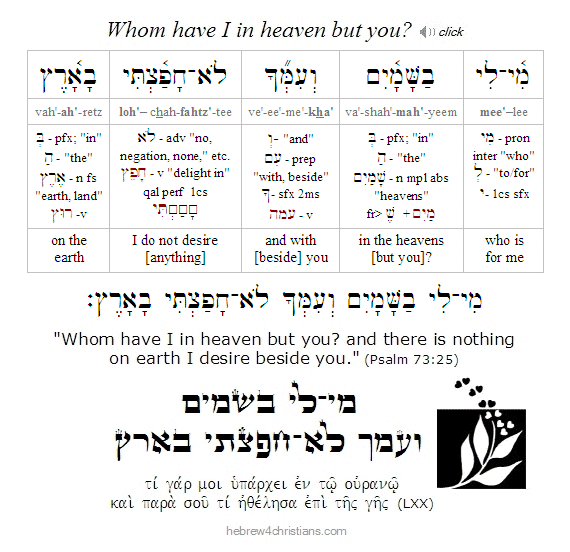|
Jewish Holiday Calendar
For June 2023 site updates, please scroll past this entry....
In the summer there occurs a three week period of mourning that begins with the Fast of Tammuz and ends with Tishah B'Av. The last nine days of this three week period (i.e., from Av 1 until Av 9th) are days of increased mourning. However, after this somber time, the romantic holiday of Tu B'Av, the 15th of Av occurs. Summer ends with the 30 days of the month of Elul, a yearly season of teshuvah (repentance) that anticipates Rosh Hashanah and the fall holidays. The 30 days of Elul are combined with the first 10 days of the month of Tishri to create the "Forty Days of Teshuvah" that culminate with Yom Kippur.
Because they occur between the spring and fall holidays, the summer holidays help us prepare for the second coming of the Messiah:
The Summer Holidays:

Note that in accordance with tradition, holiday dates begin at sundown. Moreover, some holidays may be postponed one day if they happen to fall on the weekly Sabbath:
- Month of Tammuz (Tues. June 18th [eve] - Tues. July 18th [day])
- Month of Av (Tues. July 18th [eve] - Wed. Aug. 16th [day])
- Month of Elul (Wed. Aug. 16th [eve] - Fri. Sept. 15th [day])
Note: For more about the dates of these holidays see the Calendar pages....
June 2023 Updates
Note: Please refresh the page (or press F5) to see the latest updates...
Finding Purity of Heart...
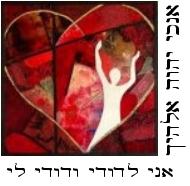
06.30.23 (Tammuz 11, 5783) "Who shall ascend to the hill of the LORD? or who shall stand in his holy place? The one who has clean hands and a pure heart, who does not lift up his soul to vanity (לא־נָשָׂא לַשָּׁוְא) and who does not swear deceitfully" (Psalm 24:3-4).
Yeshua expounded: "Blessed are the pure in heart, for they shall see God'" (Matt. 5:8). The Greek word translated "pure" is katharos (καθαρός), sometimes used describe the cleansing of a wound (catharsis), or to describe the unalloyed quality of a substance revealed through refining fire (the corresponding Hebrew word for the "pure of heart" (בַּר־לֵבָב), used in Psalm 24:4, comes from a root (בָּרַר) that likewise means to purify by fire). Metaphorically, then, purity of heart refers to separation from the profane - singleness of vision, wholeheartedness, passion, and focused desire for the sacred. As the Beatitudes reveal (Matt. 5:3-8), only those who are impoverished in spirit, who mourn over themselves and hunger for God's mercy, are refined by their struggle to see God (the Greek text implies these will see God now – with inward vision – and in the world to come). Because the pure in heart use ayin tovah, the good eye, they walk "in the light, as He is in the light" (Matt. 6:22).
When we are undivided in heart, the Spirit imparts to us a hidden wisdom (1 Cor. 2:6-7) and we are able to discern hidden realities that others do not see (1 Cor. 2:14). As we center our affections on Yeshua, we become unified, made whole, and healed of our inner conflicts. We see the Lord both in this world, through his effects, and then panim el panim (פָּנִים אֶל־פָּנִים), "face to face," in the world to come. Our hope purifies us for the coming day of full disclosure (1 John 3:2-3; Heb. 12:14).
Hebrew Lesson
Psalm 86:11 reading (click):
The heart is a miracle, an "engine" that distributes life, and the heartbeat is a great mystery, inexplicably pulsing with energy, contracting the muscles, pumping blood.. The pulse of the heart, then, is the "center of the center" of a person's physical life... If we are impure of heart, we will be inwardly divided, unfocused, fragmented, filled with destabilizing anxiety, envy, anger, and so on. More tragically, because we seek to escape ourselves, we will be devoid of a true center, without a focal point or abiding purpose, and therefore we will be lost to ourselves, wandering and without rest....
Learning from Balaam...

06.30.23 (Tammuz 11, 5783) In our Torah portion for this week (i.e., Balak), we read how Balaam intended to curse the Israelites, but God "took hold of his tongue" and made him bless the people instead... It is encouraging to realize that despite all of the repeated failures of the Israelites in the desert, the LORD never let go of his people... Indeed, as the story of Balaam reveals, if a spiritual enemy should secretly arise to curse Israel, God would take the sorcerer "by the tongue" to evoke God's blessing instead (Deut. 23:4-5). As Balaam himself later confessed: "there is no sorcery (i.e., nachash: נחש) against Jacob; there is no divination (i.e, kesem: קסם) against Israel" (Num. 23:23).
Unlike scheming Balaam, who was willing to say whatever people wanted to gain temporal reward, God is "not a man that he should lie, nor a son of man, that he should change his mind" (Num. 23:19, 1 Sam. 15:29). Whatever the LORD has promised he will invincibly perform: His word is full of integrity and truth: "The grass withers, the flower fades, but the word of our God will stand forever" (Isa. 40:8). Amen. The God of Israel is forever faithful in his love, and no one can overrule his desire (Num. 23:20; Rom. 11:29; Isa. 40:13).
You can trust in your promised future, friend. As it is written: "No weapon fashioned against you shall succeed, and you shall refute every tongue that rises against you in judgment. This is the heritage of the servants of the LORD (זאת נחלת עבדי יהוה) and their vindication from me, declares the LORD" (Isa. 54:17). "For I know the thoughts that I think toward you, says the LORD, thoughts of peace and not of evil, to give you a future and a hope" (Jer. 29:11).
Hebrew Lesson
Numers 23:23a reading (click):
The Enigma of Balaam...
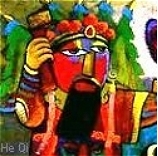
06.30.23 (Tammuz 11, 5783) In our (second) Torah reading for this week (i.e., parashat Balak), we are introduced to a strange character named "Balaam" (בִּלְעָם), who was famously rebuked by a talking donkey, though in light of his supposed ability as a "seer" who could prophesy in the Name of the LORD (יהוה), we may wonder what to make of this man. Was Balaam, who was a Midianite, a true prophet or a mere puppet in the hands of God?
Jewish scholar Nehama Leibowitz (1906-1997) notes two essential differences between Balaam (who was a Gentile) and the Hebrew prophets of Israel. First, Balaam sought "special visitations and visions," building altars and performing rituals to "force" the prophetic spirit. The Hebrew prophets, on the other hand, never engaged in these sorts of activities to hear from the LORD, and many were reluctant messengers, convinced of their own unworthiness and nothingness. Second, the Hebrew prophets cautiously spoke in the name of the LORD ("thus saith the LORD...") to authenticate their message, but Balaam took credit for his visions, flamboyantly regarding himself as a "great seer" with special powers. Based on Joshua 13:22 (which describes him as a sorcerer), it is likely that Balaam was given a temporary gift of prophecy, perhaps like the "witch of Endor" was allowed to temporarily communicate with the dead (1 Sam. 28:7-20). In other words, God raised up Balaam to demonstrate his authority over the powers of darkness and to reassure Israel of God's ongoing protection of his people.... Ein od milvado.
In the New Testament, Balaam is described as one who sought to corrupt others for his own personal gain. The Apostle Peter does not call him the "son of Beor" but "son of Bosor" (τοῦ Βοσόρ), apparently a play on the Hebrew word basar (בָּשָׂר), meaning "flesh," implying that he was a "son of carnality" who enticed of Israel to sin at Baal Pe'or (see 2 Pet. 2:15; Num. 31:16). Peter further described him as a spiritual hireling who loved the "wages of unrighteousness" (μισθὸν ἀδικίας ἠγάπησεν), and who (like the Sophists of ancient Greece) was willing to sell his spiritual "services" without regard for the truth (Num. 22:7, Deut. 23:4-5). Balaam so loved the prospect of reward and the flattery of men that he justified his venture into darkness. "An evil eye, a haughty spirit, and a lusting soul - these are signs of disciples of the wicked Balaam" (Avot 5:22).
The Hebrew word melekh (מֶלֶךְ) means "king" and shares the same letter value as the word lemech (לֶמֶךְ), a name that means "powerful," but can also mean "fool." The sages reasoned that since the letter Mem represents the brain (מוֹחַ) or thought (מַחֲשָׁבָה), and the letters Lamed-Kaf refers to the kidneys (כליות), a king is one who uses right thinking to rule the heart (מ-לך), but a fool reverses the order and makes thinking a servant of the passions and the lower nature... Therefore Balaam was properly regarded as a fool (Josh. 13:22).
Hebrew Lesson
Psalm 25:10 reading (click):
Note: For more on this topic, see the article: "The Way of Balaam."
The Hidden Kingdom...

06.29.23 (Tammuz 10, 5783) When the disciples asked Yeshua how they should pray, he began with the words: "Our Heavenly Father, sacred is your Name; may your kingdom come, may your will be done..." (Matt. 6:9-10). You might overlook it, but these words imply that God's kingdom is not naturally within us, and indeed, as Yeshua taught elsewhere, what is "naturally" within the heart is just the opposite: "For from within, out of the heart of a person, come evil reasonings (οἱ διαλογισμοὶ οἱ κακοι), adulteries, fornications, murders, thefts, covetousness, wickedness, deceit, lewdness, an evil eye, blasphemy, pride, foolishness. All these evil things come from within and defile a person" (Mark 7:21-23). So when Yeshua told the Pharisees that the kingdom of God is "within you," he meant that the kingdom is a matter of a heart that has been reborn by the Spirit - not that people are naturally endowed with a divine "spark" (i.e., nitzot: נִצוֹץ) within them. No, the default condition of the unregenerated heart is one of selfish autonomy that refuses to submit to God's right to reign (Rom. 8:7). Its creed is: "I am the master of my fate: I am the captain of my soul" (Henley). The natural man is a rebel against God; a usurper of the prerogatives of God, and therefore he "eats from the apple" to define "good" and "evil" in his own self-serving terms (Isa. 5:20-21).
The "default" condition of the soul is one of "spiritual death," a semblance of life that is "cut off" or alienated from the truth of God, and is therefore devoid of eternal life. As Yeshua told Nicodemus, "unless a person is born again (i.e., γεννηθῇ ἄνωθεν, "born from above"), they cannot see the kingdom of God" (John 3:3). The spiritual seed of the kingdom must be planted within the heart by the Spirit of God. "That which is born of the flesh is flesh, and that which is born of the Spirit is spirit. Do not marvel that I said to you, 'You must be born again.' The wind blows where it wishes, and you hear the sound of it, but cannot tell where it comes from and where it goes. So is everyone who is born of the Spirit" (John 3:6-8).
The miracle of new life comes through a supernatural conception, "from above" (ἄνωθεν), which means that we are entirely powerless in our natural state to impart life to ourselves. And that, of course, is the essential problem of human nature -- that despite our natural desire to be "godlike," we are monstrous in our estate, and therefore what we most need is "deliverance from ourselves," that is, salvation from the horrors of selfish existence.
The Scriptures declare that all our supposed acts of righteousness are "as filthy rags" before the LORD God (Isa. 64:6), so again, we need divine intervention, an "external healing" that comes from Yeshua alone, an entirely new existence that does not derive from "blood, nor the will of the flesh, nor of the will of man" (John 1:13). Only those who are reborn by God's Spirit are given "power to become the children of God" (John 1:12). Interestingly the Greek word translated "power" is eksousia (ἐξουσία), a compound word formed from the preposition ek- (ἐκ), meaning "out of," and the noun ousia (ουσία), meaning "being," thereby suggesting something ontologically different than "natural" reality. Indeed, the word points to the indestructible life of the resurrection of the Lord himself.
From our point of view, the agency of experiencing newness of life is a matter of the "mustard seed" of faith, a humble image that from something seemingly insignificant will come forth blessing and abundant life. This is how the kingdom of God grows - from the "bottom up," or from our brokenness and humility. Recall that when King David prayed, "Create in me a clean heart O God," he did not use the word "yatzar" (יָצַר), meaning to "form" or "shape" something into being, but he instead used the word "bara" (בָּרָא), the same word used to describe God's sovereign creation of the universe (Gen. 1:1; Psalm 51:10).
We may affirm "I can do all things through God who strengthens me," but we must understand what "all things" means... We can love the unlovely; we can bless those who curse us; we can suffer more than we know; we can endure in our desperation; we can thank God despite our afflictions, and we can do all these things because we have been crucified with Messiah, and that the life we now live is grounded in our relationship with the indwelling Spirit of God. Paradoxically, the Christian life is a dying life, and our union with the death of Yeshua is also the gateway to the power of the resurrection life. We gain ourselves when we lose ourselves: "Not I, but Christ lives in me." By faith we are "incorporated" into Messiah: the 'old man' (i.e., unregenrated nature) has been crucified with him, and the 'new man' (i.e., regenerated nature) is created to know him as the central reason and dialog of life.
The kingdom of God is "within you" when God the true King lives within your heart, though this is hidden from the "eyes of the flesh," that is, from the pretenses of the natural man (1 Cor. 2:14). Consider the focus of our Lord. Yeshua did not esteem the things man regards as important; he was detached from the dramas and affairs of the political world. He pointed to flowers, birds, seeds, yeast in dough, fish, and other simple matters to illustrate the principles of the kingdom of God. Moreover his disciples were "nobodies" in the world; the people he healed were outcasts, strangers, unknown... And even our Lord himself was disguised in poverty and insignificance: "He sprouted up like a twig before God, like a root out of parched soil; he had no stately form or majesty that might catch our attention, no special appearance that we should desire him" (Isa. 53:2). God Almighty emptied himself of heavenly glory to become "baby Jesus" for us; he was born in a manger, in poverty and obscurity.
The "mustard seed" of faith... the hidden miracle of life that grows by God's power into a place of refuge and grace. It may seem like a slow or even tedious process, but the fruit of the Spirit is produced according to his will: "like a tree planted by the rivers of water that brings forth its fruit in its season" (Psalm 1:3). The process of spiritual growth is ultimately mysterious and divine: "The Kingdom of God is like someone who spreads seed on the ground. He goes to sleep and gets up, night and day, and the seed sprouts and grows, though he does not know how. By itself (αὐτομάτη, "automatically") the soil produces a crop, first the stalk, then the head, then the full grain in the head. And when the grain is ripe, he comes in with his sickle because the harvest has come" (Mark 4:26-29).
In light of all of this, be patient and continue to trust that the Lord to do the impossible within your heart (Matt. 19:26). "For I am sure of this very thing, that the one who began a good work in you will perfect it until the day of Yeshua the Messiah" (Phil. 1:6). "He will strengthen you to the end, so that you will be blameless on that day" (1 Cor. 1:8). "Now to Him who is able to keep you from stumbling, and to present you faultless before the presence of His glory with exceeding joy, to God our Savior, Who alone is wise, be glory and majesty, Dominion and power, Both now and forever" (Jude 1:24-25). Amen.
Hebrew Lesson
Psalm 51:10 reading (click):
The Foundation of Torah...

[ The following concerns the foundations of the Torah (yesodei haTorah) and parashat Chukat... ]
06.29.23 (Tammuz 10, 5783) The commandments of God are usually divided between the rational laws (i.e., mishpatim) and the divine decrees (i.e., chukkim), though this distinction is somewhat artificial, since all of the commandments of Torah (and that includes the Torah of the New Covenant) are grounded in the mystery of God's will, which is to say that we are to obey them simply because they derive from the Divine Authority itself...
When the people gathered before Moses to receive the covenant at Mount Sinai, they said: "All the LORD has spoken we will do and we will hear" (na'aseh ve'nishmah: נַעֲשֶׂה וְנִשְׁמָע). Note the order: first comes faith in God expressed in the decision to act (na'aseh), and then comes understanding (ve'nishmah). As Yeshua said, "If anyone's will is to do God's will, he will understand" (John 7:17). The heart of faith is willing to do what God asks before hearing (or understanding) what is required. Many people operate the other way round, sitting in judgment of God's word, demanding to understand why they should obey.
You cannot understand apart from faith, however, and that is categorically true of all forms of knowledge, which is usually defined as "justified true belief." We are to be "doers of the word and not hearers only, deceiving ourselves" (James 1:22). The Greek verb used in this verse is emphatic: "Be doers!" (γίνεσθε) means "be born!" "Come alive!" "Do, live, and exist before God!" This is a call to creative action, to newness of life...
Hebrew Lesson
Exodus 24:7b reading (click):
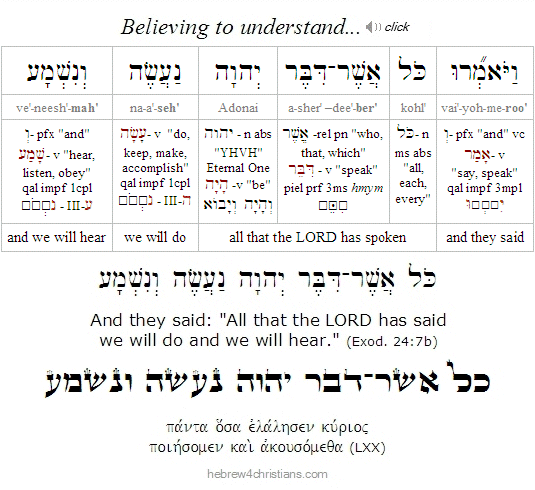 |
The Scriptures state that "if anyone is a hearer of the word and not a doer, he is like a man who looks intently at his natural face in a mirror. For he looks at himself and goes away and at once forgets what he was like" (James 1:23-24). If we just hear the truth but do not act upon it, we are comically likened to someone who looks his face over in a mirror but then promptly forgets what he looks like after he steps away... Likewise those who only hear the word but do not "bring it to life" in their deeds forget who they are and why they were created (Eph. 2:10; Titus 2:14; Col. 1:10). When we look into the mirror of truth we see our need for teshuvah and turn to God for the healing miracle he provides (Heb. 4:12).
It's not about doing but being, though being is revealed in doing... If your actions do not align with your values, then back up and recover who you really are in Messiah, understand what your new nature truly is. That is what it means to "take up the yoke" of Messiah, for his yoke is easy (kal) and burden is light, and the task is to repeatedly practice allowing Him to carry your pain, shame, and sin far, far away from your heart.
There is a deeper law, however, a "mirror" that reveals something beyond our passing image. When we look intently into the "perfect law of liberty" (תּוֹרַת הַחֵרוּת וּמַחֲזִיק) - the law of faith, hope, and love for our Savior - we find blessing in our deeds (James 1:25). Note that the verb translated "look into" the law of liberty is the same used when John stooped down to "look inside" the empty tomb of Yeshua (John 20:5). The deeper law reveals the resurrection power of God's invincible love. The Torah of the New Covenant also has many mitzvot, though these are based on the love God gives to us in Yeshua: "This is my Torah: that you love one another as I have loved you" (John 13:34).
Related Podcast:
The Sin of Moses...

[ "All of them ate the same spiritual food, and all of them drank the same spiritual water. For they drank from the spiritual rock that went with them, and that rock was Messiah." - 1 Cor. 10:3-4 ]
06.28.23 (Tammuz 9, 5783) Our first Torah portion for this week (i.e., parashat Chukat) includes the account of the sin of the great lawgiver of Israel: And God said, "Speak to the rock..." but Moses struck the rock twice with his staff" (Num. 20:8,11). This was Moses' transgression for which his punishment was exile from the Promised Land.
The punishment might seem severe, but God intended Moses' actions to be prophetic. When the people first demanded water at Rephidim, Moses was told to strike the rock with his staff (Exod. 17:6). The Hebrew word used to describe how Moses "struck" the rock is the same used to describe how Yeshua was "smitten by God" (Isa. 53:4). The Rock symbolized the Messiah, the One stricken for His people to give them waters of life (Isa 55:1; 1 Cor. 10:4). Moses' act of disobedience implied that rock needed to be stricken again to give life, instead of speaking to it as the "Living Rock."
In his frustration, Moses lost sight of the LORD by suggesting that he and Aaron were responsible for the miracle of the water ("listen, you rebels, shall we bring forth water for you?"[Num. 20:10]), and God could not leave those words unanswered before the people. That is why God told Moses that his exile from the land was the result of his sin not sanctifying (i.e., honoring) the LORD before the people of Israel (Num. 20:12).
Hebrew Lesson
Psalm 78:15 reading (click):
Note: The sages sometimes expressed dismay that Moses was bereft of seeing his dream come true by entering the Promised Land, but we know that there is a happy ending regarding that point (see Matt. 17:3).
Keep the Faith (לִשְׁמוֹר אֱמוּנִים)

[ "Salvation is free, but discipleship will cost you your life." - Dietrich Bonhoeffer ]
06.28.23 (Tammuz 9, 5783) When Israel believed the report of the faithless spies, Moses commented: "You were not willing to ascend (וְלא אֲבִיתֶם לַעֲלת), but became embittered (מָרָה) against the Word of the LORD your God" (Deut. 1:26). Moses' rebuke was not that the people were afraid to conquer the land as much as that they had lost heart and no longer desired to take hold of God's promise. The people gave up their dream; they forsook their hope; and they had lost the "devotion of their youth, their love as a bride, how they followed the LORD in the desert, into a land not sown" (Jer. 2:2). The people's failure was on two levels: First they lapsed in faith by abdicating trust in God's word, and second, they had lost the passion of their first love. In light of this, the sages say that the greater problem was that of losing heart, since the heart directs the will to believe in the miracle of God, or not...
Moses' rebuke of the people's heart condition recalls the sober warning Yeshua gave to the Ephesian believers: "I know your works, your toil and your patient endurance, and how you cannot bear with those who are evil, but have tested those who call themselves apostles and are not, and found them to be false. I know you are enduring patiently and bearing up for my name's sake, and you have not grown weary. But I have this against you, that you have abandoned the love you had at first. Remember therefore from where you have fallen; repent, and do the works you did at first. If not, I will come to you and remove your menorah from its place, unless you repent" (Rev. 2:2-5). Likewise the author of the Book of Hebrews commented: "And to whom did he swear that they would not enter his rest, but to those who were disobedient? And with whom was he provoked for forty years? Was it not with those who sinned, whose bodies fell in the desert? So we see that they were unable to enter because of unbelief" (Heb. 3:17-19). The question of our faith is essential: "It is a fearful thing to fall into the hands of the living God" (Heb. 10:31).
Hebrew Lesson
Psalm 119:10 Hebrew reading:
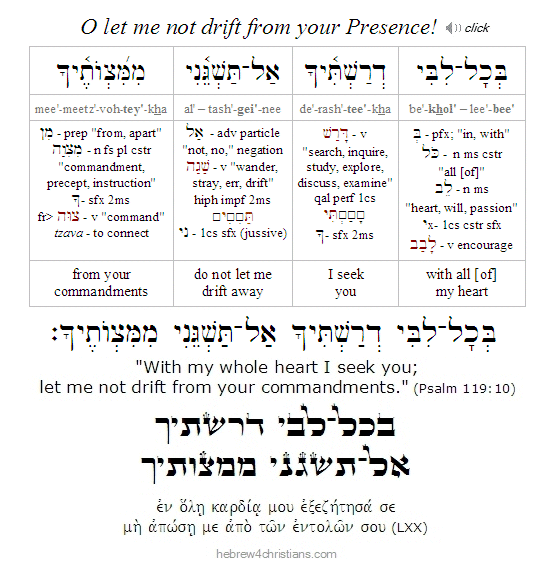 |
Mirrors of Forgiveness...
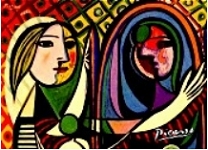
[ "Therefore, from now on, we regard no one according to the flesh... If anyone is in Messiah, he is a new creation; old things have passed away; behold, all things have become new." ]
06.27.23 (Tammuz 8, 5783) It's tragic that many want to retaliate against those who have hurt them, clinging to their wounded pride and allowing bitterness to take root in their hearts. Holding grudges, harboring spite, and seething in anger are common and deadly sins.
Interestingly, the English word "resentment" literally means "feeling again," alluding to the reliving of an offense, real or imagined, that instills an unforgiving attitude of the heart and mind that refuses to let go... "Anger and resentment are like drinking poisoned waters -- and hoping the other person will die." The English word "forgiveness," on the other hand, means just the opposite. Forgiveness means "giving up" your hurt feelings and willingly letting go of the desire for retribution. Often you must repeatedly "for-give" your pain by finding a way to let it go. It is not to rationalize the pain or to deny the wound but to co-exist with it and transform it into a blessing...
Many wounded people live with "scar tissue" that surrounds their heart, making them feel numb and unwilling to open up and trust others. Their affections have become disordered and their ego rationalizes blaming others or seeking various forms of entitlement. "Turning off your heart" can mean suppressing any positive regard for others (empathy) while nurturing anger and self-righteousness, or it may mean withdrawing from others as a lifeless shell (both approaches vainly attempt to defend the heart from hurt). Although Yeshua always showed great compassion, especially to the wounded and broken in spirit (Isa. 42:3), He regularly condemned the "hardness of heart" ("sclero-cardia," σκληροκαρδία) of those who opposed his message of healing and love.
Yeshua warned that transgressions were inevitable - and he warned of great sorrow that would come to those through whom they come (Luke 17:1) - but he did not fulminate against the deeds of the wicked as much as he focused on our need to forgive others when they sinned against us. Indeed, Yeshua considered our need to forgive to be one of the most crucial matters of life itself, a corollary of the gospel message itself.
Consider Peter's response to Yeshua's teaching about correcting a brother who sins against another (Matt. 18:15-20). When he asked how often he should forgive someone who had sinned against him, wondering if "seven times" was sufficient before he could justifiably "excommunicate" him (see Luke 17:3-4), Yeshua corrected him by saying, "not seven times, but seven times seventy times," in effect saying that forgiveness was an ongoing attitude of the heart, unlimited in its scope and application...
To illustrate what he meant, Yeshua likened the kingdom of heaven to the reign of a king who took account of his servants, discovering one who owed him an enormous sum of money. The debtor was unable to pay so the king then ordered him to be sold, along with his wife, children, and all of his possessions. The servant threw himself to the ground and begged the king for mercy, saying, "O Lord, have patience with me and I will repay you everything." The king, moved with compassion, then graciously forgave him his debt.
Some time later, however, the selfsame servant found a fellow servant who owed him some money and grabbed him by the throat, saying, "Pay me what you owe me!" In response his fellow servant threw himself to the ground and begged the man, saying, "O have patience with me and I will repay you everything." But the man refused the appeal and had him thrown in prison until he repaid the debt.
When the king's other servants understood what had been done, they were grieved and came before the king to tell him what had happened. The king then summoned the man and said, "O you wicked servant! I forgave you all that debt because you pleaded with me. Should you not also have had compassion on your fellow servant, just as I had pity on you?" The king then remanded him to the torturers until he should pay all that was due to him. Yeshua then concluded the parable by saying: "This is how my Heavenly Father will treat each of you unless you forgive your brother from the heart" (see Matt. 18:23-35).
Our Lord was warning us that if we do not forgive our brother "from the heart," that is, sincerely and without dissimulation, we will hold the fires of resentment within us and consign ourselves to grave suffering. This is the "middah keneged middah" principle, "like for like," and measure for measure: "as you do unto others, so will be done unto you." Therefore we see that forgiveness is not "recommended" for a godly life, it is absolutely essential. Forgiving "from the heart" relieves the inner pressure and pain induced by resentment, and the anger will dissipate. Your tension will be gone and you will feel lighter and set free. As it is written: "With the merciful you will show yourself merciful, with the upright you will show yourself upright; with the pure you show yourself pure" (Psalm 18:25-26).
It is important to understand that forgiveness is not an attempt to rationally understand or "explain away" sin; nor does it try to reduce (or "deconstruct") evil in "naturalistic" terms. No, forgiveness deals with spiritual reality, that is, behavior that violates God's moral truth and law, and therefore the doer of moral evil is under divine judgment. God's forgiveness is costly and never cheap. It is a "severe mercy" that cost him the sacrifice of his son to release us from the debt we owe. And it is a gift, a sacrifice freely offered to repay what the sinful person owes. Forgiveness is therefore a conscious decision - an act of the will - that releases the sinful person from their guilt and lets go of any desire for revenge.
Because "we cannot give what we do not have," the ability to forgive comes from something outside of ourselves, namely, the miracle of God's life-giving grace accepted within the trusting heart. As we receive forgiveness from God, so we are obligated (and enabled) to practice forgiveness toward others. This is the "divine reciprocity," the "balance" of a heart that is in genuine communion with Him. How we respond to God is revealed by how we treat others. What we do affects God's heart, just as what God does affects our hearts.
Your forgiveness is your forgiveness: as you forgive, so you reveal your heart. What you do comes from what you are, not the other way around... We are first transformed by God's grace and then come works of love. We are able to judge others mercifully, with the "good eye," because we come to believe that we are beloved by God.
On the other hand, if we refuse to forgive others, we thereby subject ourselves to God's judgment. Our indignation inwardly appeals to God as Elohim (אלהים), the Judge, rather than as YHVH (יהוה), the merciful Savior. But appealing to God for retribution for another's sin is to fall under judgment ourselves (see Rom. 2:1-3). Hardening our heart locks us into a torture chamber of our own choosing. "This is how my Heavenly Father will treat each of you unless you forgive your brother from the heart" (Matt. 18:35). Refusing to be merciful to others is self-destructive and deeply painful. "Hurt people hurt people," and bitterness invariably leads to desolation and hopelessness. "Despair has been called the unforgivable sin - not presumably because God refuses to forgive it, but because it despairs of the possibility of being forgiven" (Frederick Buechner).
Just as God graciously paid the price for our forgiveness, he expects us to pay the price of forgiving others as well. "The discretion of a man defers his anger; and it is his glory to pass over a transgression" (Prov. 19:11). In the parable mentioned above, Yeshua says the refusal to forgive your brother is wickedness: "O you wicked servant! I forgave you all that debt because you pleaded with me. Should you not also have had compassion on your fellow servant, just as I had pity on you?" (Matt. 18:32-33).
The consequences of retaining an unforgiving spirit are dreadful: the prison cell of resentment tortures the heart, extinguishes hope, and ultimately destroys the soul. "See to it that no one comes short of the grace of God, that no one be like a bitter root springing up and causing trouble, and through him many become defiled" (Heb. 12:15).
Deliverance from bitterness requires the miracle of God given in the gospel. What is at stake is the very salvation of your soul. If you find yourself unable to forgive, revisit the cross of Yeshua and behold how he bore your sin and paid for your freedom through his utmost agony and suffering. When we truly receive the miracle of grace it will show up in our interpersonal relationships (as well as in our relationship with ourselves).
Forgiveness is "easy" to those who have little to be forgiven, but the message of the cross is that we are in great need of healing, that our sinful heart is a disaster for us, and that we are desperately ashamed and in need of utmost reconciliation. In your struggle, ask the gracious Lord to increase your faith: "Lord, I believe: help my unbelief." Go to the cross, with your sin and your need before you, and pour out your heart in confession. Trust your Heavenly Father to fulfill his will in your life. The Lord is able and willing to give you a new heart and a new spirit according to his sure promise. Amen.
Hebrew Lesson
Psalm 86:5 reading (click):
Hebrew Lesson
Matthew 5:9 reading (click):
Beauty for Ashes....

[ The following is related to this week's Torah reading, parashat Chukat... ]
06.27.23 (Tammuz 8, 5783) The ashes of the red heifer represented the death and sacrifice of something extremely rare, valuable, and precious. The ashes were mixed with "living water" (מַיִם חַיִּים) to reveal the truth that though the end of all flesh is but dust and ashes, the Spirit gives cleansing and life.
Indeed the word ashes (אֵפֶר) may be rearranged to spell both cure (רַפֵא) and beauty (פְאֵר). The author of the book of Hebrews argues from the lesser to the greater: If the sprinkling of water mixed with the ashes of a red heifer purify the flesh from contamination with physical death, how much more does the blood of Messiah purify the soul from the deeds that cause spiritual death? (Heb. 9:13-14).
Amen, because of Yeshua's sacrifice we are given "beauty for ashes, the oil of joy for mourning, the garment of praise for the spirit of heaviness," that we may be called oaks of righteousness, the planting of the LORD, that He may be glorified (Isa. 61:3).
Hebrew Lesson
Psalm 30:11 reading (click):
Seeing beyond the Seen...

06.27.23 (Tammuz 8, 5783) Yeshua told us: "Blessed are those who have not seen and yet have believed" (John 20:29). Despite the struggle of this life - our sorrows, pains, and even death itself - we believe in God's love and promise for us, even if we do not presently see the fulfillment of our hope, just as Abraham believed the promise that he would be the father of an innumerable multitude long before he saw any sign of its fulfillment. Abraham "believed the impossible" and "hoped against hope" (παρ᾽ ἐλπίδα ἐπ᾽ ἐλπίδι), meaning that hope kindled within him even though there was nothing to see in the realm of the natural -- he believed in an unseen good; he trusted in the One who gives life to the dead and who "calls into existence the things that do not exist" (Rom. 4:17). The Scripture comments: "He did not weaken in faith when he considered his own body, which was as good as dead (since he was about a hundred years old), or when he considered the deadness of Sarah's womb. He did not stumble over the promise of God through unbelief but was strong in faith, and gave glory to God, fully persuaded that God was able to do what he had promised, and that is why his faith was counted to him as righteousness" (Rom. 4:19-22).
Likewise we are called to believe in an unseen good, an unimaginably wonderful destiny for our lives, as it says, "Things no eye has seen, nor ear heard, nor mind imagined, are the things God has prepared for those who love him" (1 Cor. 2:9). Faith does not use natural reason or the evidence of the senses to see the unseen, but it "believes to see" through "eyes of the heart" to know the hope of God's calling and to attain the blessing (Eph. 1:18). Faith in God's love comes from a different source and has a different means of apprehension than human wisdom, so that no matter how things might appear in this fallen world, the LORD God may be known and trusted to work all things for our ultimate good. "Blessed are those who have not seen and yet have believed." Amen.
"Faith is the assurance that the best and holiest dream is true after all." - Frederick Buechner
Hebrew Lesson:
Psalm 27:14 Hebrew Reading:
Personal note: I want to thank all of you who pray for me: I can't do ministry apart from your kindness and support. I sincerely thank God for you and ask Him to help you grow more and more in the grace and truth that is our Lord Yeshua. Shalom uvracha chaverim. - John
Blessed Hunger and Thirst...

06.27.23 (Tammuz 8, 5783) Our Lord Yeshua said: "Blessed are those who hunger and thirst for righteousness..." (Matt. 5:6). Yes, blessed are those who suffer such desperate need, who know inner emptiness, who are not made numb to the ache, and who cry from the heart for deliverance. Blessed are those who are in dread over themselves, who fall as one dead before the Divine Presence, who know they are undone, ruined, and dying for life... The great danger, spiritually speaking, is to become complacent, untouched by poverty of heart, to be lulled asleep, lost within a dream, made comatose, living-yet-dead. The gift of faith first reveals our own lostness and then imparts courage to live with ourselves despite ourselves as we seek God's healing and life... Let us press on, dear friends.
Hebrew Lesson:
Matthew 5:6 reading (click):
Cleansing from Death...
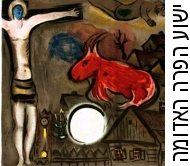
[ The following entry concerns this week's Torah reading, parashat Chukat, though the mysterious themes of purity and impurity are first described in parashat Tzav... ]
06.26.23 (Tammuz 7, 5783) Contact with the dead causes spiritual impurity (i.e., tumah) because death, as the separation from life, is the ultimate expression and consequence of sin. People routinely deny the meaning of death, explaining it away as the result of some cause from which one might escape ("he worked too hard," "she got sick," "it was an accident," etc.). People rationalize death because they refuse to see it as the effect of sin, the consequence of the original transgression of Adam and Eve that humanity as a whole has "inherited" (Gen. 2:17; 3:19; Rom. 5:12). Therefore the Torah states that the birth of a child results in impurity (Lev. 12:2,7). Full atonement comes from "digging up the root of sin" by being purified from its source, namely, the metaphysical curse of death itself. The Red Heifer alludes to the sin of the Golden Calf, which finds its source in the original idolatry of Adam and Eve. Even the blood of the sacrifice was burned to ash "outside the camp," putting a complete end to the "life of death" and its power to corrupt. The Red Heifer is therefore a special sort of "sin offering" (chatat) that cleanses from contact with death itself (Num. 19:9).
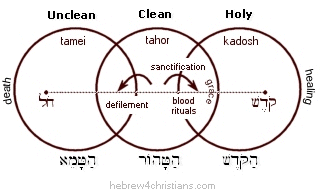 |
Note: The "fall" of man implies that we have contact with death - both inwardly and outwardly. The sacrifice of Yeshua as our "Red Heifer" cleanses us from all tumah and lovingly makes us clean (tahor) before the Father. The "water and the blood" is part of the "olah sacrifice" of Yeshua for our redemption and purification before God offered at Calvary (John 19:34, 1 John 5:6). The water and blood flowing from His wounds are the means by which we are purified from sin and death... All this comes from the love (chesed) of God given in our Messiah and Savior. Just as the sacrifice of the Red Heifer cleansed from the effects of physical death, so the sacrifice of Yeshua cleanses us from the effects of spiritual death. For more on this subject, see the "Gospel of the Red Cow."
Hebrew Lesson
Psalm 51:2 reading (click):
Paradox and Faith...

06.26.23 (Tammuz 7, 5783) Our Torah portion this week (i.e., Chukat) describes the sacrifice of parah adumah (פרה אדומה), or the "Red Heifer" (see Num. 19:1-10). The Red Heifer is considered paradoxical to most Jewish thinkers, since the one who offers this sacrifice becomes ritually impure, while the sprinkling of the ashes from it makes people clean... The ritual is considered chok (חק) within Jewish tradition, meaning that it makes no rational sense. The Talmud states that of all the 613 commandments given in the Torah, even King Solomon with all his wisdom could not fathom this decree. However, the sacrifice of Yeshua the Messiah can be understood as the fulfillment of the symbolism of the Red Heifer: Both were entirely rare and without defect (sin); both were sacrificed "outside the camp"; both made the one who offered the sacrifice unclean but made the one who was sprinkled by it clean; and finally, both sacrifices cleanse people for priestly service.
The Red Heifer had to be a perfect specimen (temimah) that was completely red, "without blemish, in which there is no defect (mum)." The rabbis interpreted "without blemish" as referring to the color, that is, without having so much as a single white or black hair. This is the only sacrifice in the Torah where the color of the animal is explicitly required. Moreover, the Red Heifer was never to have had a yoke upon it, meaning that it must never have been used for any profane purposes.
Unlike all other sacrifices offered at the altar, the red heifer was taken outside the camp and there slaughtered before the priest, who then took some of its blood and sprinkled it seven times before the Mishkan (thereby designating it as a purification offering). [During the Second Temple period, the High Priest performed this ceremony facing the Temple while atop the Mount of Olives.] Then the red heifer would be burned in its entirety: its hide, flesh, blood, and even dung were to be burned (unlike other Levitical korbanot). Do not miss this: unlike all other animal sacrifices, all the blood of the offering was to be burned in the fire.
Hyssop, scarlet yarn, and a cedar stick would then be thrown upon the burning Red Heifer (these same items were used to cleanse from tzara'at, skin disease). In other words, the blood was assimilated into the ashes of the sacrifice, which were then gathered and mixed with water to create the "water of separation" (mei niddah) for the Israelite community. Note that the word "separation" (niddah) refers to menstrual impurity and hearkens to Zech. 13:1: "On that day there shall be a fountain opened for the house of David and the inhabitants of Jerusalem, to cleanse them from sin and from niddah."
Anyone (or anything) that came into contact with a corpse (the embodiment of sin and death) was required to be purified from tumah by means of the mei niddah. The purification procedure took seven days, using stalks of hyssop dipped into the water and shaken over the ritually defiled person on the third day and then again on the seventh day. After the second sprinkling, the person undergoing the purification process would be immersed in a mikvah (pool of running water) and then be unclean until the following evening.
According to Jewish tradition, the red heifer sacrifice was to atone for the sin of the Golden Calf, though the Torah itself does not make this association. The LORD Yeshua, our High Priest of the New Covenant, is the perfect fulfillment of the Red Heifer, since he was completely without sin or defect (2 Cor 5:21; John 8:46); he was sacrificed outside the camp (Heb 13:13); he made himself sin for us (2 Cor 5:21); his sprinkling makes us clean (1 Pet 1:2; Heb 12:24; Rev 1:5); and the "water of separation" that his sacrifice created is the means by which we are made clean from the impurity of sin (Eph 5:25-6; Heb 10:22).
As mentioned above, Torah commandments (mitzvot) that defy reason are called "chok" (חק). The Jewish sages tend to focus on the Red Heifer as the "mother of all mystery mitzvas," but surely we must go back to the Akedah - that is, to the sacrifice of Isaac at the hand of his father Abraham - as the greatest of God's decrees that defy human reason. The willingness of both Abraham and Isaac to obey - despite their inability to understand - was a direct result of their unwavering faith in God's love and promises. Likewise the heart of our faith says simply: "Jesus saves." His sacrifice saves us from sin and death, yet this also is "chok" - a matter of faith... We may seek logical reasons or explanations, but ultimately it is a matter of divine mystery, just as the darkness covered the earth while the Savior suffered for us on the cross at Calvary (Mark 15:22). "Jesus saves" is the mystery of our confession (Rom. 10:9-10). We are cleansed by our contact with sin and death through him, just as he bears our sin and defilement on our behalf. as it is written: "God made the One who did not know sin to be sin for us, so that in him we would become the righteousness of God" (2 Cor. 5:21).
"But when Messiah appeared as a High Priest (כּהֵן גָּדוֹל) of the good things that have come, then through the greater and more perfect tent (not made with hands, that is, not of this creation) he alone entered once for all into the Holy Places, not by means of the blood of goats and calves but by means of his own blood, thus securing an eternal redemption (גְּאוּלַּת עוֹלָם). For if the blood of goats and bulls, and the sprinkling of defiled persons with the ashes of a heifer (אֵפֶר הַפָּרָה), sanctify for the purification of the flesh, how much more will the blood of Messiah (דַּם הַמָּשִׁיחַ), who through the eternal Spirit (בְּרוּחַ עוֹלָם) offered himself without blemish to God, purify our conscience from dead works to serve the living God (אֱלהִים חַיִּים)?" – Heb. 9:11-14
The Torah of the new covenant is inner, deeper, and eternal, whereas the Torah of the older covenant is outer, limited, and subject to obsolescence (Heb. 7:12; 8:13). The older covenant foretold of the coming Substance by means of the "ashes that purify the impure yet make the pure, impure." Only after we have been "sprinkled with the ashes" are we made clean from death; only when we make contact with the "ashes of Yeshua" offered on our behalf are we cleansed from sin and death (1 Pet. 1:2; Heb. 10:22).
Podcast:
Hebrew Lesson
Psalm 51:7 reading (click):
Fast of the Fourth Month...

06.25.23 (Tammuz 6, 5783) According to Jewish tradition Moses shattered the tablets on the 17th day of the 4th month, after he came down from Sinai and found the people worshipping the golden calf. Today, this tragic date is commemorated as a fast day (i.e., the "Fast of Tammuz"), which marks the beginning of a three week period of mourning that culminates on Tishah B'Av (i.e., the date when the people tragically believed the evil report of the spies and were sent into exile).
During this three week period of national mourning, the weekly readings from the prophets are all "Haftarahs of Rebuke" that warn the people about imminent judgment from heaven, and therefore the theme of most Jewish religious services is teshuvah (repentance). In addition, weddings or other joyous events are usually not held during this time of year. Indeed, among the very Orthodox, the last nine days of the three weeks are the most rigorous and solemn. Beginning on the first day of the month of Av, traditional mourning customs are practiced in anticipation of the most solemn fast day of Tishah B'Av, when the Book of Lamentations (Megillat Eichah) is plaintively recited during the evening service.
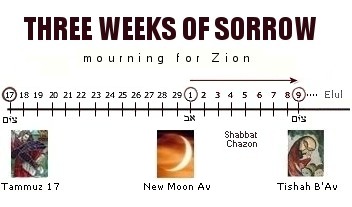 |
This year the Fast of Tammuz begins at dawn Thursday, July 6th and lasts until sunset. The Tishah B'Av fast therefore begins three weeks later at sundown on Wednesday, August 26th and ends after sunset on Thursday, August 27th.
Hebrew Lesson
Lamentations 5:21 reading (click):
Mystery of the Red Heifer...
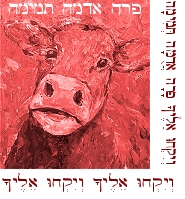
06.25.23 (Tammuz 6, 5783) Shavuah tov, friends. This week we have a "double portion" of Torah and will read both parashat Chukat and Balak... In the first portion (i.e., Chukat), the LORD gives the "law of the red heifer," a special whole-burnt offering whose ashes were used to purify someone contaminated by contact with a dead body. The red heifer had to be a perfect specimen that was completely red, "without blemish, in which there is no defect." The sages interpreted "without blemish" to refer to the cow's color, that is, it was to be without a single white or black hair. This is the only sacrifice in the Torah where the color of the animal is explicitly required. Moreover, the cow was never to have had a yoke upon it, meaning that it must never have been used for any profane purposes.
Unlike other sacrifices offered at the altar at the Tabernacle, the red heifer was taken outside the camp to be slaughtered before the priest, who then took some of its blood and sprinkled it seven times before the Tabernacle. Then the heifer would be burned in its entirety: its hide, flesh, blood, and even dung were to be burned (unlike other sacrifices). Also unlike other offerings, the blood of the sacrifice was to be completely burned in the fire.
Hyssop, scarlet yarn, and a cedar stick would then be thrown upon the burning heifer, which were the same items used to cleanse from tzara'at (skin disease). These items, along with the blood of the red heifer, were therefore assimilated into the ashes of the sacrifice, which were gathered and mixed with living water to create what was called the "waters of separation" for the community. Anyone that came into contact with death (i.e., a corpse) was required to be cleansed using these waters. The purification procedure took a full seven days, using three stalks of hyssop dipped into the water and shaken over the defiled person on the third day and then again on the seventh day. After the second sprinkling, the person was immersed in a mikvah and was declared "clean" the following evening.
The Red Heifer ritual is considered "chok" within the tradition, meaning that it defies rational sense. In fact, the Talmud states that of all the taryag mitzvot (613 commandments), this is the only one that wise King Solomon could not fathom. The mystery of the red heifer sacrifice suggests profound truth about the sacrificial death of Yeshua our Savior, however. The kohen (priest) who sprinkled the ashes of the red heifer became tamei (unclean) himself, even though the defiled person became tahor (pure). The picture of the priest here is one of sacrificial love - the giving up of one's own spiritual purity so that another person can regain his purity... "Sprinkle me with hyssop, and I will be clean" (Psalm 51:7). Just so, Yeshua willingly became unclean on our behalf - through our contact with sin and death - so that we could become clean (Isa. 53:4, 2 Cor. 5:21, Gal. 3:3, Eph. 5:2, Titus 2:14). Because of Yeshua, the impure become pure, even though He became impure through His offering. Because of Him, we have been cleansed from our sins "by a better sprinkling" than that which the Tabernacle of Moses could afford (Matt. 26:28, Heb. 9:14, 12:24, Eph. 1:7, 1 Pet. 1:2,18-19, Rom. 5:9; Col. 1:14, 1 John 1:7, etc.).
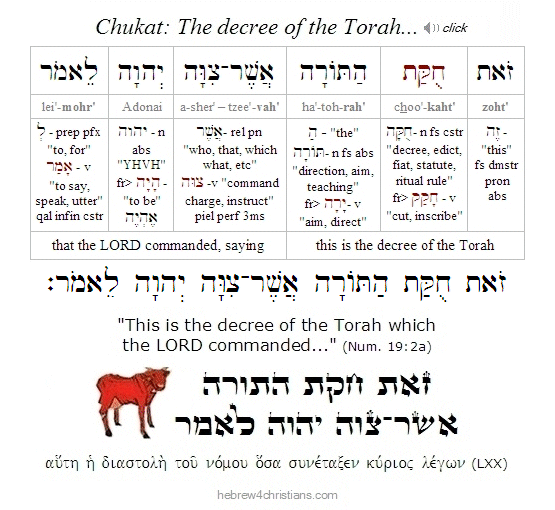 |
Overruling the Wicked...

Our second Torah portion this week (Balak) is named after a fretful Moabite king (בָּלָק) who sought to curse the Jewish people by hiring the services of a wicked Midianite "prophet" named Balaam (i.e., bil'am: בִּלְעָם). King Balak's plan was to employ Balaam's sorcery (כַּשָׁפוּת) against the Israelites to prevent them from entering the Promised Land. Similar to the delicious irony that befell the villain Haman in the Book of Esther, however, King Balak's scheme was upended, and the curse he sought to put on the Jewish people was repeatedly pronounced as a blessing by Balaam instead. After several foiled attempts to curse the Israelites, Balak finally dismissed the prophet from his service, but before departing from the dejected king, Balaam ironically prophesied the destruction of the Moabites and the establishment of Israel. The shameful story of Balaam reveals that "there is no enchantment against Jacob, no divination against Israel" (Num. 23:23). Ein od milvado (אֵין עוֹד מִלְבַדּו) - no weapon or scheme devised against God will ever prosper (Isa. 54:15-17). Amen.
But who was this mysterious prophet named Balaam? According to Jewish tradition, Jacob's wicked uncle Laban had a son named Be'or (בְּעוֹר), who became the father of Balaam. In other words, the "cursing prophet" Balaam was none other than the grandson of Laban:
 |
Note that the name "Beor" first appears in connection with a king of Edom (Gen. 36:32), which suggests that Balaam might have once been a king of the Edomites (i.e., the descendants of Esau). Further note the phonetic similarity to Peor. If Beor and Peor are the same, then Balaam was actually a prophet of Baal Peor, a local Semitic god.
Balaam was regarded as a great seer, magician and an adept in the occult. He had an "evil eye" and drew the spirit of demons to anything he gazed upon (Avot 5:22). His notoriety made him famous, and powerful people asked him to invoke curses on their enemies. The Talmud (Sanhedrin 106a) states that Balaam became so famous as a magician that he later became a chief advisor to Pharaoh. It was Balaam who advised the new Pharaoh to enslave the Israelites and to afflict them with brutal taskmasters (Exod. 1:8-11). For more information about the identity of Balaam, see the entry entitled, "The Curses of Balaam."
Believing God's Heart...
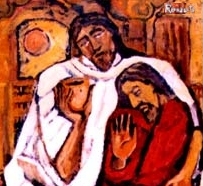
[ "To love another in spite of his weaknesses and errors and imperfections is not perfect love. No, to love is to find him lovable in spite of and together with his weakness and errors and imperfections." - Kierkegaard ]
06.23.23 (Tammuz 4, 5783) When he was asked what was the most important commandment of all, or, what does God really ask of us, Yeshua quoted the "Shema" passage from the Torah: "Hear O Israel, the Lord is our God, the Lord alone, and you shall love the LORD your God with all your heart, with all your soul, with all your mind, and with all your strength.' He then said: "This is the first commandment" (Mark 12:29-30, Deut. 6:4-5).
The Hebrew word shema (שׁמע) means "listen," so the most important commandment is to hear the truth that the Lord is our God, the Lord alone... Other things may compete for your attention, but what is essential is for you to believe and to know that the Lord is your God, which, incidentally, is the very first of the Ten Commandments (Exod. 20:2).
The Shema is the call to intellectually and emotionally connect with God as the most important and precious person in your life. "You shall love the Lord your God with all your heart" is the invitation to relate to God on the basis of his great love for you, and faith is your heart's response that receives that love with all of your being. That is the goal of teshuvah, or "repentance," after all: turning to God to find life in his love. Knowing God's heart is your very reason for being; it is the most sacred concern of your life.
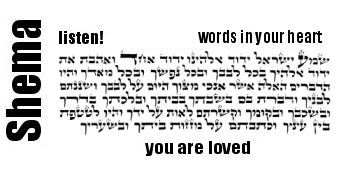 |
Generally speaking, we must quiet our heart to "make room" to listen, and that implies a measure of self-forgetfulness. To listen well we let go of our need to be in control and then receive what is said in humility. Listening to God honors his presence, trusts his authority, and surrenders to his care. Even in our troubles and our anguish (and especially in those times) our first duty is to quiet our hearts and listen, as it says: "He delivers the afflicted by means of their affliction and opens their ears by adversity" (Job 36:15).
It is written: "Let every person be quick to hear, slow to speak, slow to anger" (James 1:19), yet we are often just the opposite: slow to hear, quick to speak, and quick to wrath. However, in the midst of our struggles we must be careful to heed the questions the Spirit speaks from out of the whirlwind, as righteous Job did: "Have you entered into the springs of the sea, or walked in the recesses of the deep? Where is the path to the source of light? Where is the home of the east wind?" "Do you know the laws of the heavens, or can you set up their rule over the earth?" (Job 38). Job was astonishingly humbled by hearing such words, so much so that he finally exclaimed: "I know that you can do all things, and that no purpose of yours can be thwarted. You asked, 'Who is this that questions my wisdom with such ignorance?' It is I -- and I was talking about things I knew nothing about, things far too wonderful for me... I had only heard about you before, but now I have seen you with my own eyes. I abhor myself and repent, seeing I am dust and ashes" (Job 42:2-6).
Job's friends, on the other hand, had not believed in the LORD as Job had - that is, they had not seriously listened to God's voice nor faithfully searched for him in the midst of their anguish. Theirs was a "second hand" sort of suffering. Perhaps they had never tasted the dregs of the cup of tribulation as did Job but they nevertheless wanted to hold to a form of godliness. Their essential error, however, was that they presumed to know the truth about God when in fact they were impostors, "theological quacks" who were too busy justifying their own preconceptions to offer any remedy or genuine comfort to their suffering friend. The Lord listened to Job in his plight and took him seriously, however, because Job was a man of authentic faith, and he respected the ambivalence that Job felt within his heart, namely that God loved him dearly and yet allowed inexplicable evil to besiege him - for that was the essence of his struggle, after all, a struggle not to let go of his love for God but to cling to it despite the harrowing loss and destruction of his world (Job 2:10).
Even though he never got an explanation for his suffering, Job received something far better, namely the direct revelation of the One who made all things by the hand of his glory. And that is the hope we likewise hold, to one day see our Lord face to face, to behold Him in his beauty and glory forever and ever. We do not need explanations for why we are sometimes vexed with suffering as much as we need the will to endure and to keep believing. And may it please our Lord to help us persevere and remain faithful when we are tested. Amen.
Hebrew Lesson
Job 13:15 Hebrew reading (click):
Marks of False Teachers...

[ The following entry concerns this week's Torah reading, parashat Korach. Please read the Torah portion to "find your place" here. ]
06.22.23 (Tammuz 3, 5783) False teachers (מורי שקר) tend to be "people pleasers." They desire the esteem of the crowd, the praises of men, and therefore appeal to the murmurings of the unregenerate heart: "Do not prophesy to us what is right; speak unto us smooth things, prophesy deceits" (Isa. 30:10). They flatter people by "tickling their ears"; they offer either platitudes or "new revelation" based on their own imagination. Consequently, they tend to be grandiose and quick to disparage God's faithful servants. Thus Korah accused Moses of wanting to exalt himself, when this only disclosed the evil lurking within his own heart (Num. 16:3). False teachers speak in their own name and presume to be something when they are nothing (Gal. 6:3). "The prophets prophesy lies in my name: I sent them not... they are prophesying to you a lying vision, the deceit of their own minds" (Jer. 14:14). They secretly deny that Yeshua is LORD (יהוה), though they may offer "lip service" about his importance (2 Pet. 2:1). Instead of focusing on the message of the gospel and the greatness of salvation found in Messiah, they "major in minors," passing over the weightier matters for the sake of various divisive doctrines (Matt. 23:23). They desire to be teachers of the law, but they have no idea what they are talking about (1 Tim. 1:7). Often such deceivers have natural charisma, charm, "good hair," and an ability to bewitch people through buttery oratory or clever presentation (Col. 2:4,8). Often they focus on the truth of the head rather than the truth of the heart; they are more concerned with being vindicated than healing broken hearts. Finally, they tend to exploit people to promote their own self-serving agenda (1 Pet. 2:1-3). They make "merchandise" out of the gullible, regarding them as the means to support their "ministry" rather than as precious souls in need of God's love and care...
False teachers inevitably "twist the Scriptures" by offering unsound interpretations contrary to the ruach, or spirit of the Hebrew prophets, and by evading the commandment to "rightly divide" the word of Truth according to basic logic and clear thinking (2 Tim. 2:15; 2 Pet. 1:20-21; 3:16). In Christian circles, they often come in the name of the law (legalism) or in the name of grace (licentiousness), but rarely do they take the trouble to carefully (and equitably) work through the paradoxical tensions. False teachers are uncomfortable humbly confessing they don't know something, and therefore they are quick to style themselves as an infallible prophet or source of authoritative wisdom...
There is no substitute for taking the time and energy to humbly study Torah, friends, and we should be suspicious of those who claim special insight when it is evident that they have not really labored working through the Scriptures... All disciples of Yeshua are called "students," or talmidim (תַּלְמִידִים), a word that comes from lamad (לָמַד) meaning "to learn" (the study of Scripture is called talmud Torah (תַלְמוּד תּוֹרָה) from the same root). Among other things, then, following Yeshua means becoming a student of the Jewish Scriptures that he both loved and perfectly fulfilled (Matt. 5:17-18; Luke 24:44-45). Only after learning the truth of the Scriptures will you be equipped to "go to all the nations and teach" others (Matt. 28:19). This is accomplished not merely by explaining (propositional) doctrine but by kiddush HaShem -- sanctifying the LORD in our lives (1 Pet. 1:15-16). "You shall know them by their fruits..."
Yeshua brings the kingdom of God "at hand," that is, into the realm of this fallen world. False teachers are emissaries of evil, commissioned by the devil to seduce, deceive, and ensnare souls; they disguise themselves as an "angel of light" (2 Cor. 11:14). God allows false teachers to justify the desires of the unregenerated heart, for such teachers find their audience among those who want to be deceived (Matt. 13:24-30; 15:14). In other words, there can be no false teachers apart from false believers who go along with the ruse. In light of this possibility, we should be careful to honestly examine our hearts. What are your motives for faith? What draws you to Yeshua? Do you accept the message of the gospel or are you trusting in something else? Are you really one of his "sheep"? Do you hear his voice, or are you heeding something contrary to the truth of the Holy Spirit?
Just as the easiest way to spot a counterfeit dollar bill is to know the various details of the original, so our best defence against false teaching is to know the details of doctrine and to use discernment as the LORD helps us "test the spirits" (1 John 4:1). This implies that we "build ourselves up in the most holy faith" by carefully (i.e., humbly) studying the word of God - especially the Torah, since the Torah is the foundation of all that follows (Jude 1:20). In this way we will be able to accurately wield the Sword of the Spirit (2 Tim. 2:15-16, 2 Pet. 1:19-20). In order to grow, we must have "good soil" for the seed of the word to take root. We "get rooted by knowing the roots" of our faith! Studying the Scriptures and praying in the Spirit of Truth keeps us securely in the love of God as we wait for the mercy of Yeshua who gives us eternal life (Jude 1:21).
Hebrew Lesson
Provwebs 14:15 reading (click):
Stewardship for Life...
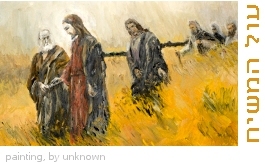
[ "One life on this earth is all that we get, whether it is enough or not enough, and the obvious conclusion would seem to be that at the very least we are fools if we do not live it as fully and bravely and beautifully as we can." - Frederick Buechner ]
06.22.23 (Tammuz 3, 5783) When I first read the parable of the "unjust steward" (see Luke 16:1-13), I was a bit puzzled. Yeshua tells the story of a certain rich man who had discovered that his "steward" (or manager) was stealing from him, and he therefore decided to remove him from his service. The steward, in his desperation, then quickly called his employer's debtors and gave each a significant discount on the debt they owed. In this way the steward sought to gain their favor so that he would be taken care of in days to come...
Now what is surprising about this story is that Yeshua commended the unjust steward for his shrewdness, and then he cryptically added: "Make friends for yourselves by means of the "mammon of unrighteousness" (μαμωνᾶ τῆς ἀδικίας), that when it fails, they may receive you into the eternal dwellings" (Luke 16:9). Wait, what? How are we to understand this?
At first glance the story seems simple enough, at least in worldly terms: Do someone a favor in their need, and they will reciprocate regarding your need: "Scratch my back, and I will scratch yours." It is likely that the steward thought that if he did some favors for others, they would return the favor in the days to come. Moreover the steward, savvy as he was, likely understood that the interest charged to the debtors was technically forbidden by Jewish law, and therefore he reasoned that his wealthy employer could not accuse him of larceny without therby incriminating himself. He could therefore leverage the loss of his job and make a profit for himself at the same time. Despite the devious ploy, however, the rich man "commended" (i.e., ἐπαινέω, "praised") the steward because he had acted shrewdly. "Check Mate..."
Now this story is not to suggest that our righteous Lord approved of such devious financial schemes and deception, though it is likely Yeshua told the story to illustrate the importance of seizing opportunities in life with an eye to future benefit. He was drawing a comparison: just as the unjust steward managed his desperation to secure opportunities for his future, so we should manage our resources and opportunities so that we will be welcomed into the "eternal habitations" of heaven itself. If worldly wealth can be used to gain friends that will welcome you into their hearts, then how much more should such wealth be used to secure the "true riches" of blessing of the world to come?
Yeshua admonishes both his followers as well as those who rely on worldly wealth: The one who is faithful with little is faithful also in much, but the one who is unjust in the least is unjust also in much. If we are not trustworthy in handling worldly wealth, how will we be so regarding heavenly riches? He therefore said that it is not possible to serve both God and "mammon," a word that means possessions of all kinds -- not just money or silver. If you place mammon as your highest good or concern, you cannot serve God, since covetousness, desire, and various fears will demand all of your heart, soul, and strength.
Our stewardship of mammon is therefore a spiritual test, since mammon will either control us as we seek worldly power and personal satisfaction, or we will yield all that we have to the LORD for godly and righteous purposes that will yield interest in this world and riches in the world to come. When Yeshua said "gain friends so that you will be welcomed into eternal habitations," he meant that we should be rich toward God by helping others, by promoting organizations that teach and share the message of the gospel, and so on (Luke 12:21).
Therefore invest your life and your resources "shrewdly" for eternal purposes. Whether you have much or little, do what you can for the sake of the Kingdom of God. The stewardship of your resources has eternal significance and consequences. Imagine that when your life is over how the account ledger will read... Will your life be credited by giving the gifts you were given for the blessing of others, or will it expose your worldly debits and fears? "Follow the money" and you will see what you find to be most important, after all.
We are all stewards - not owners - of whatever we have. In Hebrew, we do not say "I own x," but instead say "there is to me x" (יש לי) implying that God alone is the Source and Owner of reality. Wealth can be a blessing or a curse depending on how it is used. Our Lord teaches that we should be "shrewd" in our investments for the sake of what really matters. The choices we make today will follow us tomorrow, and indeed, for eternity.
Hebrew Lesson
Proverbs 11:18 reading (click):
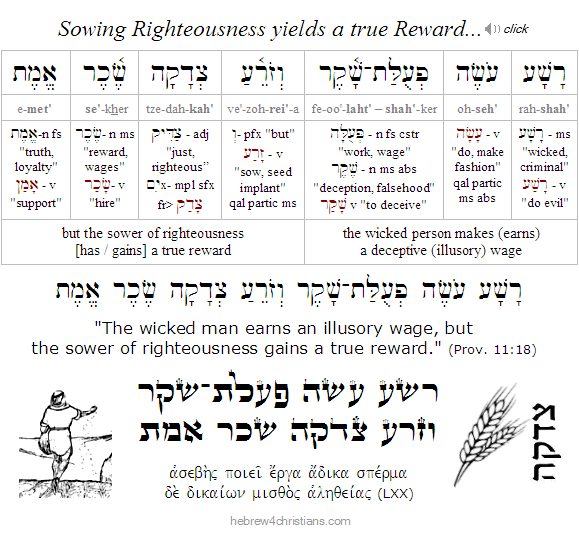 |
That which is of Ultimate Concern...
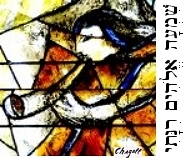
[ The following entry concerns this week's Torah reading, parashat Korach... ]
06.22.23 (Tammuz 3, 5783) We read in our Torah portion for this week (i.e., Korach) the terrible fate of Korah and his co-conspirators: "And the earth opened its mouth and swallowed them up" (Num. 16:32), which the sages say metaphorically refers to being consumed by this world, its desires, and its end...
Life is a serious business, an irrepeatable opportunity. Many trifle their way to the grave, fully unprepared for the shock of the world to come... How few make it the great business of life to prepare themselves "until their change comes" (Job 14:14); how few consciously number their days to obtain a heart of wisdom (Psalm 90:12)? We mustn't fool ourselves by thinking we have a long road ahead before we face who we are at the time of our death (Luke 12:19-21). "No one knows the day or hour," yet it is certain to come, and wisdom bids us be prepared. All must die; there is no escape (Heb. 9:27). "No man has power to retain the spirit, or power over the day of death. There is no discharge from this war, nor will wickedness deliver those who are given over to it" (Eccl. 8:8).
In light of this somber truth, do you reflect on its significance? Have you taken time to consider how it will be for you at your death? Allow such thoughts to awaken you from your careless and unwatchful state. Lay up treasure in heaven (Matt. 6:20). Considering the vastness of eternity, human life is likened to a mere vapor that quickly passes away (Psalm 103:15-16). It is madness to put off that which is of ultimate concern until the last moment. Therefore "repent one day before you die." But who knows the day of one's death in advance? Therefore live each day as if it were to be your last, and may God help you to "seek the LORD while He may be found; call upon Him while He is near" (Isa. 55:6).
כי־ידעתי מות תשׁיבני
ובית מועד לכל־חי
kee-yah·da'·tee · mah'·vet · te·shee·vei'·nee
oo·veit · moh·eid · le·khol-chai

"For I know that you will bring me to death,
and to the meeting place for all the living."
(Job 30:23)

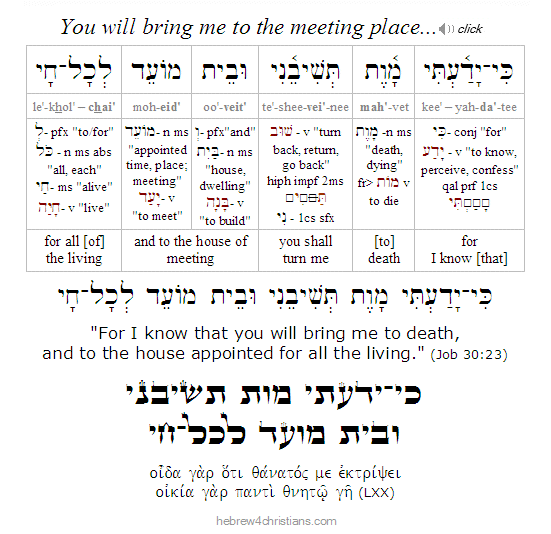 |
Of course dying in the LORD assumes you are really "in Him," that is, that you are a person whose heart is known by Him (1 Cor. 8:3). You can't die in him if you have never lived in him. In this world we learn to die, and as we die in Him, so we will live in him. Resolve this within your heart: "Blessed are the dead who die in the Lord" (Rev. 14:15).
Concerning the prospect of death we are full of confidence, of course, since Yeshua has overcome death for us and secured our place in heaven (John 11:25; Heb. 2:9-10). "We must all die; we are like water spilled on the ground, which cannot be gathered up again. But God will not take away life, and he devises means so that the banished one will not remain an outcast" (2 Sam. 14:14). Though physical life inevitably returns us to dust (Heb. 9:27), death does not have the final word, since God wonderfully "devises the means by which the banished are brought back home." If you belong to the Lord, your death is the day of precious homecoming to be with your beloved Savior: "For me to live is Messiah, and to die is gain" (Phil. 1:21). As it is written, "just as we have borne the image of the man of dust, we shall also bear the image of the man of heaven" (1 Cor. 15:49). Amen.
 |
Sanctifying the Truth...

06.20.23 (Tammuz 1, 5783) How do we share the message of God with others? How do we reveal the truth of Messiah in this world? In other words, how may the Spirit of God be manifest within us? The Scriptures say first to "sanctify the Messiah" within our hearts and then we will be ready to give a reason for our hope -- though we must do so in humility and reverence before heaven" (1 Pet. 3:15). We sanctify the Lord by choosing to make sacred place for him within our consciousness; we enshrine him and esteem him beautiful within our affections and actions (Exod. 15:2). When God said to his people, "Let them make for me a sacred place (i.e., mikdash: מִקְדָּשׁ) that I may dwell in their midst," then, he was inviting them to make room within their hearts (בְּתוֹכָם) for His Presence to be revealed (Exod. 25:8). As Yeshua taught us: "The Kingdom of God is within you" (Luke 17:21).
King David understood this principle: "I have set the LORD always before me..." (Psalm 16:8). In other words we must open our eyes to see; we must humble ourselves to believe; and we must open our hearts before the greatness of God. This is the first step, as Yeshua taught us: Avinu shebashamayim, yitkadesh shemekha - "Our Father in heaven, let your Name be sanctified" (Matt. 6:9). As we sanctify the Lord we bear witness of the truth of Reality, and the Spirit of God will empower us to living signs of the Divine Presence. "But the fruit of the Spirit (פְּרִי הָרוּחַ) is love, joy, peace, patience, kindness... (Gal. 5:22-23).
"Know therefore this day and lay it to your heart, that the LORD is God in heaven above and on the earth beneath; there is no other" (Deut. 4:39). Note that the phrase "lay it to your heart" in this verse may better be rendered as "return to your heart" (וַהֲשֵׁבתָ אֶל־לְבָבֶךָ), suggesting that the truth of the LORD is found there – within the heart that truly seeks him (Jer. 29:13). Hashivenu! In other words, the truth is found in the heart's seeking for the LORD and His love. Know this truth today... "The most important part of teaching is to teach what it is to know," that is, to know "in your heart."
Hebrew Lesson
Psalm 16:8 reading (click):
The Breath of God...
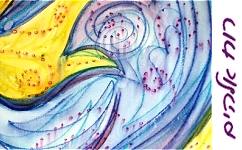
06.20.23 (Tammuz 1, 5783) A verse from this week's Torah portion (i.e., Korach) reveals another great Hebrew name for God: Elohei ha-ruchot lekhol basar (אֱלהֵי הָרוּחת לְכָל־בָּשָׂר), which can be translated "the God of the breath of all flesh" (Num. 16:22). The LORD is the Source of your breath, the One who exhales to you nishmat chayim (נִשְׁמַת חַיִּים), the "breath of life" that enables you to live (Job 12:10).
To understand this, the sages use the analogy of a glassblower who creates a glass vessel. Just as the glassblower blows into a tube to form a vessel from molten glass, so the breath (i.e., neshamah: נְשָׁמָה) that comes from the LORD functions as spirit (i.e., ruach: רוּחַ) that forms and fills the human soul (i.e., nefesh: נֶפֶשׁ). Note that the Name YHVH (יהוה) first appears in this connection (Gen. 2:7), a Name that means "God is Present" (Exod. 3:14) and "God is Mercy" (Exod. 34:6-7). Note also that each letter of the Name YHVH represents a vowel sound (i.e., breath), suggesting that God's Spirit is as close as your very next breath. Like the wind that cannot be seen, so is the spirit the essential part of your identity. Yeshua breathed on his followers and said, "Receive the Holy Spirit" (John 20:22).
The special Name Elohei ha-ruchot lekhol basar appears only one other place in the Torah. After accepting the fact that he would soon die and therefore be unable to finally lead the people into the promised land, Moses prayed: "Let the LORD (יהוה), "the God of the spirits of all flesh" (אֱלהֵי הָרוּחת לְכָל־בָּשָׂר), appoint a man over the congregation who shall go out before them and come in before them, who shall lead them out and bring them in, that the congregation of the LORD may not be as sheep that have no shepherd." So the LORD said to Moses, "Take Joshua the son of Nun (יְהוֹשֻׁעַ בִּן־נוּן, lit. "son of life"), a man in whom is the Spirit (רוּח), and lay your hand on him" (Num. 27:16-18).
The Talmud notes that the word Nun (נוּן) means "fish," a symbol of activity and life. Joshua, the chosen one who succeeded Moses and led the people into the Promised Land, was the "Son of Life" - a clear picture of Yeshua our Messiah, the "spirit-filled good Shepherd" who would lay down His life for the sheep (John 10:11). The LORD is indeed the "God of the breath of all flesh." When Yeshua cried out, "It is finished" and breathed his last breath as He died for our sins upon the cross, the greatest exhalation of the Spirit occurred, the greatest sigh, the greatest utterance was ever declared. The sacrificial death of Yeshua for our deliverance was God's final word of love breathed out to those who are trusting in Him.
Hebrew Lesson
Job 12:10 reading (click):
The Madness of Korah...

[ The following entry concerns this week's Torah reading, parashat Korach... ]
06.20.23 (Tammuz 1, 5783) This week we read about the rebellion a man named Korah who defiantly challenged Moses' leadership of God's people. Rejecting the idea that God "choses" certain people to be leaders, Korah claimed to be a "man of the people" who pretended to seek equality and justice for all. Like all hypocrites, however, Korah accused Moses of what was in his own heart: "You have gone too far! (רַב־לָכֶם, lit., "(too) much for you!")... all the congregation is holy, every one of them, and the LORD is among them. Why do you raise yourselves above the congregation of the LORD?" (Num. 16:3). Implicit in Korah's complaint was the rejection of the idea of "chosenness," and this further impugned the divine origin of Torah revelation. After all, if it were true that the LORD was equally among all the people, surely a democratic (rather than theocratic) model of government would be best... Moses, however, clearly understood Korah's envy and ulterior motives, and therefore called for a "power encounter" to demonstrate the veracity and integrity of his office.
The portion begins with the words, "And Korah took..." וַיִּקַּח קרַח / (Num. 16:1). The sages note that this verse does not say exactly what it was that Korah took. The Hebrew simply reads, vayikach Korach... which may suggest that Korah took offense, and indeed the entire portion can be regarded as one of machloket (i.e., מַחְלקֶת, strife or argument), which can be either l'shem shamayim, "for the name of heaven" (i.e., to discern truth) or shelo l'shem shamayim, "not for the name of heaven." A mishnah reads, "Any machloket waged for the sake of Heaven (in the service of God) will stand. Any machloket which is not for the sake of Heaven will not stand. Which controversy was an example of being waged in the service of God? Such was the controversy of Hillel and Shammai. And which was not for God? Such was the controversy of Korah and all his company" (Pikei Avot 5:20). Note that the name Korah may come from a verb meaning "split," alluding to the division he would later express.
Jewish tradition tends to regard Korah as a paradigmatic "rationalist" who took offense over the decrees (non-rational laws) of Torah. For example, the midrash says that Korah argued with Moses about the techelet (blue) string required of tzitzit (ציצית), asking Moses that if a garment were made entirely of blue thread, would tzitzit still be required to be worn? Such a law seemed illogical, and therefore Korah questioned it. In that sense, Korah represents the perspective of rationalism: "I understand in order to believe," rather than the other way around, "I believe in order to understand." Kol Dodi notes that Korah's name (i.e., קרַח) can be arranged to spell choker (חקֶר), meaning to reasearch or "analyze." Korah thought that the human mind was capable of understanding the LORD through analysis and reason, rather than through faith and obedience.
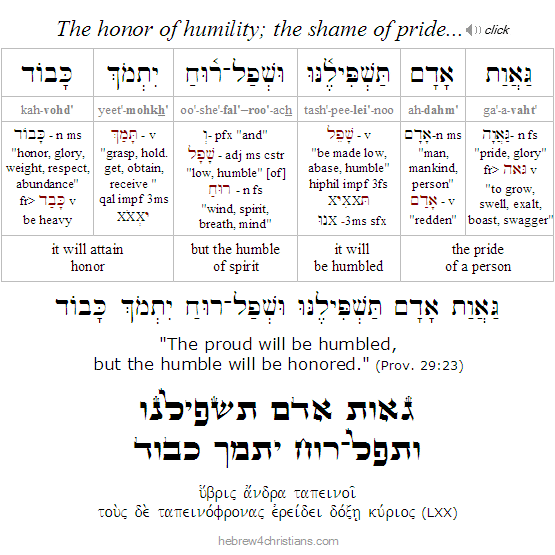 |
Note: For more see the article: "The Madness of Torah."
The Projection of Korah...
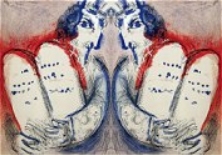
06.20.23 (Tammuz 1, 5783) In our Torah reading this week (i.e., parashat Korach), Moses' cousin Korah brazenly accused Moses of self-aggrandizement and superiority by saying, "Why do you exalt yourself above the assembly of the LORD? ... Is it a small thing that you have brought us up out of a land flowing with milk and honey to kill us in the desert, that you also make yourself a prince over us?" (Num. 16:3,13). The Talmud comments: "One who seeks to disqualify another projects his own defects upon him." Korah's own self-exaltation and vanity led him to suppose that Moses was likewise proud and vain. His envy so twisted his perspective that he saw good as bad and bad as good. For him Egypt was the land "flowing with milk and honey" and Moses - not Pharaoh - was the real tyrant! In this connection the sages have said that other people serve as mirrors, and the defects we see in them reflect our own. Korah needed to see that his envy of Moses was rooted in fear, and that healing would come if he would let go and trust that God was in control of his life.
We can learn from the self-deception of Korah -- as well as his terrible end... "As you judge another you condemn yourself, for you that judge do the same things" (Rom. 2:1). How you react to another person reveals what is within your own heart, and this provides the opportunity to find healing by doing teshuvah and extending compassion to yourself. When you condemn another you are hurting yourself, after all. It is not a matter of factual truth as much as it is of the truth of hope and love. As we forgive others, so we find our own forgiveness (Luke 6:37), but if we insist on our rights, we find ourselves in hell... Fire offered falsely will be answered by the fire of God's judgment.
Hebrew Lesson
Proverbs 12:15 reading (click):
Endurance to Hope...
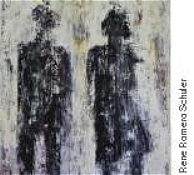
[ "Being a good steward of your pain.... involves being alive to your life... keeping in touch with the pain as well as the joy of what happens because at no time more than at a painful time do we live out of the depths of who we are instead of out of the shallows."- Buechner ]
06.19.23 (Sivan 30, 5783) Though we are determinedly optimistic about the purpose and end of reality, and though we believe that God "works all things together for good" (Rom. 8:28), we are not therefore "monistic idealists," that is, those who say that "God is One" really means that evil is not real or that it is actually a "part of God." Reductionistic answers are always too simplistic, whether they come from science, theology, or cracker-barrel philosophy...
The Spirit of God announces: "Woe to those who call evil good, and good evil; who put darkness for light, and light for darkness; who put bitter for sweet, and sweet for bitter! Woe to those who are wise in their own eyes, and prudent in their own sight!" (Isa. 5:20-21).
It is woeful to confound the moral truth of God with sophistical categories of human arrogance: "language games" intended to subvert and pervert all the great principles of truth, wisdom, and of righteousness... And it is woeful to "sanctify crimes with the names of virtues," to pillage the truth of language for illicit or perverse gain. And yet again it is woeful to abuse the mind by confounding the role of conscience, to disparage intuitions of moral reality, to impugn logical reasoning, and therefore to make a "pretend form" of knowledge.
The Holy Spirit states that the difference between good and evil, and of sin and righteousness, is as evident as the difference between the most obvious of contrary qualities discovered by the senses, such as the benefit of light over darkness and of seeing over being blind.... Throughout the Scriptures, "darkness" symbolizes ignorance, error, deception, and crime, whereas "light" connotes truth, knowledge, and heartfelt piety. Likewise bitterness is associated with evil and sin: "Your own wickedness will correct you, and your backslidings will rebuke you. Know therefore and see that it is evil and bitter (רַע וָמָר) that you have forsaken the LORD your God, and that the fear of Me is not in you (וְלֹא פַחְדָּתִי אֵלַיִךְ)," declares the Lord GOD of hosts" (Jer. 2:19; see also Jer. 4:18), just as sweetness is associated with goodness and righteousness: "How sweet are Your words to my taste! Sweeter than honey to my mouth" (Psalm 119:103); "Taste and see that the LORD is good; blessed is the person who trusts in Him" (Psalm 34:8). The commandments of God are more to be desired than gold, yea, than much fine gold: sweeter also than honey and the honeycomb; moreover by them is thy servant warned, and in keeping of them there is great reward" (Psalm 19:10-11).
Alas, the majority of people in every generation love darkness more than light, as our Lord attested: "This is the condemnation, that light has come into the world, but people love darkness rather than light, because their deeds are evil. For every one that does evil hates the light and does not come to the light, so that his deeds would be exposed. But the person who does truth comes to the light, that his deeds may be made manifest that they done by God's power" (John 3:19-21). In this connection Charles Elliot wrote: "Deliberate perversion is in all ages the ultimate outcome of the spirit that knows not God, and therefore neither fears nor loves Him, whether it shows itself in the license of profligacy, or the diplomacy of Machiavellian statesmen, or the speculations of the worshipers of mammon."
We are given "exceedingly great and precious promises," yet in this world we suffer and experience real pain, heartache, and troubles. Yeshua said "in this world you will have tribulation," though that is not the end of the story, of course, for there is the cheer of God's' victory, even if we must repeatedly ask God for grace to endure our troubles without murmuring or kvetching (John 16:33; Heb. 4:16). I realize that is often difficult, and some of you might be within the fiery furnace even now. You might be asking, "Where are you, Lord, in all of this? Why don't you bring me out of these troubles?" In such testing you need endurance (ὑπομονή) to hold on to hope, believing that God uses affliction to refine you for good. As Paul said, "We rejoice in our sufferings, knowing that suffering produces endurance, and endurance produces refined character, and refined character produces hope" (Rom. 5:3-4). Each of us is still upon the "Potter's wheel," and God's hand continues to shape us into vessels that one day will reveal his glory and honor. "The LORD will give strength to his people; the LORD will bless his people with peace" (Psalm 29:11).
Hebrew Lesson
Psalm 29:11 reading (click):
So please keep holding on, friends, and do not give up. Though these are indeed perilous times, the Lord our God is faithful and true. He will never leave nor forsake us, whatever may come. The Lord gives us acharit ve'tikvah (אַחֲרִית וְתִקְוָה), "a future and a hope" (Jer. 29:11).
Echoes from the Future...
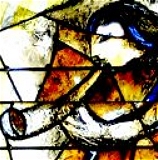
06.19.23 (Sivan 30, 5783) Yeshua forewarned of the alienation and moral sickness that would pervade mankind just before the time of his return: "Because lawlessness (i.e., ἀνομία, from -α ('not') + νομος, 'torah') will be increased," he said, "the love of many will grow cold (i.e., ψύχομαι, 'be extinguished')" (Matt. 24:12). Note the link between Torah and love: true love requires respect for God's authority, for without that the divine image is disfigured and desecrated. Likewise the Apostle Paul foresaw that the "End of Days" (אַחֲרִית הַיָּמִים) would be a time of peril (καιροὶ χαλεποί) because people would become increasingly narcissistic, self-absorbed, infatuated with their own sense of self-importance, abusive toward others, disrespectful to elders, ungrateful, heartless, unforgiving, without self-control, brutal, treacherous, and so on (2 Tim. 3:1-4).
Therefore, in light of the spiritual war that rages all around us, it is vital that we remain firmly rooted in what is real by taking hold of our identity and provision as children of God. "God has not given us the spirit of fear, but of power (גְּבוּרָה / δύναμις) and of love (ἀγάπη), and of a "sound mind" (σωφρονισμός), i.e., a "delivered" mind -- centered and "healed" from inner chaos (2 Tim. 1:7). The name of the LORD (יהוה) means "Presence," and in Him "we live and move and have our being" (Acts 17:28). He is as close as our heart and our very breath (Rom. 10:8). We are not to be troubled like the world that lives in terror of man, nor are we to crave security from the vain devices of mere men. No - we look to God Almighty, the Master of the Universe. He alone is our Refuge and Defense, the One who sustains us in the midst of these storms. "Let not your heart be troubled" - God is in control of the whirlwind.
According to orthodox Jewish eschatological tradition, the period of time immediately before the Messiah's arrival is sometimes called ikvot meshicha (עִקְּבוֹת מְשִׁיחַ), the time when the "footsteps of the Messiah" can be heard. Some of the "signs" of this period include the rise of various false prophets, numerous wars and "rumors of wars," petilences, famines, earthquakes, worldwide apostasy from the faith, persecution, and a globalized sort of godlessness that is revealed in unbridled selfishness, greed, chutzpah (audacity), shamelessness, and a general lack of hakarat ha-tov (gratitude). The greatest sign, however, will be that Israel will exist once again as a sovereign nation, despite the prophesied exile among the nations (Deut. 4:27-31; Jer. 30:1-3).
Hebrew Lesson
Psalm 143:11 reading (click):
For more on this fascinating subect, see the article "Birthpangs of Messiah."
All in the family:
The Rebellion of Korah (פרשת קורח)
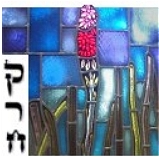
06.18.23 (Sivan 29, 5783) Chodesh Tov, chaverim! Last week's Torah portion (Shelach Lekha) told the tragic story about the "sin of the spies" (חטא המרגלים) and the divine decree that the generation rescued from Egypt was sentenced to die in the exile of the desert. In this week's portion (parashat Korach), the hard truth of their condition began to sink in, and the people bemoaned their fate and rebelled further by attempting to overthrow God's designated leadership and return to Egypt. This rebellion was instigated and organized by Moses' cousin Korach, who – along with a band of co-conspirators – was swiftly judged and put to death, thereby vindicating the Aaronic priesthood and Moses' leadership of Israel.
Korach was the cousin of Moses and a well-respected Kohathite who was honored to be one of the carriers of the Holy Ark (ארון הברית). He was a wealthy man of influence - a nassi (prince) of the people. Despite all this privilege, however, Korach rationalized that he should be the head of the Kohathite clan (instead of his cousin Elzaphan), since he was the firstborn of Kohath's second son, whereas Elzaphan was not even a firstborn son. Indeed, because he felt slighted by Moses' choice, Korach went even further and brazenly questioned whether the office of the High Priest should not have been given to him – rather than to Aaron.
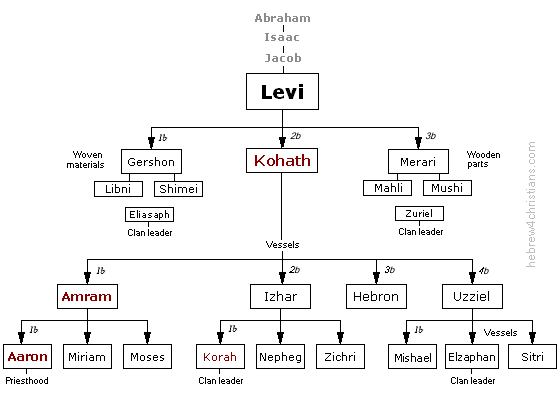 |
Korach's co-conspirators were two brothers named Dathan and Abiram from the tribe of Reuben, Israel's firstborn son. Together, they put together a force of 250 men to confront Moses and to challenge his exclusive claim to leadership: "You have gone too far! For all in the congregation are holy, every one of them, and the LORD is among them. Why then do you exalt yourselves above the assembly of the LORD?" (Num. 16:3).
In response to their challenge, Moses proposed that Korach and his followers bring firepans to offer incense at the Tabernacle to determine whether they were indeed chosen to serve as priests. The following morning, when Korach and his 250 followers assembled at the gate of the Tabernacle to offer incense, God threatened to destroy them all instantly. Moses begged God not to destroy all the people, but only the rebels. He then warned the congregation to stand clear of the dwellings of Korach, Dathan, and Abiram. The earth then opened up and swallowed them alive, and a fire consumed the 250 men who illegitimately offered the incense...
Korach's rebellion introduced outright mutiny and chaos within the leadership of the camp that brought swift and terrible rebuke from the LORD. Nevertheless, the very next day the entire congregation of Israel audaciously began to accuse Moses and Aaron, saying: "You have killed the people of the Lord." When the people looked toward the Tabernacle, however, the Glory of the LORD appeared, where God descended to tell Moses and Aaron that he was going to destroy the Israelites for their treason. Despite Moses and Aaron's fervent intercession, however, a deadly plague broke out among the people. Moses then instructed Aaron to take his firepan with incense and to bring it in the midst of the congregation to make atonement for them. Aaron did so, "and he stood between the dead and the living; and the plague was stayed." The Torah tells us that 14,700 Israelites died because of the plague, not including the deaths of those involved in the rebellion of Korach.
As a final test to vindicate Aaron as God's chosen priest, each of the twelve tribal heads of Israel, as well as Aaron himself, were instructed to bring their staffs to Moses. Moses then inscribed their names on each staff and brought them into the sanctuary before the ark of the testimony. "And the staff of the man whom I choose shall sprout. Thus I will make to cease from me the grumblings of the people of Israel, which they grumble against you." The following day Moses went into the Tabernacle and "behold, the staff of Aaron for the house of Levi had sprouted and put forth buds and produced blossoms, and it bore ripe almonds." He then brought out all the staffs and gave them back to each of the tribal leaders. God then told Moses to return Aaron's staff to the Tabernacle as a testimony for generations to come.
Note: It's been a brutal fight for me lately, with an onslaught of various problems and challenges. I appreciate your prayers for me and for my family. I will not give details about the struggles here, but suffice it to say that the devil has been working overtime, it seems, to distract and discourage me over the last few months. Thank you again for your prayers.
The Path of Life (ארח חיים)

[ "We love because God first loves us" (1 John 4:19), and therefore teshuvah ("repentance") is a matter of being in love, celebrating God's heart for us, awakening to its wonder, and being thrilled and overjoyed at its reality.... ]
06.16.23 (Sivan 27, 5783) Spiritual regeneration or transformation isn't just leaving the sinful past behind you, but discovering the glory of true and infinite life that sustains all of reality... There is change of perspective and direction -- of no longer backing away from the hell you came out of by turning around to focus on heaven, your true spiritual home. We are called to pursue the goal of the upward call of God in Messiah (Phil. 3:14). If we walk in the light, the LORD will cause us to know "orach chayim" (ארח חיים), the path of life; we will find joy in the Divine Presence; and we will discover pleasures that endure forever.
Hebrew Lesson
Psalm 16:11 reading (click):
Have you discovered the glory and peace of God's love, despite the many sins and the shame of your life? Do you know "in your gut" that his love means no longer having to defend or explain yourself? God's love enables you to quit hiding what you really are from Him; you can give up the pretense of being something you're not. When you turn to the Lord in the transparency of your brokenness, weakness, and neediness, you will find Him there, accepting you for who you really are... The path of life is Yeshua; he is the Bridge and Glory to all that is beautiful and true!
Confession and Reality...
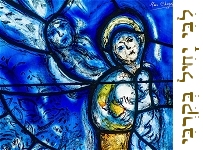
[ "To confess your sins to God is not to tell [God] anything [God] doesn't already know. Until you confess them, however, they are the abyss between you. When you confess them, they become the bridge." - Frederick Beuchner ]
06.16.23 (Sivan 27, 5783) Sin is not the result of not knowing what is right, but rather of being unwilling to understand such, and therefore is the refusal to do what is right. It is not the result of ignorance but rebellion. Sin doesn't say "I can't" but rather "I won't," and therefore it is a matter of the will, the heart, the secret desires of the soul... Just as grace is inaccessible for someone who refuses to be honest with himself, so is forgiveness. If a person refuses to confess the truth about his condition, salvation itself is impossible, since God literally cannot save the soul that denies its need for Him. Therefore the Scripture does not vainly declare: "Whoever conceals his transgressions will not prosper, but the one who confesses and forsakes them will find mercy" (Prov. 28:13).
מְכַסֶּה פְשָׁעָיו לא יַצְלִיחַ
וּמוֹדֶה וְעזֵב יְרֻחָם
me·kha·seh · fe·shha·av · loh · yatz·lee'·ach
oo·moh·deh · ve·oh·zeiv · ye·roo·cham

"One who conceals his transgressions will not prosper,
but the one who confesses and forsakes them will find mercy."
Hebrew Study Card

Click to listen and learn the Hebrew text:
A person who "conceals" or "covers" his sin denies it, either by outright disavowal or by explaining it away by offering self-deceptive excuses. This person simply cannot prosper – in the spiritual sense of the word – because he is not living in reality... Indeed, his conscience is burdened with a "secret ban," an inner voice of condemnation that must be suppressed and squelched. As Alan Redath commented: "Willful sin that has not been confessed and forgiven that makes us feel that God has forsaken us, for that sin causes Him to hide His face from us." It is only when the person who comes to the light, who acknowledges the truth of his sin and who is anxious to be free of its effects, who will be shown mercy (i.e., rachamim (רַחֲמִים), which comes from the word rechem (רֶחֶם), "womb").
In this evil world, it may sometimes seem that crime "pays," but certainly not before the Divine Presence, and in the world to come, every word and deed will be fully accounted before the bar of God's justice and truth. But even in this world, the sinner is secretly haunted by his conscience; he is driven to madness, hidden despair, and lives in dread and anxiety over the truth he conceals... It has been said that the problem with "getting away with it" is that you indeed "get away with it," meaning that your sin will follow you as doggedly as your own shadow in this world... Ultimately sin is a form of cowardice, since it hides in fear from the light of truth. Unconfessed sin leads to anxiety, paranoia, and weakness of the soul...
"What is done through lies can assume the mask of truth; what is accomplished through violence can go in the guise of justice, and for a while the hoax may be successful. But soon people realize that lies are lies at bottom, that violence is violence - and both are damned." (Martin Buber)
I mentioned recently that one of the reasons God revealed the Ten Commandments was because it was His way of saying, "I know who you really are, I see you..." This is why the people drew back in terror, because they realized that God saw the inner condition of their heart, exposed it, and shined the light of moral truth upon it. Nonetheless it is a great and ongoing credit to the Jewish people that they were willing to receive the revelation at Sinai, since it demonstrates that they were genuinely willing to be honest with themselves. Despite their many subsequent failures, they still revered the truth of God's Torah and meticulously preserved the revelation for future generations (Rom. 3:1-2).
Joshua and Yeshua...

06.16.23 (Sivan 27, 5783) In our Torah reading for this week, parashat Shelach-lekha, we read that before he sent out the leaders of the tribes to spy out the land of Canaan, Moses renamed his trusted servant Hoshea (הוֹשֵׁעַ) to Yehoshua (יְהוֹשֻׁעַ), appending the letter Yod (י) to make his name begin with a divine prefixive (יָהּ־). The Talmud (Sotah 34b) states that Moses did this because he foresaw the treachery and faithlessness of the spies and he therefore appended the Yod to remind Hoshea that YHVH (יהוה) must come first. This renaming of Hoshea, however, was certainly prophetic, since Joshua was chosen to be the successor of Moses who would finally lead the people into the promised land. Notice that the name Yehoshua (i.e., Joshua) and Yeshua (i.e., Jesus) come from the same root (i.e., yasha: ישׁע) meaning "salvation" or deliverance (in the Greek LXX, Joshua is spelled Ιησους, the same spelling for Jesus in the New Testament). Indeed, in the Book of Nehemiah, Yehoshua is explicitly called Yeshua (יֵשׁוּעַ), the name often transliterated as "Jesus" (Neh. 8:17).
There are a number of similarities between Joshua and Jesus given in the Torah. For example, Joshua was a descendent of Joseph from Ephraim (lit., "double fruit"), and Yeshua came as Messiah ben Yosef, the "son of Joseph" who would come from Bethlehem of Ephrata (אֶפְרָתָה), a term that also means "fruifulness." Joshua was Moses' faithful companion at Sinai (Exod. 24:13) and overseer of the "Tent of Meeting" (אהל מועד), taking every opportunity to be near God's presence (Exod. 33:11). He was a capable commander of the armies of Israel who regularly routed the enemy in battle (Exod. 17:9, etc.). Joshua was truly humble and of impeccable moral character, a true servant of Israel filled with Holy Spirit of God (Num. 27:18). Therefore both Joshua and Yeshua loved God's house (Exod. 33:11; Luke 2:49), both were faithful leaders of Israel (Deut. 1:37-38; Matt. 2:6); and both were directly ordained by God. Moreover, Joshua was tested and found steadfast in his faith (Num. 32:12); he was willing to be "despised and rejected of men" rather than appease the mob, just as was Yeshua. Both Joshua and Yeshua appointed 12 men (Josh. 4:4; Mark 3:16-19); both led the people of God to the Promised Land and engaged in warfare for the Kingdom of Heaven; both performed various miracles; both allotted the inheritance of the LORD to God's people (Deut. 1:38, 3:28), both circumcised the people (Joshua at Gilgal; Yeshua in the Spirit); both married Gentile brides (Joshua is said to have married Rahab, Yeshua married the faithful of the nations), both signified salvation by means of the "scarlet cord," and so on. Moses was the "lawgiver" of Israel who was unable to give rest (salvation) to Israel; that honor was given to Joshua, who brought the people into the promised land after Moses had died on Mount Nebo (see Rom. 7:1-4).
Joshua's full name was "Joshua the son of Nun" (יְהוֹשֻׁעַ בִּן־נוּן). The Talmud notes that the word Nun (נוּן) means "fish," a symbol of activity and life. The first mention of the word is found in Exodus 33:11 in reference to Yehoshua. One application here is to note that Yehoshua, the one who succeeded Moses and was able to enter the Promised Land, was the "Son of Life" - a clear picture of Yeshua our Messiah, blessed be He...
A midrash says that when Yehoshua was born, no one took note, but when he died, all of Israel took note. Nonetheless, the Israelites did not mourn for him properly. One was busy with his vineyard, the other with his field, yet another with his coal. "The Holy One, Blessed be He, therefore sought to make the whole world quake" (Midrash Shmuel 23:7). This is also an apt description of Yeshua as Mashiach ben Yosef, the Suffering Servant, whose birth went unnoticed, but His death and resurrection indeed shook the world!
Hebrew Lesson
Isaiah 9:6 reading (click):
Seeing Life Rightly...
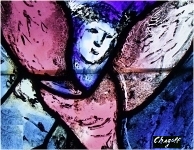
06.15.23 (Sivan 26, 5783) The Hebrew word for "seeing" (ra'ah) is related to the word for "fear" (yirah), suggesting that when we really see life as it is, we will be filled with wonder and awe over the glory of it all. Every bush will be aflame with the Presence of God and the ground we walk upon shall suddenly be perceived as holy (Exod. 3:2-5). Nothing will seem small, trivial, or insignificant.
It is in this sense that we are to serve the LORD with "fear and trembling" (φόβοv καὶ τρόμοv), that is, with an inner awareness of the sanctity and sacredness of life itself (Phil. 2:12-13). Da lifnei mi atah omed. Sin puts us to sleep, numbs our minds and hearts, and blinds us to the radiance of divine revelation. When we see life as it is, with the "eyes of the heart" (Eph. 1:18), we will be filled with wonder and awe over the glory of it all. "Fearing" (יִרְאָה) and "seeing" (רָאָה) will be unified within our hearts... and we will be wise (Prov. 9:10).
Spying Eyes of the Flesh...

[ "In faith there is enough light for those who want to believe and enough shadows to blind those who don't." - Blaise Pascal ]
06.15.23 (Sivan 26, 5783) Which will you choose to believe - the "spying eyes" of the flesh, or the Word and promise of the LORD God Almighty? The "eyes of the flesh" focus on this world and its possibilities (חַיֵּי שָׁעָה) and are therefore unable to discern beyond mere surface appearances. They are easily seduced by superficialities and glitter of this world and its vanities (עוֹלָם הַשֶּׁקֶר). The eyes of faith, on the other hand, "look not to the things that are seen but to the things that are unseen. For the things that are seen are transient, but the things that are unseen are eternal" (2 Cor. 4:18). Faith sees the realm of the invisible (חַיֵּי עוֹלָם): For we "walk by faith, not by sight." We are "saved by hope," but hope that is seen is not hope (Rom. 8:24-25). Faith is the foundation (ὑπόστασις) of things hoped for, the conviction (ἔλεγχος) of things (πρᾶγμα) not seen" (Heb. 11:1).
In our Torah portion this week (Shelach-Lekha), we realize that the redeemed people of God had left Sinai and trekked across the desert of Paran for several days, with their camps ordered in military precision. The Ark of the Covenant was in their midst and the Shekhinah Glory filled the desert skies. Then the people camped at Kadesh Barnea (קָדֵשׁ בַּרְנֵעַ), about 11 days out from Mount Sinai and about three days to the border of the Promised Land... The great promise of Zion was finally within reach!
But then a dark misgiving arose within the heart of the people... fear ... the old whisper of the enemy was heard in the desert wind: "has God really said...?" (Gen. 3:1). Satan is a liar who seeks to take our heart away. He is a bully who first seeks to intimidate us and then attempts to damn us for accepting his lies... Nonetheless, in light of the events of the great Exodus, the mistrust of the people demonstrates that miracles are insufficient to sustain our faith. "An evil and adulterous generation seeks for a sign." Seeing isn't believing, but rather the other way around. Yeshua made this point in His parable of the rich man and Lazarus (Luke 16:19-31). Even if a person should encounter someone literally risen from the dead it wouldn't suffice to impart true faith (Luke 16:31).
The great sin that so angered God to declare: "I swore in My wrath, they shall not enter into My rest..." was not that of the Golden Calf, as dreadful as that was, but rather the sin of unbelief.... "So we see that they could not enter in because of unbelief. Let us, therefore, fear lest, a promise being left us of entering into His rest, any of you should seem to come short of it" (Heb. 3:7-4:2).
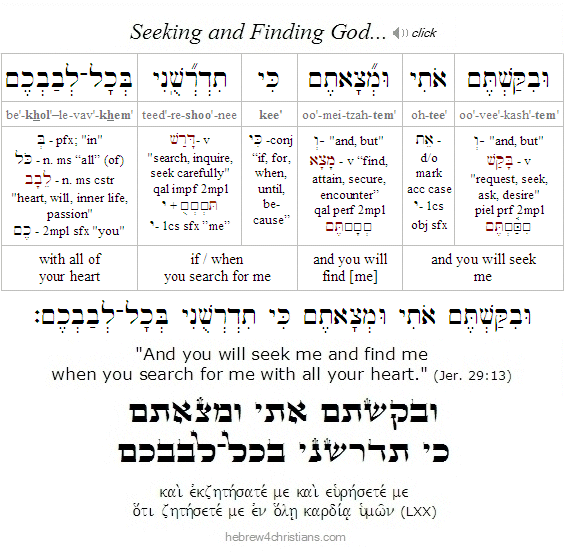 |
Note: For more on this topic, see "Spying Eyes: Further thoughts on Shelach."
The War for Our Souls...

06.15.23 (Sivan 26, 5783) There is a great war going on, but it's not a war waged with conventional weapons. This is the war for the souls of human beings, and every person alive is currently engaged in it... There is no place of neutrality in this war, and you cannot escape from the conflict. The enemy is now at the gate, the battle lines drawn. Pastors are being arrested around the world for holding church services; civil liberties and freedoms are being striped away from us in the name of state "security" for the "greater good." Passivity or indifference is not an option, and therefore each of us must choose. We are either going forward or going backward; we are either drawing near or pulling away (Rev. 3:16). The question is now made urgent: מי ליהוה אלי - mi Adonal aylai? "Who is on the Lord's side?"
The apostle Paul wrote about this great war when he said: "For though we walk in the flesh (i.e., as mortal men), we are not waging war according to the flesh (i.e., in human terms). For the weapons of our warfare are not of the flesh but have divine power to demolish strongholds. We destroy arguments and every lofty opinion raised against the knowledge of God, and take every thought captive to the truth of Messiah" (2 Cor. 10:3-5).
Successful spiritual warfare is waged in the spirit realm, not relying on physical means at all, but trusting in the power of God and the weapons he gives to demolish "strongholds" where evil is deeply rooted (the word "stronghold" is better translated as "fortress," a metaphor for militant prejudice that attempts to justify godlessness). In the profane world, these strongholds are expressed in the reasoning (i.e., λογισμός, "logic") and "arrogant opinions" (i.e., ὕψωμα, pretenses) of the godless heart that are distilled into a dark vanity called "the wisdom of this world" (1 Cor. 3:19). The phrase "every lofty opinion raised against the knowledge of God" refers to the various devices of the heart and mind that erect obstacles to the knowledge of the truth revealed in the Messiah. Such obstacles are affirmed daily in the treacherous news of this world that reinforce godless assumptions and ongoing deception. We must use active discernment to identify the fallacies and misleading schemes promulgated by the world system by "taking every thought captive" to the glorious truth of the Messiah.
This is the good fight of faith (1 Tim 6:12). The fight is "good" because it turns on the victory and glory of the Lord who shares his overcoming life with us. The battle belongs to the Lord; the victory has been secured (Psalm 84:11; Rom. 8:37-39). Always remember that we never fight for, but always from, the place of His victory, standing our ground in the sufficiency of God's power given to us (Luke 10:19). We must be sober and vigilant (1 Pet. 5:8-9); we must stay focused and persevere in the truth (2 Tim. 2:4). God gives us the "armor of light" that blinds the eyes of powers of darkness. We must not be afraid but stand firm in the strength given to us by the Spirit of God (Zech 4:6; Eph. 6:11-18). The Lord will help us in the battle (2 Thess. 3:3; Deut. 3:22). "No weapon that is fashioned against you shall succeed, and you shall refute every tongue that rises against you in judgment. This is the heritage of the servants of the LORD and their vindication from me, declares the LORD" (Isa. 54:17).
Hebrew Lesson:
Psalm 144:1 reading (click):
Blessed Inner Poverty...
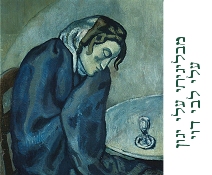
06.14.23 (Sivan 25, 5783) The word ashrei (אַשְׁרֵי) in Hebrew can mean "the happy ones," from the adjective osher (אוֹשֶׁר), "happy," and the root word ashar (אָשַׁר) meaning to "go straight" or to walk uprightly (i.e., yashar: יָשָׁר). Ashrei can also mean "enriched," or favored. Enriched is the man (אַשְׁרֵי־הָאִישׁ) who ... delights in the Torah..." (Psalm 1:1-2). The sages note that ashar is formed from aleph (א), representing the One true God, and sar (שַׂר), meaning ruler, which suggests that when the LORD is the Ruler of your life, you will be enriched and find genuine happiness. Indeed, the word ashrei is embedded in both the first and last words of the Torah scroll itself (i.e., bereshit (בְּרֵאשִׁית) and Yisrael (יִשְׂרָאֵל)), which hints that we are made happy when we submit to God's will (i.e., his Torah) for our lives...
The Torah of the LORD is most clearly manifested in Yeshua, the Living Torah and Messiah of God, the Wisdom of God: "And he opened his mouth and taught them, saying: 'Blessed are the poor in spirit, for theirs is the kingdom of heaven'" (Matt. 5:2-3). Paradoxically we are profoundly enriched by understanding our great inner poverty and our ongoing need for divine intervention... Only when we come to the end of ourselves, when we realize our powerlessness and radical insufficiency, can we come to know Yeshua as moshia (מוֹשִׁיעַ), as our Savior. And this is an ongoing state of dependency: we walk "with a limp" as did Israel. Therefore Paul said, ὅταν γὰρ ἀσθενῶ, τότε δυνατός εἰμι: "for when I am weak, then I am strong." You are made rich indeed when you encounter your spiritual bankruptcy, brokenness, and must entirely depend on God for your daily miracle...
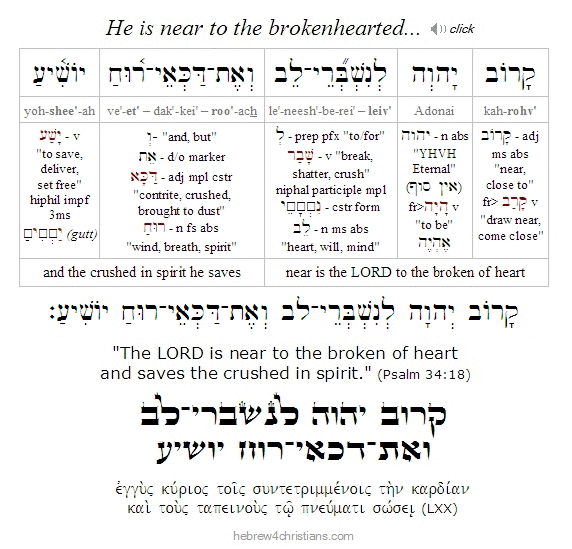 |
Spirituality often enough involves a sense of irremediable brokenness, a feeling that you are not whole, that you are a mess, and that your need for God's healing is constant and relentless... Contrary to the ideals of proud humanism, spirituality is a state of "blessed neediness," of being "poor in spirit," that aches with inner desperation for God's power of healing. Those who humbly cry out to the LORD understand their great need for deliverance, "Woe is me, for I am ruined..." (Isa. 6:5). As Yeshua said, "Everyone who exalts himself will be humbled, but the one who humbles himself will be exalted" (Luke 18:14).
Our Lord Yeshua testified: "The Son of Man came to seek and to save the lost" (Luke 19:10), and therefore He is found in the midst of the leper colonies of the hurting, the forgotten, and the rejected. As the "Man of Sorrows" (i.e., ish makhovot: אִישׁ מַכְאבוֹת) he understands the language of our pain (Isa. 53:3).
Days of Noah Revisted...

06.13.23 (Sivan 24, 5783) Our Lord told us: "For as were the Days of Noah (ימֵי נחַ), so will be the coming of the Son of Man. For as in those days before the flood they were eating and drinking, marrying and giving in marriage, until the day when Noah entered the ark, and they were unaware until the flood came and swept them all away (οὐκ ἔγνωσαν ἕως ἦλθεν ὁ κατακλυσμὸς καὶ ἦρεν ἅπαντας). Likewise, just as it was in the days of Lot - they were eating and drinking, buying and selling, planting and building, but on the day when Lot went out from Sodom, fire and sulfur rained from heaven and destroyed them all - so will it be on the day when the Son of Man is revealed" (Matt. 24:38-9; Luke 17:28-30).
So what were these "Days of Noah" like? What can we say about the "Generation of the Flood"? Yeshua explained that the "days of Noah" were marked by people who were asleep, blind, and unaware (ἔγνωσαν, "agnostic"). They went about their business willfully ignorant of the spiritual reality around them. For ten consecutive generations -- from the creation of Adam until the generation of Noah -- people progressively became more and more ignorant of spiritual reality and truth. Eating and drinking, romantic intrigue and marriage, buying and selling, and other worldly affairs were the preoccupations of the day. In short, people lived their lives oblivious to the spiritual reality all around them. They "forgot" who God was, who they were, why they existed, and where they were going. In short, they were "unaware."
The deadening effects of sin leads to moral and spiritual blindness that leads to corruption and unthinking brutality and violence. Of Noah's generation it was written "The LORD saw that the wickedness of man was great in the earth, and that every intention of the thoughts of his heart was only evil continually. And the LORD regretted that he had made man on the earth, and it grieved him to his heart... the whole earth was corrupt before God, and filled with violence" (Gen. 6:5-6, 11). Rashi understood the word "corruption" (shachat) to primarily refer to sexual immorality (i.e., idolatry) and "violence" (chamas) to primarily refer to theft and robbery. In general, however, the sages regarded the word chamas to refer to lawlessness, that is the denial of Torah, and consequently the benighted condition of living without yirat ha-shamayim (the fear of heaven). When people are spiritually dead, they are unconscious of the wonder of God; oblivious to what is real; and they are consequently debased into animals... We see that in our world today.
Far from being "set free" by throwing off the "shackles" of the law, people are debased and brought into deeper darkness (Rom. 1:26-28; 2 Pet. 2:12). True freedom is not the power to do whatever you want but the power to choose what is right. "Right" and "wrong" are not subjective preferences but objective spiritual judgments indicated both by human conscience but more importantly though revelation of the Torah. Despite claims by foolish thinkers like Frederick Nietzsche, moral truth is not malleable and subject to change. Just as human beings are subject to various physical laws to exist, so they are subject to moral laws. A person can no more murder another and escape the consequences than he can step off the ledge of a skyscraper and not fall to the earth.
The chaos we see in the world today is the result of years of social engineering and propaganda. From their youngest age children have been indoctrinated to believe that there is no God, that there is no transcendental moral authority, and that there is no objective truth about anything. Everything is relative and perspectival, and it is impossible to judge one subjective perspective to be better or worse than another... As a result we are "reaping the whirlwind" and the impulse to destroy is the final expression of this solipsistic and nihilistic ideology. Of course this destruction will be quickly followed by a "new regime" that eventually will enslave all of humanity under the reign of the anti-Christ.
The late Rabbi Levovitz, leader of the Mir Yeshiva, was in Poland before World War II and he saw the German preparations for the concentration camps. Regarding this he said, "The Jews stopped believing in Gehinnom (hell) so Hashem decided to bring Gehinnom into the world. Not the whole Gehinnom, but a little bit of it, a foretaste, a little bit of Gehinnom" (Purim derasha, 1981: Avi Miller). The moral chaos and anarchy we see today is likewise a foretaste of Gehinnom - the reign of terror to come otherwise known as the Great Tribulation....
There is hope, of course. We can and we should pray for the lost to turn to God and be delivered from their demonic fears and rage. And there is a new world coming! Not the "new world order" being prepared by techno-fascist globalists for the anti-Christ, but a truly new world. The chaotic violent and sick world we live in today will be dissolved when our King comes to rule the earth (Psalm 2). Our Lord can come in a blink of an eye. We are now in a state of preparation to herald our king, and that means keeping our hearts directed to his reality and truth. We must not shrink back now - we must affirm the truth and be bold in our witness. Time is short, chaverim.
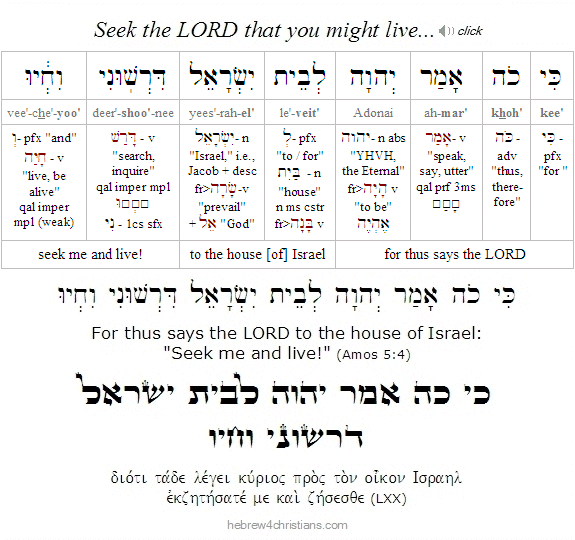 |
Small in our Eyes...
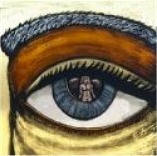
06.13.23 (Sivan 24, 5783) Our Torah portion for this week (i.e., Shelach-Lekha) is a "heavy one" since it reports the "Sin of the Spies" (i.e., chet ha'meraglim: חטא המרגלים) and the subsequent failure of the people to believe that the Lord would take care for them. The people's lack of bittachon (trust) in God is the most serious sin recorded in all the Torah, even more serious than the sin of the Golden Calf (i.e., chet ha'egel: חטא העגל). This is confirmed by the testimony of the New Testament, which presents the fate of the Exodus generation as the dire warning of apostasy for those who claim to follow the Messiah (see Heb. 3:7-4:2).
Trust, then, is the central issue, though in order to trust God, you must believe that you are valuable to Him and that He genuinely desires relationship with you... God redeemed you so you could know and love Him (Isa. 43:1). In this connection it is important to notice that the spies said, "we were in our eyes like grasshoppers" (Num. 13:33). They felt small because they had forgotten the reason for their redemption - they had forgotten how much they meant to God! Their lack of self-respect made them feel unworthy of the inheritance. The sin of the spies was not simply that they doubted they could overcome the "giants in the land," but rather that they were worthy people in God's eyes... Sadly the spies view of themselves was more real to them than God's view of them, and that is why they added, "and so we were (like grasshoppers) in their eyes." From a spiritual point of view, this was profoundly tragic..
One lesson we can learn from the unbelief of the spies is that we must be careful to esteem ourselves properly. We are created be'tzelem Elohim (in the image of God), and that is the starting point for everything else revealed in the Torah. This foundational idea may be expressed as "respect precedes Torah." Self-esteem and self-worth are very important characteristics because they enable the soul to receive the Word of God. This isn't a selfish, narcissistic type of love. If you have no self-worth, then it is likely you will believe the promises of Scripture are for other people, but not for you. You will regard yourself as an "outsider" or "alien" who is without promise of inheritance. So we have to begin there, with the fact that God created you in His image and therefore you are of infinite value. You matter to God - and therefore you must respect yourself. It is no mark of holiness to shame or belittle yourself - notwithstanding your sinful nature - since you have a duty to honor yourself as one of God's created children. Dishonoring yourself violates the central ethical commandment of the Torah: "You shall love your neighbor as yourself" (Lev. 19:18). How can you respect others if you don't respect yourself? You will regard yourself as "insect like" and will tend to view others as "gigantic" threats; you will act defensively and walk in fear of other people.... This is the path of a person living in a prison of fear, and it is a type of hell. Trusting in God's personal love for you presupposes that you are worthy to be loved and that there is a divine inheritance for you. This gives you real courage to go take possession of the land as its rightful heir. Trusting in God means regarding God's view of you as more real than your own. It means allowing yourself to be "drawn close" so that you can be in a genuine love relationship with your Heavenly Father. "From now on, therefore, we regard no one (including ourselves) according to the flesh..." (2 Cor. 5:16).
We "walk by faith, not by sight," which means we must take hold of the promise of God, even in a world that "devours its inhabitants" and that is filled of seemingly invincible giants... Faith believes the possible, even in moments of testing and struggle. As Yeshua said, "All things are possible for the one who believes" (Mark 9:23).
"God is able to make all grace overflow to you, so that having all sufficiency in all things at all times, you may overflow in every good work" (2 Cor. 9:8). May it please God our Heavenly Father to help us esteem ourselves properly so that we can receive, abide in, and walk in the reality and presence of His overflowing love. And may the LORD keep us all from the terrible sin of unbelief by always remembering that we infinitely matter to Him. Amen.
Hebrew Lesson
Isaiah 43:1Hebrew reading (click):
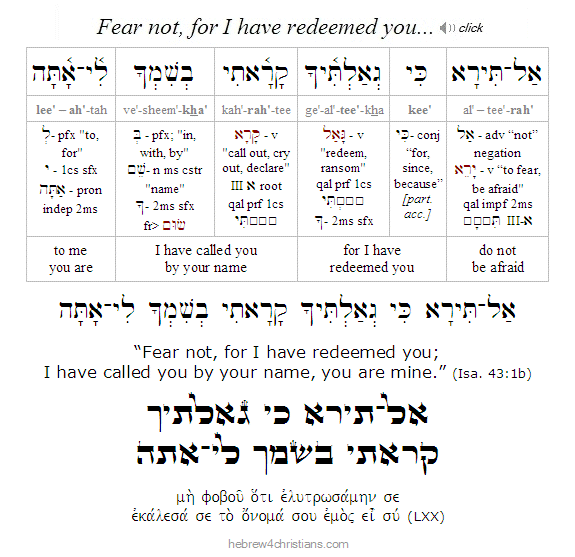 |
Blessed Heart Connection...
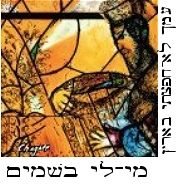
[ "Has there not been, sometimes, this temptation to do a great deal for Christ, but not to live a great deal with Christ?" - Charles Spurgeon ]
06.12.23 (Sivan 23, 5783) "I love the LORD, because he has heard my voice and my supplications. Because he has turned his ear to me, I will call upon him as long as I live" (Psalm 116:1-2). This is the testimony of a heart in communion with God after undergoing affliction, a heart fluent in meaningful conversation with him, and it is also the testimony of the Lord who offers communion with the afflicted, who "turns his ear" to engage the soul in meaningful relationship with him.
During times of pain or mental anguish prayer becomes spontaneous, raw, unscripted and devoid of empty words. Anguish moves us right to the point, bypassing other concerns, distilling the heart's cry for God's help. If you feel overwhelmed, pour out your heart in prayer... It is not the words of the prayer that matter as much as it is the fervor, the intensity of the heart, and the passion that yields itself before God.
An honest prayer life involves sharing both the good and the bad about who we are and what we experience. We are called to love God "bekhol levavkha" (בְּכָל־לְבַבְךָ) with all our heart, and that means both our "good heart" (לב טוב) as well as our "bad heart" (לב רע). As the prophet Jonah testified: "I called out because of my trouble to the LORD, and he heard me; from the belly of hell I cried and You heard my voice" (Jonah 2:2). We cry out from our depths regarding our fears, our anger, our disappointments, our wounds; we ask for God's help and strength; and we also offer heartfelt praise and thanks for the hope he gives us, for the courage we need to press on, and for his great love that sustains us.
And we pray for others as well, expressing our care for them and for their lives; we act as a voice crying on their behalf, in their distress and need, trusting in God's care and deliverance for them. Such intercession is an act of sacrificial giving that honors God's heart and will.
Our communion with God is the basis of our fellowship with one another. In humility we confess our faults to one another, we share our experience and strength, and we offer consolation to those who are hurting. Our heart connection with God is primary, however, since we cannot give to others what we do not have ourselves, and therefore we first draw close to God to know his heart in order to serve as his priests and ministers to others.
In the midst of his struggle, King David asked the LORD: "How long shall I take counsel in my soul, having sorrow in my heart daily?" (Psalm 13:2). The sages answer that one must cry out to God over and over, casting your burden upon him, and relying on Him alone. As long as you think your own counsel will be your deliverance (יְשׁוּעָה), however, there will be "sorrow in your heart daily," since there is no true salvation apart from the grace and power of God. That is why David finally affirmed, "My heart shall rejoice in Your salvation" (Psalm 13:5) rather than "my heart shall rejoice in my salvation," since authentic salvation is of the LORD (לַיהוָה הַיְשׁוּעָה) and not from the counsel of the soul...
Hebrew Lesson
Psalm 16:1-2 reading (click):
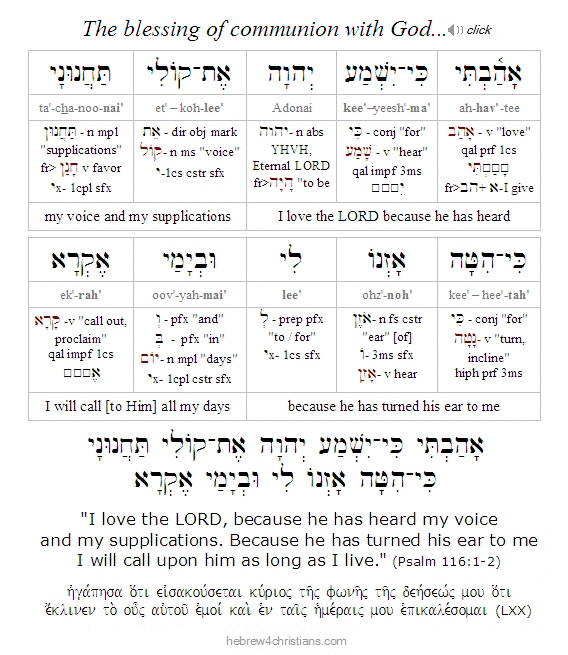 |
Overcoming Anxiety...
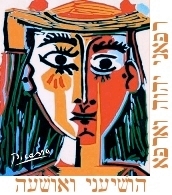
06.12.23 (Sivan 23, 5783) Why do we often feel anxious? Why are we filled with unease and worry about what might happen to us? Is it not because everything seems out of our control? The world around us seems threatening and unstable; our interpersonal relationships are fragile and vulnerable; our bodies are sometimes sick and faltering; we grow despondent, lonely, and grieved. Time relentlessly passes and dissolution seems omnipresent; we feel distressed, swallowed up, overwhelmed, and powerless: the smoke and ashes from our depths....
Now while it is true that everything is out of our control, it is not true we are utterly alone, the victims of unhappy chance and sorrowful fortune, for we find life in relationship with a loving God who has repeatedly told us that he is with us always, through all the byways and valleys, and that he will never leave nor forsake us. The Lord has promised to shepherd us through the present darkness; he is the ground of our being, the place of our refuge.
We do not deny reality or pretend that we are not in struggle between hope and despair. But while it is true that we are in a world that is frightening and uncertain, we are given strength by God to walk in shalom here, to bear witness of his radiant light. We are "in" but not "of" the world -- a realm that God has subjected to vanity in order to redeem it to a heavenly and eternal hope (Rom. 8:20). You are not alone, friend; you are part of God's blessing. The Lord is with you and he provides you sure refuge and abiding comfort in the midst of the storm. God is always between you and your wounds...
Just as humanity was plunged into darkness through unbelief, so we are brought to the light through faith in God's deliverance. Therefore hold fast to hope, and keep the fire of your heart burning, friend... Rabbi Nachman once told a person who was struggling with his faith: "It is written that all creation was brought into being because of people like you. God saw there would be people who would cling to our holy faith, suffering greatly because confusion and doubt would plague them. God perceived that such would overcome these doubts and troubles of heart and remain strong in their belief. It was because of this that God brought forth all creation." Amen. Repudiate anxiety and never yield to despair, since that leads to further darkness and fear. "Do not be anxious (i.e., inwardly divided, two-hearted) over anything, but in every thing by prayer bring your needs before God with gratitude, and the peace of God that surpasses all understanding (שלום אלוהים העולה על ההבנה) will guard your hearts and minds in Yeshua the Messiah (Phil. 4:6-7).
Press on and keep fighting the "good fight" of faith (1 Tim. 6:12). When the aapostle Peter lost courage at the sight of the swelling waves, Yeshua reached out his hand and took hold of him, saying, "O you of little faith, why did you doubt (lit., think twice)?" Remember that you infinitely matter to heaven; your life has great value; you are significant and you are truly loved by our Heavenly Father. "The LORD your God goes with you to fight on your behalf against your enemies to give you victory" (Deut. 20:4).
We are not alone; God will help us get through... "I am sure of this, that he who began a good work in you will bring it to completion (ἐπιτελέω) at the Day of Yeshua the Messiah" (Phil 1:6). The LORD is able to guard you (φυλάξαι) from stumbling and to present you blameless before the presence of His glory with great joy (Jude 1:24). "The LORD upholds all who are falling and raises up all who are bowed down" (Psalm 145:14). "He will sustain you to the end, guiltless in the Day of our Yeshua the Messiah" (1 Cor. 1:8). He who calls you is forever faithful; He will surely do it (1 Thess. 5:24). Yea, "the Lord is faithful (נֶאֱמָן הוּא): He will establish you and guard you against the evil one" (2 Thess. 3:3). The Spirit says, "Fear not, for I AM with you always." Amen and amen.
Hebrew Lesson
Isaiah 41:10 reading (click):
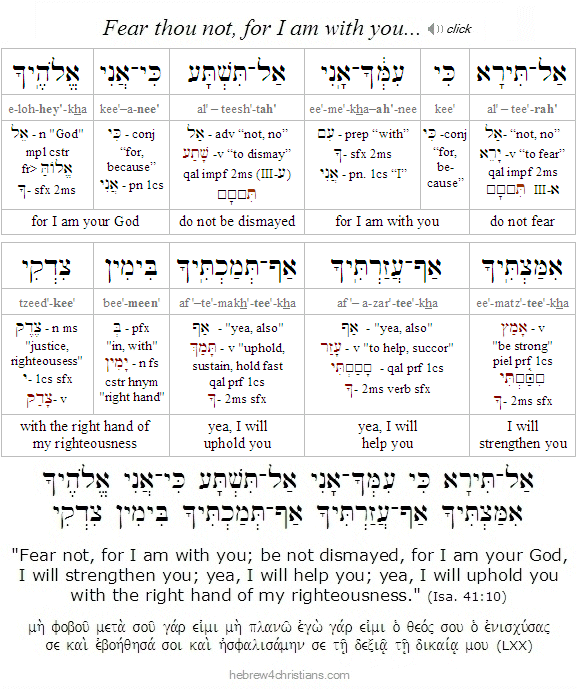 |
Visions of the Far Country...

06.11.23 (Sivan 22, 5783) When he was asked when the kingdom of God would come, Yeshua answered: "The kingdom of God is within you" (Luke 17:21). The Pharisees were looking for an earthly kingdom, something political, something of this world, but Yeshua taught that the kingdom of God was a matter of the heart - an inner reverence, a spiritual awakening, a rapturous mystery, a supernatural peace.... "Seek first the kingdom of God and his righteousness, and all these things shall be added to you." The righteousness of God given in Messiah reveals the kingdom of God to the seeking heart, but those who do not esteem the King will be unable to discern the secret grace of his kingdom. The question is not about an outside dominion but whether the divine life and Spirit reign within you.
Hebrew Lesson
Isaiah 33:17 reading (click):
Parashat Shelech-Lekha...

06.11.23 (Sivan 22, 5783) Shavuah Tov, friends. Our Torah reading for this week, Shelach Lekha (שלח־לך), recounts how Moses sent twelve spies from the desert region of Kadesh into the land of Canaan to search it out and give a report of its condition. The spies returned 40 days later extolling the land, saying that was indeed fruitful and zevat chalav u'devash (זבת חלב ודבשׁ), "flowing with milk and honey." However, ten of the spies also gave a discouraging report, expressing their fear that the people could not conquer the land. Only Joshua (יהושע) and Caleb (כלב) kept faith in God's promise.
Upon hearing the report of the ten spies, however, the people rebelled and cried out to return to Egypt. Angered by their lack of faith, God sought to destroy the people, but Moses interceded on their behalf. The LORD then decreed to lengthen the Israelites' wandering in the desert to 40 years -- one year for each day the spies were in the land -- until all of the faithless over the age of 20 would die in the desert, except for Joshua and Caleb, the two spies who kept faith with the LORD. After hearing the judgment of God, a group of remorseful Israelites decided to "repent" by taking matters into their own hands. Without either the "Ark of the Covenant of the LORD" or Moses' leadership, they presumptuously decided to storm a mountain on the border of land but were decisively routed by the Amalekites and Canaanites.
If last week's Torah might be called "sefer kvetch" (the book of complaint), this week's Torah reveals the fateful outcome... The people's lapse of faith in God's power serves as a profound and very sober warning, and indeed is a primary warning regarding the dreadful sin of unbelief in the New Testament (see Heb. 3:7-4:11). Indeed, Jewish tradition states that the decree that "none of the men who had seen my glorious Presence and my signs I performed in Egypt and in the desert will see the land that I swore to give to their fathers" (Num. 14:22-23) was given on the Ninth of Av (i.e., Tishah B'Av), and was prophetic of the destruction of the Temple and the worldwide exile of the people from the Promised Land. The sin of unbelief may rightly be regarded as the "unpardonable sin" of the Torah...
The tragedy of the sin at Kadesh ultimately has a happy resolution, however, since the LORD is never thwarted by man's sin and weaknesses. After the 38 years of exile were complete, Moses' faithful successor Joshua sent a second spying expedition to the promised land, though this time God led the spies to a prostitute named Rahab (רחב), a direct ancestor of Yeshua the Messiah, who later identified her faith in the LORD's victory by displaying the scarlet cord (i.e., chut ha'sheni: חוט השׁני) during the fall of Jericho (Joshua 2). Rahab was the (grand)mother of Boaz, who later married Ruth, the great grandmother of King David. May God likewise give us courage to walk in the power of His promises, even if our present circumstances seem daunting. May the LORD clothe each of us with the "spirit of David" to stand before all the giants of the land who defy the LORD and His power.
Acharit Hayamim:
Near the End of Days...
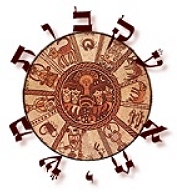
[ "For this time it will be God without disguise; something so overwhelming that it will strike either irresistible love or irresistible horror into every creature. It will be too late then to choose your side." - C.S. Lewis ]
06.09.23 (Sivan 20, 5783) Shalom friends. Our Lord foretold that in the "end of days" there would be perilous times -- moral, political, ethnic, and spiritual chaos throughout the world, "as it was in the days of Noah." Of Noah's generation the Torah says: "The LORD saw that the wickedness of humanity was great in the earth, and that every intention of the thoughts of his heart was only evil continually, so that it grieved the LORD to his heart" (Gen. 6:5-6). Yeshua further said the time would be "like the days of Lot" where the people of Sodom lived lawlessly, celebrated sexual anarchy, and were destroyed suddenly in fiery judgment from heaven (Gen. 19:4). Indeed, Paul's description of the character of people before the time of the end is chillingly accurate of our present generation (see 2 Tim. 3:1-7).
With the increasing rise of anarchy and godless tyranny throughout the nations, the Scriptures further foretell the rise of a governmental system that would oppress and subjugate the entire world, using surveillance systems and devices to control every aspect of life, so that no one would be able to buy or sell without being tagged as an compliant member of the system. Once a global (cashless) currency system has been established, the prophesied "man of sin" would then arise to embody the presence of Satan on the earth, in mimicry of the advent of the true Messiah.
At first this "man of sin" (איש החטא) will seem to be a man of peace but after his reign is secured, his malice will be revealed by openly persecuting those who still believe in the one true God, causing great tribulation, particularly for the Jewish people. The rise of this "Messiah of Evil" or the "anti-Christ" will be in accordance with the great vision of the prophet Daniel, wherein the final "week" of "seventy weeks of years" is fulfilled...
Presently we are living in the "gap" between the 69th week and the 70th week of years, but we see signs that the gap is now closing, and soon the world will enter into the "tribulation" period... As things get closer to the time of great judgment (יום יהוה), followers of Messiah will be forcefully removed by God's hand (i.e., raptured) either before the tribulation proper begins ("pre-trib"), or perhaps just before the Great Tribulation period ("mid-trib"), the later view being argued because followers of Yeshua will see the rise of the man of sin (2 Thess. 2:3-4). Either way, however, God has not appointed his followers to undergo the unleashing of his wrath upon the world system during the last half of the seventieth week (1 Thess. 5:9), so "post-trib is not a sound eschatological option. The rapture will occur as we are gathered together with the LORD to meet him in the air (1 Thess. 4:16-17).
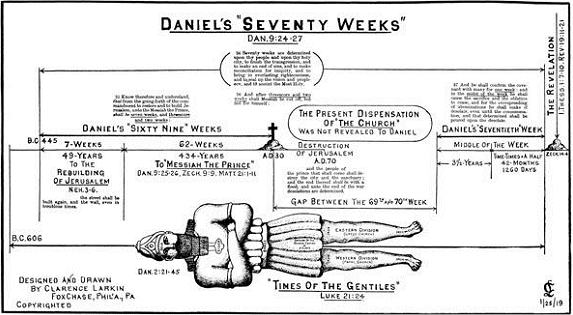 |
The 70th week of the vision will begin when the "man of sin" appears to make a "covenant" with the people of the world, though he will later set up an "abomination" and force all world citizens to bow down to its image (perhaps similar to Nebuchadnezzar's insanity to force people to bow down before the golden image of himself; at this time the rapture of followers of Messiah may occur). Like Daniel's three friends who refused to bow down before the image, many will refuse to comply and outright worldwide persecution of the Jewish people will take place. This is called the "time of Jacob's trouble" and the "Great Tribulation." Satan will rule only "until the end that is decreed is poured out on him" and then the great Day of LORD will seal his doom with the second coming of Yeshua (as described in Rev. 19:11-21).
So, in light of this (very brief) sketch of what is coming -- and as the world system becomes more and more tyrannical as it prepares for the arrival of the "messiah of evil" -- how are you walking out your faith? Spiritual warfare is not "optional" for a follower of Yeshua. How are you keeping free of fear or anger? How are you preparing for the days ahead?
Remember that the evil one "lives" to devour souls, as it is written: "Be sober-minded; be watchful. Your adversary the devil prowls around like a roaring lion, seeking someone to devour" (1 Pet. 5:8). The apostle Paul lists the panoply of armor required for our struggle: "Put on the whole armor of God, that you may be able to stand against the schemes of the devil. For we do not wrestle against flesh and blood, but against the rulers, against the authorities, against the cosmic powers over this present darkness, against the spiritual forces of evil in the heavenly places. Therefore take up the whole armor of God, that you may be able to withstand in the evil day, and having done all, to stand firm. Stand therefore, having fastened on the belt of truth, and having put on the breastplate of righteousness, and, as shoes for your feet, having put on the readiness given by the gospel of peace. In all circumstances take up the shield of faith, with which you can extinguish all the flaming darts of the evil one; and take the helmet of salvation, and the sword of the Spirit, which is the word of God, praying at all times in the Spirit, with all prayer and supplication" (Eph. 6:11-18). In another place Paul refers to this as the "armor of light" (Rom. 13:12). James the Righteous (יעקב הצדיק) gives us remedy by saying: "Submit yourselves therefore to God. Resist the devil, and he will flee from you" (James 4:7).
We are to walk "in truthful speech, and the power of God; with the weapons of righteousness for the right hand and for the left" (2 Cor. 6:7). Let us wear the armor of light (ὰ ὅπλα τοῦ φωτός), being sober (i.e., νήφω, "calm and of sound mind") putting on the breastplate of faith and love; and for an helmet, the hope of salvation" (1 Thess. 5:8). "Therefore, preparing your minds for action, and being sober-minded, set your hope fully on the grace that will be brought to you at the revelation of Yeshua the Messiah" (1 Pet. 1:13).
Hebrew Lesson
Zephaniah 1:14 reading (click):
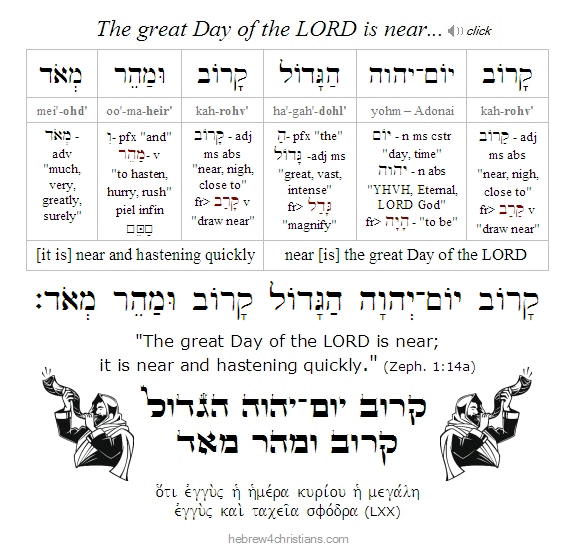 |
Our Seeking Shepherd...

06.09.23 (Sivan 20, 5783) "Those who are well have no need of a physician, but those who are sick" (Matt. 9:12). Even though we are weak, sickly, broken, and sinful people, we must never lose hope and begin to fear that we are worthless in the eyes of heaven... Indeed, our infirmities are often a blessing in disguise, a gift that reveals our need...
If you are sinful and sick, you are invited to come before the Master for life and rescue from the power of sin. Take your place among the lepers, the tax collectors, the outcasts... you will never hear Him criticize you or shame you for sincerely coming to Him for healing of your sinful state... "For the Son of Man came to seek and to save the lost" (Luke 19:10).
Yeshua is the Good Shepherd (הָרעֶה הַטּוֹב) who leaves his "flock of 99" sheep to find the one sheep who is lost (Matt. 18:12-14). He is always like that – He is always seeking and saving the lost sinner; He is always offering life and healing to those who have been made sick with the plague of sin. Thank God we have a Savior who seeks us out in our desperate need!
Hebrew Lesson
Ezekiel 34:16a reading (click):
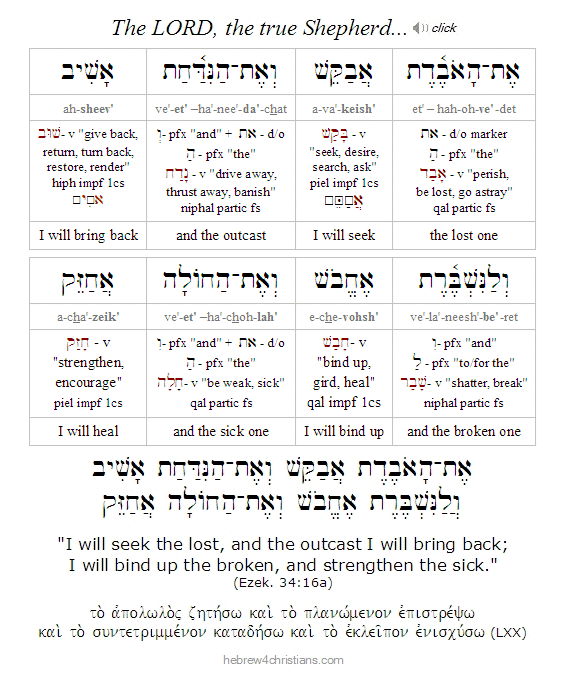 |
King David wrote, "You have given those who fear you a banner (נֵּס לְהִתְנוֹסֵס) for the sake of the truth" (Psalm 60:4), which Rashi interprets as, "You have given hardships and suffering to those who fear you to elevate them in the way." Indeed the word nes (נֵּס) can mean "banner" (as on the mast of a ship), a "sign" (or miracle), or a "test" (nisayon). God tests those who fear Him in order to help them become a miraculous sign to the world at large. Ultimately, the sign or miracle is the gift of Messiah's suffering on our behalf and His resurrection for our justification (Isa. 11:10). Even in the face of our enemies who have breached the land, we have the promise of victory in Adonai Nissi (יְהוָה נִסִּי), God my Miracle.
May you, broken and contrite one, hear the word of His hope calling out for your soul... He is your Shepherd, your Healer, and your Miracle. May you come beneath His banner of truth and love to find eternal refuge.... Amen.
Hebrew Lesson
Isa. 40:11 reading (click):
Beha'alotekha - "Sefer Kvetch"

[ A central commandment our Torah reading this week is "Thou Shalt Not Kvetch," or, to put it positively, "Thou Shalt be Grateful." Please read the portion to "find your place" here. ]
06.09.23 (Sivan 20, 5783) Some of the sages have called this week's Torah portion (i.e., Beha'alotekha) "Sefer Kvetch," the Book of Complaint, since the very first stage of the journey back to the Promised Land upon departing from Mount Sinai was marked with murmuring, ingratitude, and fantasies about the "good old days" when the people ate "free fish" in Egypt, and so on. The repeated episodes of complaining really were a form of rebellion against God's leadership, as the people blasphemously charged the LORD with folly, incompetence, or even malice ("Why did God take us out of Egypt - to kill us all in the desert?"). Indeed, the spiritual condition of the people was so bad that they were all doomed to die in the desert. The New Testament later identifies the unbelief of the people as a picture of blasphemy of the Holy Spirit (Heb. 3:7-4:6).
Often the Israelites appeared to behave like spoiled children, demanding "real food" and fussing over the miraculous supply of bread that literally came from heaven (manna)... It would be somewhat comical were it not so tragic: Despite all the miracles the people had directly experienced during the great Exodus - including the splitting of the Sea, the Pillar Cloud of Cloud by day and Fire by night, leading to the awesome revelation at Sinai - despite all this - in a little over a year the memory of Egypt had become positively euphoric, and the people "forgot" how degrading their lives were as slaves... They romanticized the way things were, rationalizing that it wasn't "that bad," and savored the taste of their "free fish..."
Therefore a central commandment of this Torah portion is: "Thou Shalt Not Kvetch" (or, put positively, "Thou Shalt be Grateful"). "The deeds of the fathers are signs for the children" (1 Cor. 10:11) and therefore we are sternly warned not to follow the example of those who were redeemed by God's outstretched hand but who later drew back in fear and unbelief, as it is written: "I swore in my wrath, 'They shall not enter my rest.' Take care, brothers, lest there be in any of you an evil, unbelieving heart, leading you to fall away from the living God. But exhort one another every day, as long as it is called "today," that none of you may be hardened by the deceitfulness of sin. For we have come to share in Messiah if indeed we hold our original confidence firm to the end. As it is written, "Today, if you hear his voice, do not harden your hearts as in the rebellion" (Heb. 3:11-16).
Hebrew Lesson
Psalm 95:7-8 Hebrew reading (click):
The Unhappy End of Unbelief...
The price for Israel's unbelief was great... The narrative of Torah was supposed to have ended after the Exodus generation left Sinai to enter the Promised Land with the completed Tabernacle... Unfortunately, things did not work out that way, and "Sefer Kvetch" begins with Numbers chapter 11. According to the Talmud, the scribes marked this "unhappy ending" by putting an "inverted Nun" before and after Numbers 10:35-36 to mark a break in the (ideal) narrative. What should have been written (beginning with chapter 11) was the "happy ending," namely, that the redeemed Israelites successfully entered the land because they kept faith in the LORD's promises. In other words, the account of the sin of the spies, the apostasy at Kadesh, the exile of the Exodus generation, etc., should never have happened. The sages said that marking the text this way affirms that what should have been written (as the happy ending) will one day be so written, after the Messiah comes to finally deliver the Jewish people. For more on this subject, see the article, "The Seven Books of Moses."
Hebrew Lesson
Psalm 14:1 Hebrew reading (click):
Trusting God's Providence...
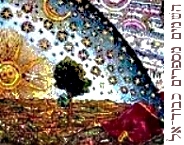
06.09.23 (Sivan 20, 5783) The Scriptures teach us that creation is "teleological," which means that it is "going someplace," and that there is order and purpose to our existence. Your life is not adrift in a random universe that is destined to ultimately fade away but is grounded in the Divine Mind and Will that personally supervises and pervades all things. A lack of emunah (faith) has been likened to a passenger flying on an airplane who doesn't believe there is a pilot in the cockpit... Faith in the LORD believes that a single supreme, all-knowing, all-powerful and benevolent spiritual Power directs all things, and that God is the beginning, middle, and end of all conscious meaning, truth, and substance, as it is written: כִּי הַכּל מִיָּדוֹ הַכּל בּוֹ וְהַכּל לוֹ הוּא, "For from him and through him and to him are all things" (Rom. 11:36). A life of faith in the one true God imparts the blessing of shalom (inner peace) and assures the heart that all shall be made well by the love of God. Everything God does is for the very best, and there are no exceptions to this truth (Rom. 8:28).
Our faith that everything God does is for the best is not some rationalization that denies or minimizes the suffering we encounter in life, but is an affirmation that there is an unseen (though knowable) good at work that ultimately will heal us and comfort our shattered hearts... The phrase gam zu l'tovah (גַּם זוּ לְטוֹבָה) is an affirmation that "this too is for good," and that this "this" includes the various challenges and struggles we face during our days of sojourn here on this earth. Every "down" in life prepares us for an "up," with the ultimate end being beatitude and everlasting joy. Challenges draw us closer to God, igniting our hearts to cry out for his Presence and blessing. Even death itself is a passageway to eternal life (Psalm 16:10; 49:15; 1 Cor. 15:12-58). בַּעֲצָתְךָ תַנְחֵנִי וְאַחַר כָּבוֹד תִּקָּחֵנִי - "You guide me with your counsel, and afterward you will receive me to glory" (Psalm 73:24).
By faith "we know that if the 'tent' that is our earthly home is destroyed, we have a building from God, a house not made with hands, eternal in the heavens" (2 Cor. 5:1). God is our good Shepherd who leads us along the byways of the desert of this world (Psalm 23:4). In God's presence is total and absolute joy; at his right hand there are pleasures forever (Psalm 16:11). As it is written in the sacred testimony of the prophets: "No eye has seen, nor ear heard, nor the heart of man imagined, what God has prepared for those who love him" (Isa. 64:4; 1 Cor. 2:9). The LORD "will wipe away every tear from our eyes, and death shall be no more, neither shall there be mourning, nor crying, nor pain anymore, for the former things have passed away" (Rev. 21:4, Isa. 25:8). God foresees your way and prepares a place for you (John 14:1-3); he has ready a precious white stone with your "hidden" name inscribed (Rev. 2:17); the table is being set and your place has been reserved...
So be encouraged, friend. You do not need to struggle alone – bitter and afraid that you might be swallowed up in your infirmities... God knows the groan of your struggle and invites you to find solace and strength in Him. "It is enough to open your heart the smallest amount - even the width of a pin - to repent, so that you feel a stab within your heart, like a piercing sting in living tissue, not like a needle thrust into dead flesh" (Menachem Mendel of Kotzk). Bittachon (בִּטָּחוֹן) is a Hebrew word that means trust in God... Those who have bittachon do not worry about the future because their faith fully permeates their heart and mind, enabling them to surrender their cares and burdens to the Lord.
Hebrew Lesson
Psalm 23:4 Hebrew reading (click):
Shepherd of your Soul...
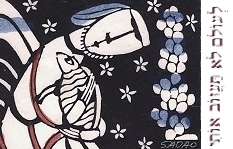
[ "Trust the past to God's mercy, the present to God's love and the future to God's providence." - Augustine of Hippo ]
06.08.23 (Sivan 19, 5783) Whenever you feel oppressed by sorrows, heartache, or fears, say with assurance: "The Lord cares for me." Cast your burden upon Him and he will hold you up. Refuse to stagger beneath the weight of earthly fears...
God cares for you. This is the message of the gospel, after all; this is the meaning of the cross itself: God Himself cares for you.
Consider the one who personally bore your very sins and terribly suffered in anguish for you to be fully forgiven and accepted by Heaven: This beloved one will never forsake you, but indeed forever lives to make intercession for you (Heb. 7:25). Be bold, therefore, to avail yourself before the throne of mercy, where we are given grace to help in time of need.
The Lord has not forgotten you; he will never leave you nor forsake you. He who feeds the birds of the air and tends the lilies of the field will surely provide for your needs. All who belong to him are forever made secure by the indomitable glory of his perfect love.
Let us resist then the whispers of despair. Affirm the greatness of God who watches over your way as the Good Shepherd of your very soul. Even if you are in distress, affirm the greatness of God and confess the truth of His love for you. Overlook the present moment to find refuge in his promise.Trust him to bind up your wounds and heal your broken heart. God is your strength and song! Do not countenance any thought that his grace is not present for your need and troubles. God is forever faithful; his promises are sure; the one who has begun a good work in you will perfect it: press on in confidence of your Shepherd's care...
Hebrew Lesson
Psalm 23:1-3 reading (click):
Finding Right Desire...
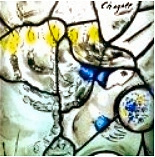
[ "God is always trying to give good things to us, but our hands are too full to receive them." - Augustine of Hippo ]
06.08.23 (Sivan 19, 5783) Our Torah portion this week (i.e., Beha'alotekha) recounts the rebellion of the people during the desert sojourn... Instead of joyfully anticipating the promise of their inheritance, the people grew dissatisfied and bored. The Sefat Emet noted that just after we read how the people complained bitterly to the LORD, they had a "strong craving" (הִתְאַוּוּ תַּאֲוָה), which in Hebrew literally means they "craved a craving."
Moses could tolerate the people's desire for food and water, but when they began to actively cultivate their cravings, lusting after the imaginary "free fish" they enjoyed in Egypt, he began to realize that the problem was deeper, a matter of the heart... Moses understood that what the people really wanted was impossible, since it involved denying who they were as God's redeemed people.
The issue was not about wanting to eat "meat," after all, but rather hungering after the forbidden, desiring to desire, etc. Creating desires, fomenting a sense of deprivation, and choosing to see yourself as a victim, is a lethal sickness of spirit, a disease of the soul. It is a "burning" (i.e., taberah: תַּבְעֵרָה) that destroys inner peace. It is the spirit behind all sorts of addictionsMay God help us understand and seek what truly matters; may he deliver us from self-destruction; and may he help us to be satisfied with the manna he provides! Amen.
Hebrew Lesson
Numbers 11:3 reading (click):
Created for His Glory...

[ "The grace of God means something like: Here is your life. You might never have been, but you are because the party wouldn't have been complete without you." - Frederick Buechner ]
06.08.23 (Sivan 19, 5783) It's been said that God sends each soul into the world with a special message to deliver, a revelation that only he or she can disclose... No one else can bring your message to this world - only you can do this. And since God is entirely unique, you are called to be who you were created to be, not someone else. On his deathbed Reb Zusya said, "I am not afraid that the Holy One will ask me, 'Zusya, why were you not more like Moses?' Rather, I fear the Holy One will say, 'Zusya, why were you not more like Zusya?'
George MacDonald once wrote: "I would rather be what God chose to make me than the most glorious creature that I could think of; for to have been thought about, born in God's thought, and then made by God, is the dearest, grandest and most precious thing in all thinking." Amen. We are God's workmanship in the Messiah; "by the grace of God I am what I am" (xάριτι δὲ θεοῦ εἰμι ὅ εἰμι).
There are no insignificant people in God's eyes, since each soul has been created by Him for His glory and purposes... As C.S. Lewis wrote, "There are no 'ordinary' people. You have never talked to a mere mortal. Nations, cultures, arts, civilizations -- these are mortal, and their life is to ours as the life of a gnat. But it is immortals whom we joke with, work with, marry, snub and exploit - immortal horrors or everlasting splendors" (The Weight of Glory).
Life is a miracle and nothing is trivial. In the world to come you will be shocked to understand that everything you thought, everything you said, and everything you did was given to you from above, and therefore has tremendous significance (Matt. 12:36-37). Therefore may it please the Lord to open our hearts and eyes to truly come alive... Amen.
Hebrew Lesson:
Psalm 119:73 Hebrew reading (click):
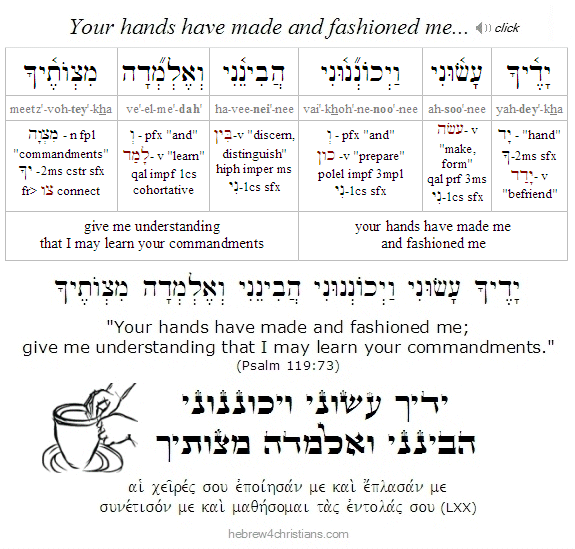 |
Losing and Finding yourself...

[ "The most common form of despair is not being who you are." - Kierkegaard ]
06.08.23 (Sivan 19, 5783) Shalom chaverim. Many of us deal with inner conflicts, self-reproach, and meagerness of faith... It is reported that on his deathbed Reb Zusya said, "I am not afraid that the Holy One will ask me, 'Zusya, why were you not more like Moses?' Rather, I fear the Holy One will say, 'Zusya, why were you not more like Zusya?'" This Hasidic story is interesting because, on the one hand, how could Zusya be anyone other than he is? and on the other, why is Zusya afraid that he is not who he should be? Zusya's parable reveals that there is an inner conflict in his soul. He senses that has not lived as he ought, that he has failed himself (and God), and that he is lost in the rift between the ideal and the real... His struggle, then, is with himself. Who he is and who he thinks he should be are at odds within his heart.
The question of who we are supposed to be haunts us, and consciousness of the failure to practice our ideals leads to a sense of guilt, anxiety, and shame. For those who believe in Yeshua the question is essential to the question of what it means to be an authentic disciple. How are we to live before God and be accountable for what we do? For instance, we read Yeshua's message in the Sermon on the Mount and we eventually realize - if we are honest with ourselves - that it is not within our nature to be able to do as he teaches, and this leads us to a despair not unlike that which Zusya experienced. A divided house cannot stand....
Reb Zusya's despair can be remedied only by overcoming the inner divide through a personal relationship with Yeshua, for salvation is not simply deliverance from the accusations of conscience (i.e., the verdict of the law) but constitutes the healing grace that delivers us from ourselves. Yeshua did not die on the cross to simply take away our sins, but to create within us indestructible new nature that it no longer enslaved to the power of sin. The message of the gospel is that your heart can be - and ultimately will be - transformed by the miracle of God given in Yeshua.
Salvation is not a matter of "religion" or of man's attempt to justify himself by some kind of reformation of character. Yeshua is not the "second coming of Moses," after all. Try as you might to live a "good life," keep the commandments, and aspire to elevate yourself spiritually, you will eventually come to realize that it is impossible to change yourself. You will then be faced with a decision: either to deceive yourself about who you are, or to be honest and confess your wretched and hopeless condition. This is the "lawful use of the law," that reveals the "ought-to-be" self, so that the gap between the ideal and the real becomes unsurpassable, and we know ourselves as lost sinners who are in peril over ourselves...
In our natural estate we are "fallen," shattered of heart, full of trouble "as the sparks fly upward." As Simone de Beavoir once wrote: "In the very condition of man there enters the possibility of not fulfilling who he is" (Ethics of Ambiguity, 1947). The breach between who we are and what we ought to be creates a sense of alienation from ourselves, a "shadow self" that we deny, suppress, or try to control. In a moment of rare lucidity, the "natural man" cries out to God: "What do you want from me?" This is the moment when truth has its opportunity, when the heart is stirred to confess its need for deliverance and to accept God's love, despite the brokenness and incoherence of life.
When by miracle we escape from the "hard yoke" of our laws, our vain attempts at self-justification, we do not encounter another set of laws, or another heavy yoke, but we take hold of the love of God, a personal love, and we engage in relationship with God as the central (and unifying) reality of our lives. Deliverance from ourselves is not found in religious (or "spiritual") recipes of any kind but in our connection with the truth of who God really is, trusting in his love and healing for all that we are, have been, and ever shall be, amen.
"Salvation is of the LORD," which means that God does the work of righteousness within you. It is God who saves you; it is God who sanctifies you, and ultimately it is God alone who heals you. Whenever you say "I can't," you are either looking at yourself or at God. If you are looking at yourself, "I can't" is better understood as "I won't," and the problem then is a lack of faith. On the other hand, if you are looking at God, "I can't" is followed by "but You can, O Lord" and faith trusts that God will complete the good work that he has begun in you.
God sends each soul into the world with a special message to deliver, a revelation that only he or she can disclose... As George MacDonald once said, "I would rather be what God chose to make me than the most glorious creature that I could think of; for to have been thought about, born in God's thought, and then made by God, is the dearest, grandest and most precious thing in all thinking." That's the good news of the gospel, friends: God not only saves us from ourselves, he remakes us to be true bearers of his image and likeness. He works all things together for his glory and our good. Amen, let it be so, O Lord!
Hebrew Lesson
Ezekiel 26:26a reading (click):
Light of the Shamash...
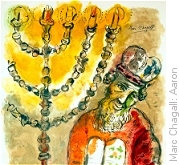
[ "In me there is darkness, But with You there is light; I am lonely, but You do not leave me; I am feeble in heart, but with You there is help; I am restless, but with You there is peace. In me there is bitterness, but with You there is patience; I do not understand Your ways, But You know the way for me." - Dietrich Bonhoeffer ]
06.08.23 (Sivan 19, 5783) Our Torah portion this week (i.e., Beha'alotekha) begins with the LORD instructing Aaron to kindle the seven lamps of the menorah (מְנוֹרָה) so that the light from each would be "turned" toward its central shaft (Exod. 25:37; Num. 8:4). The entire menorah was formed mik'shah (מִקְשָׁה), that is, beaten from a single piece of pure gold (זָהָב טָהוֹר), and its base, shaft, branches, cups, fruits, and flowers were all "one" with its substance (Exod. 25:31). The central shaft upheld the light of the Shamash (servant or helper lamp) which also served as the trunk for the other branches. The radiance of the menorah symbolized the Divine light (shamash can also be read shemesh, "sun"), which is the radiance of Yeshua, the Tree of Light and the great Servant of the LORD (John 8:12; 1 John 1:5; Prov. 3:18). Yeshua is the light that gives light to every person created in the image of God (John 1:9). Our spiritual life stems from our connection with Him, since he provides us with support, sustenance, and illumination from the oil of the Holy Spirit (John 15:1-5).
Yeshua is the Light of the LORD (אוֹר יי). As it is written, "God is our light and our yeshuah (יְהוָה אוֹרִי וְיִשְׁעִי) our salvation" (Psalm 27:1; 1 John 1:5). He alone is the Light of the world (אוֹר הָעוֹלָם), the Shamash (שַׁמָּשׁ) who descends to ignite the "light of life" (אוֹר הַחַיִּים) within all who will believe. Our Savior is the Radiance (זוֹהַר) of the glory of God (Heb. 1:3), the Fire of God's holy countenance. The one who has the Son has life, but the one who refuses this life is spiritually dead. May we all walk in the Light of His countenance; "O house of Jacob, come, let us walk in the light of the LORD" (Isa. 2:5).
בֵּית יַעֲקב לְכוּ וְנֵלְכָה בְּאוֹר יְהוָה
beIt · Ya·a·kohv · le·khoo · ve·neil·khah · be·ohr · Adonai

"O house of Jacob, come, let us walk
in the light of the LORD"
(Isa. 2:5)

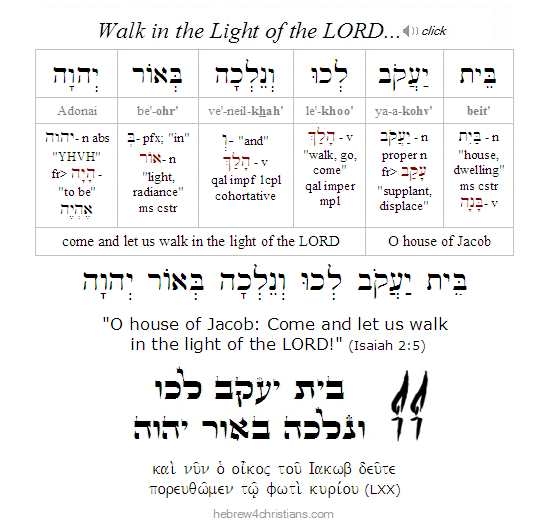
Note: For more on this topic, see "The Menorah and the Tree of Life."
Faith in our Woundedness...
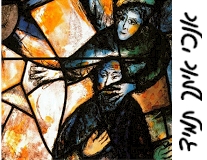
06.07.23 (Sivan 18, 5783) Affliction can sometimes feel like torture, being abandoned by God, misunderstood by others, and disgusted with ourselves. The language of pain is intensely personal and often inexpressible. Ongoing affliction tempts us to blame ourselves, to lose sight of God, and to feel hopeless. It is a real struggle.
Simone Weil suffered personal affliction her whole life but connected it to the deeper message of the gospel. She learned that the walk of faith was not so much a search for a supernatural remedy from suffering but a supernatural use for it. She grew to accept and to endure her afflictions, and by steadfastness of heart to overcome the power of suffering, even though it haunted her daily life. She regarded suffering as the high calling to love and trust God despite her pain; she learned that "when I am weak, then am I strong."
The challenge of ongoing affliction is to simultaneously affirm God's presence and love in the midst of the "dark cloud of unknowing." Faith is the struggle to trust that God indeed works all things - including our ongoing afflictions - together for our good. Faith discovers God's grace is always sufficient for us, even in our weaknesses.
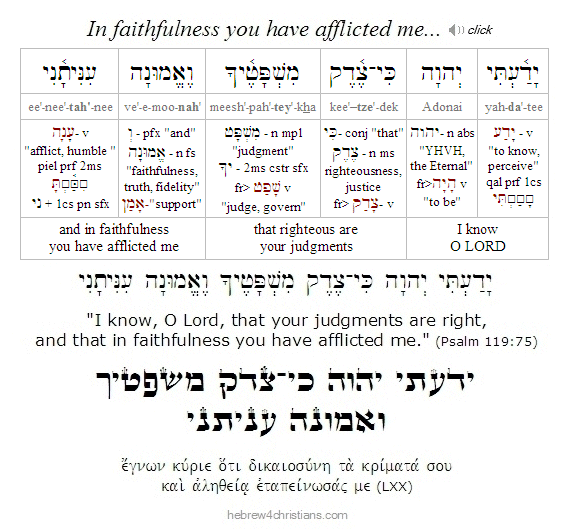 |
It is written in our Scriptures: "Faithful are the wounds of a friend; but the kisses of an enemy are deceitful" (Prov 27:6). Our LORD is a friend and lover (oheiv) who, though He may allow us to be wounded, nevertheless "sticks closer than a brother" - yesh oheiv daveik mei'ach: יֵשׁ אֹהֵב דָּבֵק מֵאָח (Prov 18:24). His afflictions are always purposive and ultimately healing.
The aim of affliction is to ground us in the truth, namely, that we are not God, and that we must surrender ourselves to God's care, even in the wastelands and desperate moments of our lives. When we cling to this world, this life, and seek to make it of value apart from Him, we are living in a state of delusion and blindness. When we are humbled by God's loving affliction, we are set free from the futility of seeking to control the world, and are thereby made free indeed.
For those whom God has chosen, the fires of affliction are purifying fires, refining fires, intended to separate the precious from the dross. We glorify God in the fire when we can say, "Here I am, LORD, do with me as it seems good in thy sight, for I know I shall not have one stroke but thou will give me grace to bear under it." Amen.
Heaven's Last Laugh...

[ "A continual looking forward to the eternal world is not a form of escapism or wishful thinking, but one of the things a Christian is meant to do." - C.S. Lewis ]
06.07.23 (Sivan 18, 5783) "Blessed are you who weep now, for you shall laugh" (Luke 6:21). Despite the heartache of our present life and the grief we now bear, sorrow will not be given the last word, but rather laughter and joy... And even now, in the midst of our afflictions, we can laugh at the prospect of the coming great Day when all things shall be completely healed, the untrue will be made true, the crooked made straight, and our hearts deepest dream for love will be fulfilled...
Nonetheless we still weep because we see the world as painful, tragic, and filled with so much sadness; we cry out for deliverance; we mourn over our lives and for the lives of others we love... If you have a heart that still can feel, you know the crushing weight of sin, you share the agony of others who struggle with their sufferings; and you may feel nearly suffocated by the darkness, pain, and inconsolable despair. Indeed only those who are heartless can laugh at the troubles of this world, unmoved and untouched by the sorrows of others, perhaps because they are insulated in their moneyed indifference or else because they scorn life as "hard" and unforgiving, yet in either case we hear Yeshua add, "Woe to you who laugh now" (either in levity or in bitterness), "for you shall mourn and weep" (Luke 6:25). So you see how it is: God's people will always be "out of step" with this world and its godlessness and idolatry. Genuine faith is a form of protest against any interpretation of reality that denies or minimizes the truth of the Divine Presence and therefore it suffers as the world exchanges truth for the lie.
Indeed God's people are "strangers" in this world; they are estranged and live as "resident aliens" -- here, yet not here.... Those who 'settle' here, who lay claim to life in this world, therefore make God their stranger. Thus King David said to the LORD: "We are strangers with You (כִּי־גֵרִים אֲנַחְנוּ לְפָנֶיךָ) and sojourners like our fathers; our days on earth are like a shadow (כַּצֵּל יָמֵינוּ) without abiding (1 Chron. 29:15). Faith in Yeshua affirms that underlying the surface appearance of life is a deeper reality that is ultimately real and abiding. It "sees what is invisible" (2 Cor. 4:18) and understands (i.e., accepts) that the "present form of this world is passing away" (1 Cor. 7:31). The mode of faith therefore calls us to live as toshavim - sojourners - who are at an infinite "distance" from the world of appearances and who seek the Eternal. We are "just passing through" this world, as we look forward to our promised home in heaven (Heb. 11:9-10). Then the days of our mourning shall be turned to dancing and God himself shall wipe away all tears from our eyes (Rev. 7:17; Isa. 55:11).
Hebrew Lesson
Psalm 97:11 reading (click):
The Good Eye Blessing...

[ "And now here is my secret, a very simple secret; it is only with the heart that one can see rightly, what is essential is invisible to the eye." - Antoine de Saint-Exupery ]
06.07.23 (Sivan 18, 5783) "The one who utters a blessing is blessed; the one who utters a curse is cursed" (Ruth Rabbah). This does not mean that we walk about blessing others in a formulaic (i.e., insincere) way as much as it expresses the great truth that as we are within, so we are without: as we forgive, so we are forgiven; as we give, so we receive... But we can't give to others what we have not received, and that means first of all learning to see how we are loved by God, despite ourselves. We must use ayin tovah, the "good eye" for the sake of our own inner peace. We must extend to ourselves "good will" and compassion before we can offer it to others. If you can't yet love yourself, ask the Lord to help you begin by not hating yourself, by turning away from the fear that hides behind your anger. As Rashi wisely said, "hatred causes a person to forget his identity."
Hebrew Lesson
Proverbs 22:9 reading (click):
Heart of the Torah...
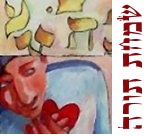
06.07.23 (Sivan 18, 5783) The Hebrew word לב (i.e., lev, "heart") is made up of the first and last letters of the written Torah scroll (i.e., Genesis begins with בּ and Deuteronomy ends with ל), though we can only make this connection after we reach the end of the scroll, that is, after we read back and review what we have learned... If we only read forward and forget to go back, we would end up with the word בּל (i.e., bal, not, negation, denial).
The Baal Turim notes that these two letters, בּ and ל, are the only two in the Hebrew alphabet that can be combined with the letters of the Name of the LORD (יהוה) to form meaningful words (e.g. בּיהוה ,ליהוה, and so on), whereas none of the other letters can do this. He concludes that the heart is the point through which we connect with the LORD.
It is written that the words of Torah "return the soul" (Psalm 19:7) because the Hebrew words and letters themselves contain spiritual power and life (Heb. 4:12; 1 Pet. 1:23). Indeed some of the sages note that the first few words of Scriptures point to the Hebrew alphabet: בְּרֵאשִׁית בָּרָא אֱלהִים אֵת, "In the beginning God created et (אֵת)," that is, א and ת, or the Hebrew alphabet itself... In this connection note the first letter of the Torah (i.e., בּ in "bereshit") and the last letter of the New Testament (i.e., ן in "amen") combine to form the word בּן (i.e., ben, son), alluding to the all-encompassing wisdom, power, and glory of God the Son, the very revelation of YHVH (יהוה) to mankind.
Hebrew Lesson
Psalm 19:7 reading (click):
Torah of Speaking Truth...
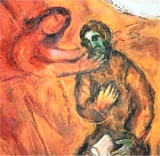
[ "Truth is so obscure in these times, and falsehood so established, that, unless we love the truth, we cannot know it." - Blase Pascal ]
06.06.23 (Sivan 17, 5783) The Torah of "speaking truth," of being honest and upright (i.e., yashar: יָשָׁר) with ourselves and others, is called dibbur emet (דברי אמת) in Hebrew. Dibbur emet, or speaking truth, is the duty to use words and language with integrity and justice. "These are the things you are to do: speak truth (דַּבְּרוּ אֱמֶת) to one another; render in your gates judgments that are true and make for peace!" (Zech. 8:16; see also Lev. 19:11; Eph. 4:25, Col. 3:9, among other verses). Note that dibbur emet also forbids spreading gossip, sharing worthless news reports, expressing contempt, mockery, or outrage over the viewpoints of others, and so on. An honest person doesn't play games with words but understands that communication is a sacred trust. Our words are to be regarded as sacred, as an expression of truth. God has made us inviolable promises, and just as His word is sacred, so should we strive to be sacred in our speech, too (Matt. 5:37).
Hebrew Lesson
Zechariah 8:16 Hebrew reading (click):
Our ability to use language and reason is essential to the image of God within us, and evil speech, or lashon ha'ra (לָשׁוֹן הָרָה), consequently profanes and corrupts the soul. Therefore the sages identify a metzora (i.e., leper) with hamotzi ra, "one who brings forth evil," and they stress shemirat ha-lashon (שְׁמִירַת הַלָּשׁוֹן), or "guarding of the tongue," as a central virtue of the righteous. In Jewish ethical thinking, speaking the truth must be contextualized with good will and kindness, and this implies that purposely saying something that to shame another person is forbidden. Some of the sages, such as the Chofetz Chaim, have gone so far as to say that you are forbidden to say anything evil about a person even if it is true. There are exceptions to this rule, of course, for example in legal proceedings when eye-witness testimony that a crime was committed is required for the sake of justice, but in general the sages recommend avoid saying anything gratuitously negative about others by using the good eye to look for their good qualities...
Our Lord went well beyond these requirements and told us that whatever is spoken in this life is "echoed" throughout eternity and will be reheard upon the day of judgment: "I tell you, on the day of judgment people will give account for every careless (ἀργὸν) word they utter, for by your words you will be justified, and by your words you will be condemned" (Matt. 12:36-37). Our words, especially the words of our heart, are as prayers spoken to heaven. We are especially warned against making promises we might break: "Let what you say be simply 'Yes' or 'No'; anything more than this comes from evil" (Matt. 5:37). All this implies that our thinking, which is expressed in our words, must be sanctified as well. We have a duty to think clearly and righteously, and therefore evil and fearful thoughts are forbidden as well ...
"Come, O children, listen to me; I will teach you the fear of the LORD. What person is there who desires life and loves many days, that he may see good? Keep your tongue from evil and your lips from speaking deceit. Turn away from evil and do good; seek peace and pursue it" (Psalm 34:11-14). Fearing the LORD means being filled with the wonder of the Divine Presence. The one who fears the LORD will "see good," that is, he will see the goodness of his surroundings in the light of God's Presence. Seeing the good in others, using ayin tovah (a good eye), is therefore the contrary of lashon hara, or slander. Our words should be used to upbuild, edify, and esteem others, not to tear them down. Lashon hara is evidence, then, of a critical spirit, an evil eye, and a suspicious heart. We must look to God for the miracle of seeing the truth of His goodness in all things.
"Set a guard, O LORD, over my mouth; keep watch over the door of my lips" (Psalm 141:3). Those who think it easy to control the tongue have likely never really tried to do so. "The tongue is a small member, yet it boasts of great things. How great a forest is set ablaze by such a small fire! And the tongue is a fire, a world of unrighteousness. The tongue is set among our members, staining the whole body, setting on fire the entire course of life, and set on fire by hell" (James 3:5-6). Ultimately, controlling your tongue is a matter of controlling your inner thoughts, your heart, and your attitude, called shemirat ha-lev (שמירת הלב). Therefore we are admonished to be "quick to hear, slow to speak, slow to anger," since the anger of man never works the righteousness of God (James 1:19). May the LORD our God help us always to speak with grace, "seasoned with salt" (Col. 4:6); and may we all "speak the truth in love to grow up in every way" (Eph. 4:15). "Let my words and the meditation of my heart be acceptable to you, O LORD, my Rock and my Redeemer" (Psalm 19:14). Amen.
Hebrew Lesson
Psalm 19:14 Hebrew reading (with comments):
The Glory of His Image...
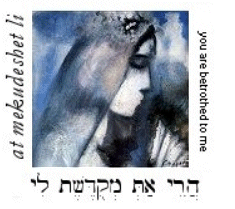
[ "It is absurd for the Evolutionist to complain that it is unthinkable for an admittedly unthinkable God to make everything out of nothing and then pretend that it is more thinkable that nothing should turn itself into everything." - Gilbert K. Chesterton ]
06.06.23 (Sivan 17, 5783) One of the great tragedies of life - perhaps the greatest tragedy of all - is to walk your days without knowing the truth about why you exist and who you really are. Torah reveals that you are created b'tzelem Elohim (בצלם אלהים), in the very "image of God," for the purpose of knowing your Creator and understanding his love for you. Sin, however, has marred the divine image and therefore your heart needs to be recreated by means of the miracle of spiritual regeneration (1 Pet. 1:23). "This is the life of eternity: to know you, the only true God, and Yeshua the Messiah whom you have sent" (John 17:3).
Any "anthropology" or idea of man that is not grounded in this central reason for human existence debases the transcendent realm of human life to that of a "object" subject to impersonal forces... Naturalism reduces man to an animal that perishes and is no more (2 Pet. 2:12). The truth that our inmost existence is healed by regeneration restores us to the realm of the divine, reflecting the image of God anew, and therefore we are instructed to respect ourselves by honoring the gift of life that has been bestowed to us.
It is written: "A man is glorious (or "precious"), but if he does not understand, he is likened to a beast that perishes" (Psalm 49:20). Such a person is dehumanized and loses his connection with who he really is, for like an animal that is without "likeness" (דמה) to God, so he will be devoid of spiritual perspective, reasoning that all that is real concerns the immediacy of the present hour. He will be limited and bound to the dark "matrix" of this world wherein everything seems "natural" and everything happens as a result of material causes alone. The "natural man" can live his entire life without recognizing God's hand at work behind the scenes. His presuppositions and hardness of heart blind his eyes from apprehending spiritual reality. Those who have come alive and know God through the blessing of Yeshua the Messiah, however, shall also bear the image of the man of heaven, and "we all, with unveiled face, beholding the glory of the Lord, are being transformed into the same image from one degree of glory to another. For this comes from the Lord who is the Spirit" (2 Cor. 3:18).
Hebrew Lesson
Psalm 49:20 Hebrew reading:
Hidden Life of the Seed...

[ "Just as the sinner's despair of any hope from himself is the first prerequisite of a sound conversion, so the loss of all confidence in himself is the first essential in the believer's growth in grace." - A.W. Pink ]
06.06.23 (Sivan 17, 5783) A seed is small, fragile, and seemingly insignificant, yet in the hands of a wise gardener it is understood to be miraculous, able to be perfected and made fruitful. You may feel unworthy, helpless, and forlorn, but you are regarded as blameless and upright because of the miracle of God's life imparted within you, that is, the "holy seed" implanted at your regeneration (see 1 Pet. 1:23). You have a new nature that draws life from heaven as God's own child. And just as a master gardener carefully tends to his planted seeds, so God will tend the divine life sown within your heart. The seed is "hidden" in the soil, unseen by others, yet tended by the gardener who knows its potential to be perfected.
The seed "contains" the essence of the life it replicates. Inside the seed there is an embryo (the baby plant), and when the seed begins to grow, one part of the embryo becomes the (visible) plant while the other part becomes the (hidden) root of the plant. However, the outer shell of the seed must first be broken, and then what appears is the "radicle," or the embryonic root which will develop into a plant. The life cycle of a seed is one of burial and resurrection, of growth and fruitfulness (John 12:24), and the divine life implanted within our hearts will bear fruit: "For by his sacrifice, Yeshua has perfected (i.e., made complete, whole, full of life) all those who are being sanctified" (Heb. 10:14).
Yeshua said, "Be perfect even as your Heavenly Father is perfect" (Matt. 5:48), which of course is an impossibility from a human point of view, but is a corollary of the divine nature implanted within you... The seed within you is perfected to be God's beloved child. You might miss it in the midst of your everyday struggles with fear and the "miasma" of this depraved world, but God is working in you both to will and to do his good pleasure (Phil. 2:12). Like all matters of the Spirit, God's perfection in you comes by faith, not by sight... Only the new heart (lev chadash) created by power of God's Spirit can possibly yield the fruit of the Spirit.
Therefore take heart and do not yield to despair over the mess of your lives. Remember that fruit does not immediately crop up but requires time and its own season... The process of spiritual growth is ultimately mysterious and divine: "The Kingdom of God is like someone who spreads seed on the ground. He goes to sleep and gets up, night and day, and the seed sprouts and grows, though he does not know how. By itself (αὐτομάτη, "automatically") the soil produces a crop, first the stalk, then the head, then the full grain in the head. And when the grain is ripe, he comes in with his sickle because the harvest has come" (Mark 4:26-29).
Trust in God's power to do the miracle. "Now may the God of peace who brought up our Lord Yeshua from the dead, that great Shepherd of the sheep, through the blood of the everlasting covenant, make you perfect in every good work to do His will, working in you that which is well pleasing in His sight, through Yeshua the Messiah, to whom be glory forever and ever. Amen" (Heb. 13:20-21). Amen. " He who calls you is faithful; he will surely do it" (1 Thess. 5:24).
Hebrew Lesson
Proverbs 11:30 Hebrew reading (click):
Deconstructing Nonsense...

[ "Truth has always had many loud proclaimers, but the question is whether a person will in the deepest sense acknowledge the truth, allow it to permeate his whole being, accept all its consequences, and not have an emergency hiding place for himself and a Judas kiss for the consequence." - Soren Kierkegaard ]
06.06.23 (Sivan 17, 5783) "Common sense" is under attack by today's faux-intellectuals as they invent "rules of language" in a radical attempt to restructure and redefine our collective history and culture. This is an era of psycho-linguistic programming intended to create cognitive dissonance. As Owell presciently said: "There is no swifter route to the corruption of thought than through the corruption of language." Their deceptive approach is to use emotional appeals and fallacies of "illicit presumption" that beg the question of the truth of their definitions - and they castigate anyone who questions their thinking as being a "thought criminal" or "enemy of the State."
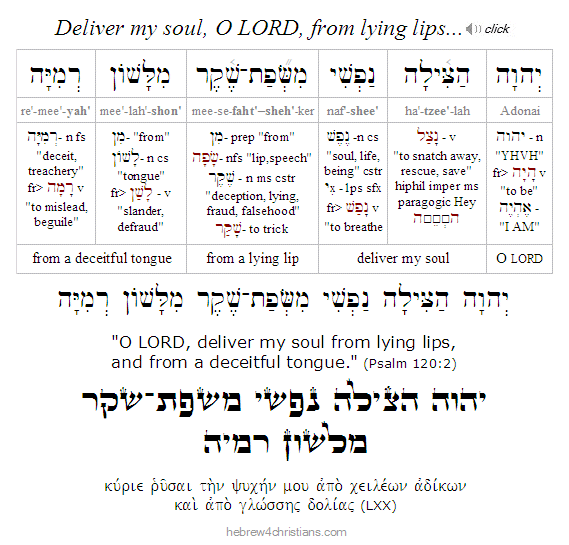 |
Faith in the Unseen Good...
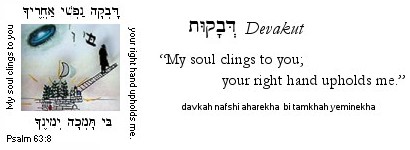
[ The following is related to this week's Torah reading, parashat Beha'alotekha... ]
06.05.23 (Sivan 16, 5783) From our Torah this week (i.e., Beha'alotekha) we read: "At the command of the LORD they camped, and at the command of the LORD they set out" (Num. 9:23). This teaches us that God's Name is to be heeded every step of the way. Whenever we journey someplace, near or far, say, "With God's help (i.e., be'ezrat ha'shem: בעזרת השם) I am going to this place, and I will stay for so long, if it pleases God (i.e., im yirtzei ha'shem: אם ירצה השם)." As James reminds us, "You do not know what tomorrow will bring. For what is your life? You are a mere mist that appears for a little time and then vanishes (James 4:14-15). "Man is like a breath; his days are like a passing shadow" (Psalm 144:4). We share exile with the LORD in this age, as strangers and sojourners with Him; indeed, our lives are "hidden with Him," waiting to be revealed (Col. 3:1-4; Psalm 17:15). "The present form (τὸ σχῆμα) of this world is passing away" (1 Cor. 7:31), and the heart of faith looks for a city whose designer and builder is God Himself (Heb. 11:10). "So we do not lose heart, though our outer self is wasting away... For the things that are seen are turning to dust, but the things that are unseen shall endure forever" (2 Cor. 4:16-18).
Hebrew Lesson:
Proverbs 3:6 reading (click):
"In all your ways know Him," that is, in all that you put your hand to do respect the Lord and ask for divine guidance (1 Cor. 10:31). As King David stated, Shiviti: "I have set the Lord always before me, because He is at my right hand, I shall not be moved" (Psalm 16:8). "Do do be wise in your own eyes, fear the LORD and turn away from evil" (Prov. 3:7).
Walking through Perilous Times...

06.05.23 (Sivan 16, 5783) The Scriptures foretell that the time before the prophesied End of Days would be "perilous" (χαλεπός) and full of moral depravity: "Understand this, that in the last days perilous times (καιροὶ χαλεποί) shall come" (2 Tim. 3:1). In the entire New Testament, the only other place we find this word translated "perilous" (i.e., χαλεπός) is in Matthew 8:28, where it describes savage demonic activity. Indeed, the word likely comes from a Greek verb (χαλάω) that means "to let down from a higher place to a lower," thereby creating a sort of spiritual "chasm" or rift, which again suggests that Satan's activity will be unleashed upon the earth. In the "End of Days," then, a wave of fierce demonic activity will appear upon the earth that will menace and terrorize others. If you can stomach reading the daily news, you will see that this peril is a regular feature of our world today.
Are we then to be in dread of these things? No. "There is no fear in God's love" (φόβος οὐκ ἔστιν ἐν τῇ ἀγάπῃ). God gives truth and grace to help us navigate our difficult situation; he understands the character of the times in which we live... Notice that the Greek word translated "times" in the phrase "perilous times" (καιροὶ χαλεποί) is also translated "appointed times" (מוֹעֲדִים) throughout the Scriptures. In other words, God has appointed this time to be one of judgment upon the world system, and we are here forewarned so that we can speak the truth and offer healing to others who seek deliverance... The Lord will never leave us nor forsake us; He will shelter us in Goshen (גּשֶׁן, lit. "drawing near") before the hour of his wrath; He will walk with us through the waters, and through the fires (Isa. 43:2). Our Lord knows how to calm the storms around us...
Hebrew Lesson:
Isaiah 43:1b reading (click):
"False words are not only evil in themselves, but they infect the soul with evil" (Plato). Let us be careful to whom we listen and accept as our moral and spiritual authority. The latest "news" and gossip of this evil world is inherently deceptive, a carefully crafted dialectic of social engineering devised by Satan that is intended to divide people into warring factions in order to enslave them to their fears. We are not to follow the madness of the crowd or be victims of such devices (1 Pet. 5:8-9). Indeed the "news" of this false world (עולם השקר) is a lie, collectively considered, since it (i.e., the "script writers" of the major news outlets) illicitly assume that there is no God, there is no salvation in Messiah, no judgment to come, etc., and that people are helpless and must rely on their own devices...
The irony in all of this is that there is indeed a "dialectic" of the Spirit in motion, a dialectic that will make the various conflicts of this world look like a "tempest in a teapot" in comparison. The great day of the LORD approaches, and the elements will all be burned with fervent heat, as it is written: "But the Day of the LORD (יוֹם־יְהוָה) will come like a thief, and then the heavens will pass away with a horrific roar, and the heavenly bodies will be burned up and dissolved, and the earth and every deed done on it will be laid bare" (2 Pet. 3:10). As was also foretold in our prophets: "Lift up your eyes to the heavens, and look at the earth beneath; for the heavens vanish like smoke, the earth will wear out like a garment, and they who dwell in it will die in like manner; but my salvation will be forever, and my righteousness will never be dismayed" (Isa. 51:6). Instead of giving credence to the fearmongering and propaganda of this godless and insane world, we must follow the LORD God Almighty and to submit to His leadership despite the madness that surrounds us. Amen, and may God give us greater grace and wisdom for these desperate days...
Hebrew Lesson:
Isaiah 43:2a reading (click):
I hold on in trust, even in the miasma of darkness, despite myself and my broken heart, pine my lost affections, the keening of wasted days that haunt my hope; the revelation of daily dissolution and dreams that fade to black...
A warm afterglow of light beneath closed and tired eyes, I breathe deeply, slowly, and allow the blur of days past to collect themselves in the repose of a present sigh: a moment holding still, the faint whisper of the promise beyond time, space - known yet unknown - a gentle aura, lambent yet brilliant, endearing to the soul, melts away the darkness and heartache: "Come unto me..."
Parashat Beha'alotekha - בהעלתך
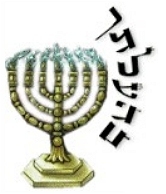
[ "I believe that God will give us all the strength we need to help us to resist in all time of distress. But he never gives it in advance, lest we should rely on ourselves and not on him alone." — Dietrich Bonhoeffer ]
06.04.23 (Sivan 15, 5783) Shavuah Tov, chaverim. Our Torah portion for this week, called "Beha'alotekha" (i.e., Num. 8:1-12:16), begins with God giving instructions about how Aaron was to attend to the lamps of the Menorah within the Holy Place of the Tabernacle (Num. 8:1-4). Each day Aaron was to clean each of the seven lamps and to refill them with the very purest olive oil. The wicks were then to be bent so that the six outer lamps shined toward the seventh (and central) shaft. The lamps were to be lit daily, "from evening until morning," in a specific sequence - starting from the central lamp (the shamash) and then moving right to left (Exod. 27:21). According to the Talmud (Shabbat 22b), while all the lamps received the same amount of olive oil, the central lamp miraculously never ran out of oil, even though it was kindled first in the sequence. This miracle is also reported to have occurred during the Temple period, though it abruptly ended about 40 years before the destruction of the Second Temple (c. 30 AD), after the death of Yeshua the Messiah, the true Servant and Branch of the LORD. As it is attested in the Talmud: "Our Rabbis taught: During the last forty years before the destruction of the Temple the lot ['For the Lord'] did not come up in the right hand; nor did the crimson-colored strap become white; nor did the centermost light shine" (Yoma 39a).
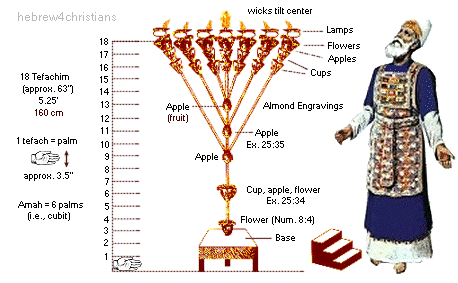 |
The portion then describes how the Levites were to be set apart for service at the Mishkan or "Tabernacle" (Num. 8:5-12). In a ritual ceremony that signified a sort of "rebirth," the Levites were first sprinkled with mei chachatat (מי חטאת), literally, "the waters of sin" (Num. 8:7), that is, holy water mixed with the ashes of the red heifer sacrifice that was used to purify from contamination with death (Num. 19:13). Next they shaved off all their hair and were completely immersed in a mikveh (i.e., a bath containing flowing or "living" water). Notice that the steps of being sprinkled with purifying water, shaving off of all the hair, and being completely immersed in a mikveh were similar to the ritual for the cleansing of the metzora, or "leper" (Lev. 14:2-32), suggesting that a qualified priest was a "healed leper" of sorts. The medieval commentator Rashi notes that each member of the community was then required to place their hands on the Levites' heads, just as the hands were placed on the head of a sacrificial animal as it was slaughtered before the altar (Num. 8:10; Lev. 1:4, 3:2). The "waving" of the Levites by the High Priest likewise simulated the ritual of "tenufah" (תנופה), that is, the waving of the guilt sacrifice (asham) that was offered by a leper after his or her cleansing (Lev. 14:12). Finally, the Levites themselves laid their hands on the sin and whole burnt offerings for atonement before the LORD (Num. 8:12).
The portion then continues with a restatement of law of Passover (Num. 9:1-14), followed by a description of the Cloud of the LORD (i.e., anan Adonai: עֲנַן יְהוָה) that covered the Tabernacle by day and appeared as a pillar of fire (עַמּוּד אֵשׁ) by night. When the Cloud lifted the people would break camp and go to their next location en route to the promised land; when the Cloud settled the people would stop and encamp again (Lev. 9:15-23).
Two silver trumpets (i.e., chatzortzrot kesef: חֲצוֹצְרֹת כֶּסֶף) were to be made for various purposes, including signaling the people to break camp, assembling the elders of Israel, to mark the arrival of new moons and appointed times, as alarms for battle, and so on.
The Cloud of the LORD lifted and the people of Israel then decamped from Sinai on the 20th day of the second second month of the second year after the Exodus from Egypt (Num. 10:11-35). The Ark of the Covenant went out first to scout a location followed by a specific camp order and formation.
Soon after many began to complain of the hardship of the journey, and the Fire of the LORD (אֵשׁ יְהוָה) broke forth and consumed people on the outer parts of the camp. The name of the place was subsequently commemorated as "Taberah" (תַּבְעֵרָה)- "the burning."
Despite the judgment of the LORD, some time later the eirev rav (mixed multitude) craved for Egyptian food and the people of Israel joined them by recalling the "free fish" they ate in Egypt. The people also complained of the monotony of the manna that fell like dew from heaven to feed the people during their journey (Num. 11:1-15). Moses then lamented to the Lord about how hard it was to lead the people, and God then instructed him to appoint 70 elders of Israel to help him lead the people (Num. 11:16-17). As for the people's complaint over the divine menu, the LORD sent an enormous swarm of quail that brought a plague upon the people. Because so many died from the plague, the place was called Kibroth-hattaavah (קִבְרוֹת הַתַּאֲוָה), or the "Graves of Craving" (Num. 11:18-33).
The portion ends with the attempted mutiny of Miram and Aaron regarding Moses' role as the exclusively chosen leader of the people of Israel. They secretly consulted and asked: "Has the Lord indeed spoken only through Moses? Has he not spoken through us also?" The LORD heard their secret conversation and intervened by calling them to appear with Moses before the Tent of Meeting. There the LORD vindicated as the sole leader of Israel because only he speaks "mouth-to-mouth" with God. Miriam was then stricken with tzaarat ("leprosy") and exiled from the camp. Moses prayed for his sister be be healed (אֵל נָא רְפָא נָא לָהּ) but the LORD delayed healing her seven days to correct her and to be an object lesson to Israel.
Parashah Themes...
Some themes for this week's reading include the symbolism of the Menorah and the Divine Light; the ongoing need for purification from sin; the role being a priest to one another; the call for holiness in the divine service; the Shekhinah Glory and Presence of God; the direction and leading of God; the tests we face as we journey through desert places; the problem of our complaining hearts; the requirement to live by "daily bread"; the importance of respecting elders; tzaarat and exile from the camp, among others.
Trust in Difficult Days...

06.02.23 (Sivan 13, 5783) We are living in times of difficulty leading up to the coming of our Messiah, Yeshua, and therefore we all need courage and grace to persevere. When Andrew Murray was bedridden and sick, he advised another sufferer using these words: "In time of trouble say: "First, He brought me here. It is by His will I am in this straight place; in that I will rest. Next, He will keep me here in His love, and give me grace to behave as His child. Then, He will make the trial a blessing, teaching me the lessons He intends me to learn, and working in me the grace He means to bestow. Last, In His good time He can bring me out again – how and when He knows. [Therefore] let me say I am here, (1) by God's appointment; (2) in his keeping; (3) under His training; and (4) for His time."
Deep within I discover that I can bless the Lord, losing sight of myself and my fears as I affirm my deepest purpose and heritage: "My (boundary) lines have fallen to me in pleasant places; indeed, my inheritance is beautiful to me" (Psalm 16:6). Though I might have felt bereft and even tempted to curse my estate, by God's grace I am made able to give thanks and to bless, even in the midst of my troubles and pain: "I will bless the LORD who has counseled me; my conscience disciplines me in the night" (Psalm 16:7). Therefore שִׁוִּיתִי יְהוָה לְנֶגְדִּי תָמִיד - "I have set the Lord always before me" – especially in desperate moments when I can barely endure – since I have learned that "because he is at my right hand, I shall not come undone" (Psalm 16:8). God gives me strength to renew my hope: therefore "my heart is made glad, my whole being rejoices, and my body shall rest in trust" (Psalm 16:9).
Hebrew Lesson
Psalm 16:9 reading (click):
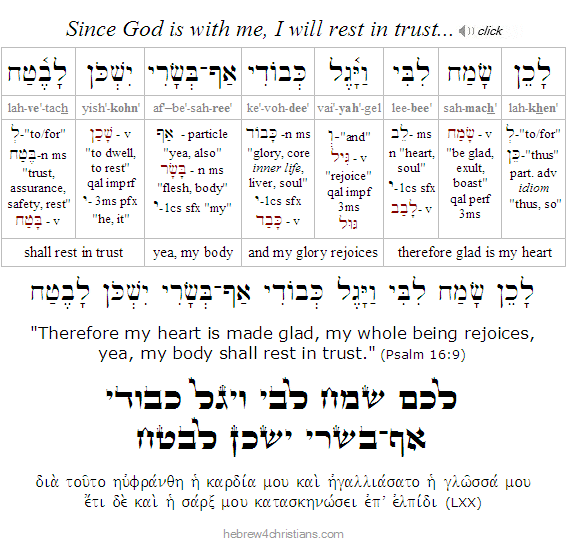 |
When I feel hopeless, I seek hope; when in pain, I seek strength; when in despair over besetting sins, I yearn again for a place I can call home... In the midst of these things, my heart wonders whether my suffering has come because I deserve it or somehow "need" it. I reason that it may make sense that God extends special care for his favored ones, for those who are righteous and who seem free from the vexation of despair, but does it make sense for me, one who is undone, broken, alone, and unworthy? My heart protests that this is not the whole story of my life, and that more to be said. I need God and I know that he cares for me. I recall his promises to heal, to bind up the broken of heart, and extend his comfort for our afflictions. Might pain herald the advent of something new to come? Might there be a deeper beauty and surpassing grace going "through the wound" instead of objecting to it?
Whatever happened to sin?

[ "Find God or die." A lot of people play at religion to create a self-styled "spirituality" to numb their conscience rather than rending their hearts and crying out to God for mercy and deliverance from the evil that is within them and that is swallowing up the world... "If the foundations be destroyed, what can the righteous do?" ]
06.02.23 (Sivan 13, 5783) Our nihilistic and benighted age questions the very idea of objective truth, and especially moral truth, in order to justify its lusts and godless delusions. It plays "language games" and practices deceptive linguistic subterfuge in order to feign ignorance about what is real. Indeed the traditional idea of "sin" as a violation of God's moral will is now castigated as a form of social oppression. Today if a violent crime occurs, for instance, explanations are immediately sought using "naturalistic" assumptions (such as economic or racial status, biochemistry, historical or social forces, etc.), though such narratives alone cannot account for moral outrage (i.e., the transcendental idea of justice) and the convictions of conscience. Consequently naturalism must assign blame for sin removing it from the realm of individual responsibility by denying the very possibility of morality. The result can be found in the anomie and eviscerating despair that haunts the postmodern soul. The Scriptures teach, however, that moral truth is intuitively known through the inner voice of conscience, and therefore each person made in the image of God is responsible to walk in sanctity and honor by "loving what is good and hating what is evil" (Rom. 1:19-22; Acts 24:16; Psalm 19:1-4; Psalm 34:27; Psalm 97:10; Prov. 14:22, etc.).
In the Scriptures, the most common Hebrew word for sin is "chet" (חֵטְא), often translated as "missing the mark" (i.e., of the divine ideal), though that definition does not capture the intent of the person, that is, the decision (often subconsciously expressed) to aim at a mark contrary to what is right or good. Sinning, in other words, should not be regarded as passively "missing" the will of God, as if it were some sort of "accident," but rather as actively defying God's will by choosing a different goal altogether. In this sense sin may be understood as treason against truth, open rebellion against divine authority, the willful repudiation of an obligatory moral order, and the deification of the self as the object of ultimate concern... The essence of sin therefore expresses idolatry within the human heart...
Properly understood, then, sin is not an occasional "misstep" of the will, but an eternal falling away from the Eternal -- an ontological break from Reality and Truth. We are not sinners because we sin, we sin because we are sinners, and that means that the spiritual problem of our inner rage, fear, lust, and despair calls for deliverance – objective salvation and healing – from the root sickness of "spiritual death." The first condition for receiving this deliverance, however, is rigorous honesty, particularly with ourselves: "The purest of heart is precisely the one most willing to comprehend his own guilt most deeply. Without purity of heart, no one can see God, and without becoming a sinner, no human being can come to know God" (Kierkegaard). We must be careful here. This is not an academic matter concerning how to know or understand what is right as much as it a matter of the will to take responsibility by acknowledging the rightness and authority of truth. That is why the original sin was rooted in an act of will, not in an act of knowing, since the essence of the temptation was expressed in the decision to define what is good and what is evil in merely human terms.
We can only find salvation through the consciousness of our own sin and need for deliverance, and any attempt to enter by another way is treason against the message of the cross of Messiah. This is the "terrible struggle" with the Eternal – with God and oneself – as we let go and die to the self-life; as we surrender and engage God's truth – which again is not found by mere intellectual assent, but by an act of will, by teshuvah, by faith, and by learning to walk in faith - despite yourself - along the ways and byways of your life. The LORD "dwells" with one who is of a contrite and lowly spirit (Isa. 57:15), he "tabernacles" within the heart of the poor in spirit, with those who mourn over sin and who hunger and thirst for His righteousness...
Hebrew Lesson
Lamentations 3:40 reading (click):
Finding Real Treasure...
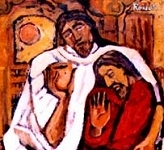
06.02.23 (Sivan 13, 5783) Yeshua teaches us to earnestly seek for what really matters in life, to discover that which is best of all. He said, "The kingdom of heaven is like treasure hidden in a field, which a man found and covered up. Then in his joy he goes and sells all that he has and buys that field. Again, the kingdom of heaven is like a merchant in search of fine pearls, who, on finding one pearl of great value, went and sold all that he had and bought it" (Matt. 13:44-46). Here Yeshua illustrates that a relationship with God is the true source of joy and value in life, and that all other passions and desires are like "fools gold" when compared with its overwhelming worth...
In this connection Soren Kierkegaard wrote: "If anyone thinks he is a Christian and yet is indifferent toward being that, then he really is not one at all. Indeed, what would we think of a person who gave assurances that he was in love and also that it was a matter of indifference to him?" (Works of Love). The Shema, the "first and greatest commandment," is to love God "bekhol levavkha" (בְּכָל־לְבָבְךָ) with all our hearts, and yet how is that love possible apart from the revelation of the passion of love itself? "We love because God first loves us" (1 John 4:19), and therefore teshuvah ("repentance") is a matter of being in love, celebrating God's heart for us, awakening to its wonder, and being thrilled and overjoyed at its reality. Isn't this the essence of the matter?
"Shimon ben Yonah, atah ohev oti?" – "Simon son of Jonah, do you love me?" (John 21:17). But how can we love the Lord apart from trusting his heart for us? "Come unto Me," Yeshua says, "live in Me and I will live in you" (John 15:1-5; Matt. 11:28-30). O Lord God our Savior, deliver us from apathy and indifference! Soften our hearts and awaken us to our great desire and need for you! Hashivenu, Adonai: turn us, O LORD, and we shall be turned; heal us, and we shall be healed... Help us to come to you and to know the breadth and length and height and depth of your great love for us (Eph. 3:18-19).
So for what do you hope, friend? What are your dreams? Your deepest desires? Where is your treasure? Yeshua cautioned those who sought their happiness in this world: "Do not store up for yourselves treasures on earth... be rich toward God" (Matt. 6:19-20; Luke 12:21). When we treasure God, our focus is directed toward the eternal reality, and our interest in this world is minimal. We trust God to meet our daily needs and surrender our future to His care. The only worry we face concerns our own deficiencies in our obligations to the Savior. Our duty is to love God in the truth - bekhol levavkha - with all our heart, having no thought of ourselves. Indeed, as I have mentioned before, self-denial means to quit thinking about yourself (from α-, "not," + ῥέω, "to speak") by focusing on God's love for you. As Simone Weil once said, "It is not my business to think about myself. My business is to think about God. It is for God to think about me." Amen; we are healed in His love for us.
מי־לי בשׁמים
ועמך לא־חפצתי בארץ
mee'-lee · va·shah·mah'·yeem
ve·ee·me·kha · loh-chah·fahtz'·tee · va·ah'·retz

"Whom have I in heaven but you?
And there is nothing on earth that I desire besides you."
(Psalm 73:25)

Hebrew Lesson
Psalm 73:25 Hebrew (click):
Our Good Samaritan...
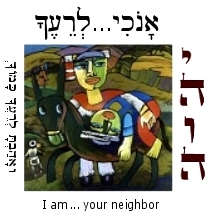
[ "I saw a great oneing between Christ and us, because when He was in pain, we were in pain..." - Julian of Norwich ]
06.01.23 (Sivan 12, 5783) The Gospel records an incident where a certain "lawyer" (i.e., νομικός or "Torah sage") stood up and aggressively challenged (ἐκπειράζων) Yeshua to explain what people must do to inherit eternal life (Luke 10:25-28). Yeshua first responded by asking the man a question of his own: How do you read the Torah? Like most good teachers, Yeshua shifted the question back to the person who was asking it. The way you read (i.e., interpret) is the result of other, more basic, presuppositions you are making.
This Torah scholar was certainly well-studied in Scripture. He did not provide a litany of 613 commandments to perform, nor did he focus on the Ten Commandments. Instead he replied by citing the Ve'ahavta portion of the Shema ("You shall love the Lord your God with all your heart and with all your soul and with all your strength and with all your mind") and added the obligation to "love your neighbor as yourself" (Lev. 19:18). The man's answer was correct, of course, though it is likely he was simply repeating what Yeshua had been teaching the crowds about the meaning of Torah all along. At any rate there wasn't a hint of irony in Yeshua's reply: "You have answered correctly; do this, and you will live" (Luke 10:28).
The problem, however, is that most people - even intensely religious people - don't actually "do this," though they may claim otherwise. After all, truly loving God with all your heart and genuinely loving your neighbor as yourself are surely the most difficult of all the commandments, and indeed, all the other ethical language of Scripture amounts to little else but commentary to this fundamental truth (Matt. 22:40). If people could keep these two commandments, then there would be no need for a Savior. The cross would then be regarded as "foolishness" and the entire mission of Yeshua would be absurd.
Salvation means (negatively) being set free from "the law of sin and death" and (positively) being "reborn" so that we can truly love God and others. It is not a question of "willpower" or the "zeal" of man; it is not a question of what I can do but rather what God can do (John 1:13). The assumption that human actions are sufficient to merit eternal life (i.e., through performing loving acts) is therefore part of the problem of sin itself! The "law of sin and death" (תּוֹרַת הַחֵטְא וְהַמָּוֶת) operates on this very principle: As long as you think you can merit eternal life by means of your own efforts, you are relating to God as Judge (אֱלהִים) rather than as Savior (יהוה). You have yet to experience inner brokenness and therefore believe you can "justify yourself." The cross of Yeshua is the negation of this principle and represents the "end of the law for righteousness to all who believe."
Yeshua, however, surely knew that people could not save themselves, despite their supposed best efforts. Our Torah sage intellectually knew what God's requirements were, but he was powerless to live them out in his life. Knowing the truth is not the same thing as living it. A zeal for truth is wonderful if it is lived out in real life, but it is self-deception to "draw near to God with the lips" while having a dead heart (Isa. 29:13). Truly loving God with all your heart, soul, mind and strength is simply impossible for the unregenerated heart. By nature people are "spiritually dead" and self-absorbed. Yeshua knew that it is precisely because we are unable to love that we need Him. He understood that it required his passion and sacrificial death to impart life to those who were spiritually dead.... "We love Him because He first loved us" (1 John 4:9).
Unsatisfied with Yeshua's response, the zealous sage then "wanted to justify himself" (θέλων δικαιῶσαι ἑαυτὸν) by attempting to qualify the definition of "neighbor." He therefore asked Yeshua, "Who is my neighbor?" (Luke 10:29). Some background to this question might help. Jewish tradition tended to regard the concept of "neighbor" (i.e., rea: רֵעַ) as referring only to one's fellow Jew, and therefore the obligation to love "others" outside the community did not apply. In response to the man's question (and addressing his underlying assumption), Yeshua told the story of a man traveling from Jerusalem to Jericho who "fell among thieves" (Luke 10:30-36). This story illustrates various types of people as they "walk the road" of life and how they respond to the suffering of others. Soren Kierkegaard comments:
The first man was a peaceful traveler who walked along the road from Jericho to Jerusalem, along a lawful road. The second man was a robber who "walked along the same road" – and yet on an unlawful road. Then a priest came "along the same road"; he saw the poor unfortunate man who had been assaulted by the robber. Perhaps he was momentarily moved but went right on by. He walked the road of indifference. Next a Levite came "along the same road." He saw the poor unfortunate man; he too walked past unmoved, continuing his road. The Levite walked "along the same road" but was walking his way, the way of selfishness and callousness. Finally a Samaritan came "along the same road." He found the poor unfortunate man on the road of mercy. He showed by example how to walk the road of mercy; he demonstrated that the road, spiritually speaking, is precisely this; how one walks. This is why the Gospel says, "Go and do likewise." Yes, there were five travelers who walked "along the same road," and yet each one walked his own road.
Yeshua then asked, "Which of these three (i.e., priest, Levite, or Samaritan), do you think, proved to be a neighbor to the man who fell among the thieves?" When the Torah sage answered, "the one who showed mercy," Yeshua said, "do this, and you will live."
Notice again that Yeshua responded to the original question by means of redirection: "How do you read the Scriptures?" "Which of these was a neighbor?" "What do you think?" Like all good teachers, Yeshua was reluctant to simply give a direct answer. No, he expected people to work out the problem for themselves. After all, each of us is responsible for how we choose to "walk" the road of life. We all have desire and passion, but the question is how is that energy directed? What direction does it take down the road of life? Reason is often the slave of our passions. As Yeshua said, "Wisdom is justified by her children."
Instead of attempting to qualify someone as worthy of our love, Yeshua wants us to be in earnest relationship with the heart of God. That's what is absolutely essential. And we can only be in a heart relationship with God by means of the miracle of God. Naturally speaking, we are at enmity with God; we are devoid of life and powerless to love and be loved. When by a miracle God reveals his great love for us -- personally, deep within our "heart of hearts" -- a love for us that is unconditional, grounded in the gift of the Lover of our souls than in the supposed merit we attain to be worthy recipients of God's love -- then, and only then, are we are transformed. Are you offended by the lack of love shown toward you? Then act as a true lover by showing compassion. Go and "do this" (Luke 10:29-37).
Recall that the Torah sage had initially asked: "Master, what shall I do to inherit eternal life?" and Yeshua pointed to having a heart-relationship with God. "Love God; love your neighbor; do this and you shall live." And yet this is the very problem with us: we cannot love God or our neighbor; indeed, we cannot properly love ourselves. Reciting the Shema and doing good deeds is not enough. We may delight in the Torah yet still be captive to the law of sin and death that binds us to our wretched estate.
Each of us is on the road of life, wounded and left to die. Religion does not help us when the soul is utterly abandoned and powerless to find remedy. We need a savior, someone who will care enough to intervene, who does not pass us by, who will take pity on us. Like the Samaritan in the parable, Yeshua makes bandages for our wounds by rending his own garments; he lifts us up, binds our wounds with the salve of his compassion, and takes us to a place of refuge for our healing. Yeshua is our "Good Samaritan" who rescues the powerless in their distress and delivers them from death.
We are saved by God's love, and we experience that love by faith in God's compassion for our lives. If we are deficient in compassion, it is likely we have not deeply experienced the love of God in our hearts. As John Calvin once wrote: "Faith alone justifies, yet faith is never alone. It is never without love; if love is lacking, neither is there faith..."
Love God; love your neighbor; love yourself... and yet this is impossible apart from divine intervention, apart from the power of life that prevails over the power of death. "What must I do to inherit eternal life?" If the remedy were up to us, if eternal life is attained by loving God with all our being and doing Samaritan-like acts of compassion, there would be no hope for us. "But God demonstrates his own love toward us, in that while we were still sinners, Yeshua died for us." Yeshua is our "Good Samaritan" who sees us in our wounded condition and lovingly saves us. He is the healer of the brokenhearted who binds up our wounds...
Hebrew Lesson
Psalm 147:3 Hebrew reading (click):
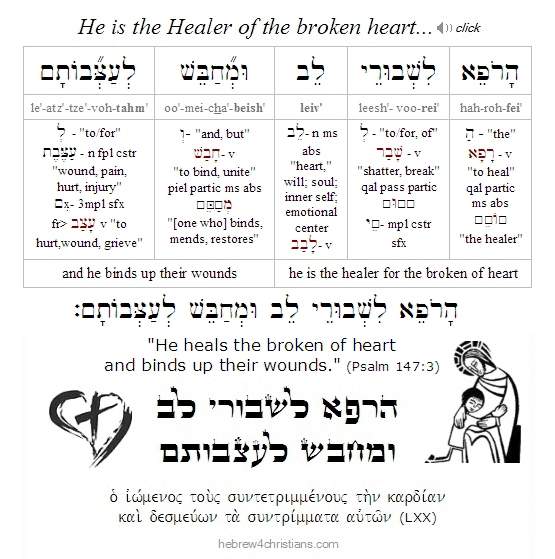 |
|


















































